Previous 2023 New Releases
Committee discusses temporarily removing firearms from individuals in crisis
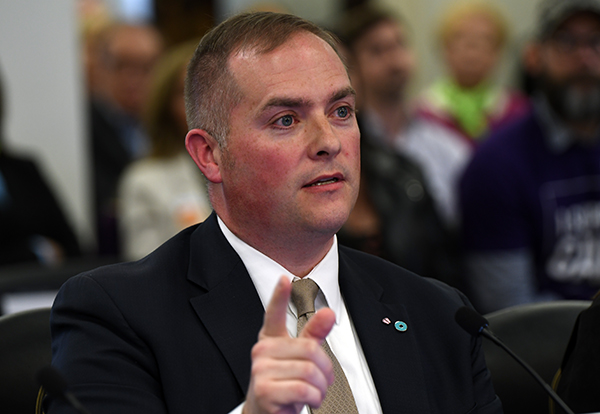
Sen. Whitney Westerfield, R-Fruit Hill, shares his plans to file legislation in 2024 to temporarily remove firearms from individuals in crisis during Friday’s Interim Joint Committee on Judiciary meeting A high-res photo can be found here.
FRANKFORT — Legislation to temporarily remove firearms from individuals experiencing a mental health crisis may be filed during the 2024 legislative session.
Sen. Whitney Westerfield, R-Fruit Hill, said he’s been working on the bill for “a while.” It would focus on crisis aversion and rights retention, or CARR, for those individuals, he said.
Westerfield presented his ideas alongside other supporters to the Interim Joint Committee on Judiciary on Friday. He said he does not have a draft of the legislation complete yet, but he was hoping to create a dialogue with his colleagues on their concerns and ideas for the bill.
“As a Second Amendment supporter, as a gun owner, a former NRA member ¬¬– I wanted to make sure that it was constitutionally sound,” Westerfield said. “I set out to try to do that and come up with a version of this bill that didn’t present some of the same problems that prior attempts at this – not only in Kentucky, but in other states – has done.”
Kentucky already has a statute where individuals in crisis can be held in a temporary, 72-hour psychiatric hold if that person meets certain criteria. During that time, that person does not have access to firearms.
Westerfield’s proposal would aim to create a new type of court order to give law enforcement the power to temporarily remove firearms from other individuals in crisis who are not placed under a psychiatric hold, but still need care. That person would have an opportunity to appeal the decision in a timely manner.
Temporarily removing firearms from individuals in crisis would hopefully prevent more suicides and other acts of violence, such as mass shootings, Westerfield said.
Whitney/Strong executive director and cofounder Whitney Austin shared her mass shooting survival story with the committee. Austin was shot 12 times at Fifth Third Bank headquarters in Cincinnati in 2018. She asked the committee to think about their loved ones and the trauma gun violence causes.
“I am telling you, there is nothing you wouldn’t do to prevent them from experiencing this,” Austin said. “The collective, or our shared humanity, I believe calls on us to prevent this violence.”
During discussion, Rep. Savannah Maddox, R-Dry Ridge, said she knows everyone has a sincere desire to keep Kentuckians safe, but she is opposed to this legislation.
“You’re still talking about a proposal that at a bare minimum has the potential to violate at least three constitutional rights in addition to due process and the presumption of innocence,” she said.
House Majority Whip Jason Nemes, R-Middletown, said he also has constitutional rights concerns.
“Fundamentally this bill takes away a constitutional right from a citizen based on the prediction that they might commit a crime in the future,” he said.
Westerfield responded that the current legal system already has limits to individual rights based on probable cause. In addition, he said his bill would not change anyone’s right to presumption of innocence and would not involve any criminal penalties.
Rep. Pamela Stevenson, D-Louisville, expressed support for Westerfield’s legislation, by stating the general assembly has to “be brave enough not to let people die.”
“I agree with the Second Amendment, but with every right, there’s a responsibility,” she added. “… There are a lot of dead citizens that were law abiding citizens because we’re not taking action.”
Rep. Keturah Herron, D-Louisville, asked Westerfield to explain why CARR isn’t a typical “red-flag” law.
Westerfield said his bill would make the burden of proof higher than other states.
“There’s not just anybody who can just go and ask the judge for this,” he said. “You’ve got to convince a law enforcement officer that this is warranted and then they’ve got to convince a judge.”
The Kentucky General Assembly cannot take action on legislation until the 2024 legislative session begins on Jan. 2.
For more information, visit legislature.ky.gov.
Legislative committee discusses housing issues
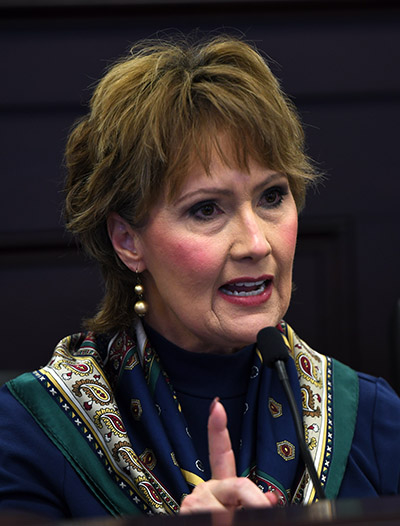
Rep. Kim King, R-Harrodsburg, asks a question about the types of housing included in the presenter’s research during Thursday’s Interim Joint Committee on Economic Development and Workforce Investment meeting. A high-res photo can be found here.
FRANKFORT — Kentuckians have long commutes and struggle to find an affordable place to live, according to data shared with lawmakers Thursday.
Patrick Bowen, president of Bowen National Research, told the Interim Joint Committee on Economic Development and Workforce Investment that housing issues across the commonwealth are a concern for employers as well.
Bowen’s research looked at worker commutes, wages and housing affordability and availability in five Kentucky counties — Daviess, Fayette, Kenton, Rowan and Warren. Each county had a large population of workers who travel at least 50 miles day for work, Bowen said.
Most people have long commutes because they either cannot afford to live where they work, cannot find a place to live where they work, or both, he said.
“When we ask them, ‘Would you live in that area (where they work) if housing was available and affordable?’ 40% say, ‘yes,’” Bowen said.
Looking at the top 30 occupations for each county, the majority of workers in those occupations cannot afford to rent or buy housing in those communities on a single income, according to Bowen’s research.
From the employer side, more than half of 456 employers surveyed nationally over a multi-year period said local housing issues have impacted their business, particularly their ability to attract and retain workers, Bowen said.
“Nearly two-thirds of employers indicate they are more likely to hire workers if housing issues are resolved,” Bowen added.
During discussion, Rep. Kim King, R-Harrodsburg, asked Bowen what the definition of housing is in his research.
“The reason I ask is in our Affordable Housing Caucus, we talk about housing issues, but that means a wide variety of things,” King said. “… Are you including single houses on a single plot of land, duplexes, quads, all the way up to major apartment buildings?”
Bowen said it was the “entire spectrum,” including mobile homes, condominiums, apartments and more.
“The challenges are universal,” Bowen said. “The lack of available housing is really across the whole spectrum of affordability, and it’s both rentals and it’s for sale housing as well.”
Sen. Shelley Funke Frommeyer, R-Alexandria, questioned whether the lack of senior care facilities due to certificate of need requirements is having an impact on the housing market.
“I wonder if there’s a correlation with much of our senior housing population actually staying in their home, but in fact they would be better suited in a transitional care or something that has a lot of levels of care,” she said.
Bowen said senior care housing is a section of the market that not a lot of people think about, but should. While many seniors would like to downsize or transition into a senior care facility, there’s a lack of availability there that results in seniors staying in homes they would prefer to sell, he said.
During the interim, the Kentucky General Assembly cannot take action on legislation. The 2024 legislative session begins Jan. 2
Commission studies possible amendment to state constitution
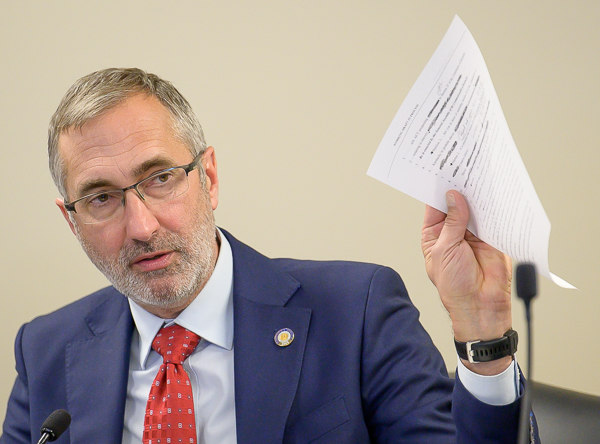
Senate President Pro-Tempore David P. Givens, R-Greensburg, speaks on the importance of keeping proposed constitutional amendment language simple during Monday’s Commission on Race and Access to Opportunity meeting A high-res photo can be found here.
FRANKFORT — Teens and adults spoke to lawmakers on Monday about changing what the state constitution says about slavery.
The Commission on Race and Access to Opportunity discussed a constitutional amendment for Section 25, which currently prohibits slavery and involuntary servitude in Kentucky, except as a punishment for a crime. The proposed amendment would remove the punishment for a crime exception.
Commission co-chair Killian Timoney, R-Nicholasville, said he was inspired to research the issue of Section 25 further after a conversation with a constituent at a basketball game last winter.
David Childs, a history and Black studies professor at Northern Kentucky University, gave a presentation to the commission on the history of Section 25. The language used in Kentucky’s constitution comes from the 13th Amendment of the U.S. Constitution, which also allowed for slavery as a punishment for a crime.
Childs said convict leasing, a form of legal slavery, was widespread in the South during Reconstruction.
“During the Reconstruction period, farmers and businessmen needed to find replacements for the labor force once their slaves had been freed,” Childs said. “Some southern legislatures passed Black Codes to restrict free movement of Black people and force them into employment.”
Childs said the new laws would often lead to Black people being incarcerated for minor offenses.
“States began to lease convict labor to plantations and other facilities,” Childs added.
Senate Democratic Floor Leader Gerald A. Neal, D-Louisville, said he’s filed similar legislation to amend Section 25 in the past.
Timoney asked whether or not removing the “except as a punishment for crime, whereof the party shall have been duly convicted” language would impact work programs for incarcerated individuals.
Senate President Pro-Tempore David P. Givens, R-Greensburg, said Section 253 of the Kentucky Constitution addresses work of penitentiary prisoners and may cover the issue.
Givens, who is also one of the commission’s co-chairs, spoke on the importance of keeping the amendment’s language simple to avoid confusing voters. Any amendments made to the state constitution must be approved through a ballot measure.
“If we don’t make our proposed constitutional amendment change simple, we end up bogging down the electorate in ways we don’t intend to,” Givens said.
Givens suggested the proposed amendment should say something simple like: “Are you in favor of amending Section 25 of the constitution to prohibit slavery in all circumstances?”
To read a working draft of the amendment proposal, click here.
During the interim, the Kentucky General Assembly cannot take action on any legislation. The 2024 legislative session begins Jan. 2.
Lawmakers hear about legislation designed to reduce maternal mortality
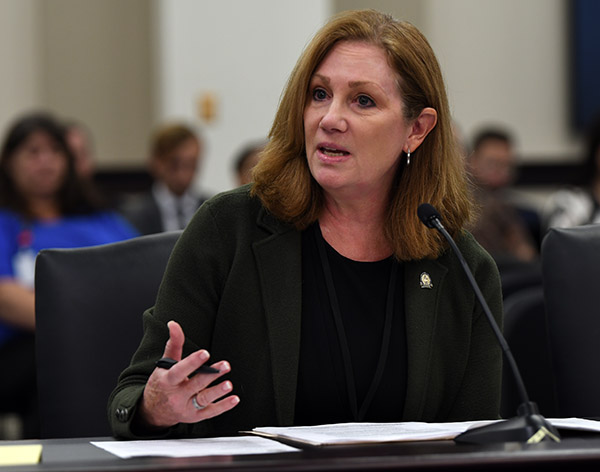
Rep. Kimberly Poore Moser, R-Taylor Mill, testifies on legislation regarding maternal mortality during Monday’s Interim Joint Committee on Health Services meeting. She also serves as the committee’s co-chair. A high-res photo can be found here.
FRANKFORT — Legislators heard from one of their own on Monday about proposals to shore up maternal health in Kentucky – a state described during testimony as having the second highest maternal mortality rate in the United States.
“I am very happy to be with you today to discuss a bill draft that I have worked on throughout the summer with a very nice bipartisan, bicameral, informal workgroup discussing maternal health,” said Rep. Kimberly Poore Moser, R-Taylor Mill, also co-chair of the committee.
Moser said those working on the legislation are targeting ways to improve the state’s situation.
“We’ve really tried to pull all of the stakeholders together to take a deep dive and hard look at what is affecting maternal mortality in Kentucky. We know that new Kentucky mothers die at a higher rate in Kentucky than 48 other states,” she said.
Moser said the legislation will most likely undergo changes before the legislative session that begins on Jan. 2, but it calls for establishment of the Kentucky maternal psychiatry access program, also known as the Kentucky Lifeline for Moms.
A dedicated hotline number would be available for health care practitioners to obtain information about referrals, continuing professional education and other issues regarding mental health services.
“I can say definitively that maternal health, as in saving mothers and babies, is a priority, especially for our caucus, and we want to make sure we are supporting moms and babies. And that’s really what this seeks to do,” she said.
The legislation would also cover a special enrollment period when women find out they’re pregnant, Moser said.
One area of major concern is the high rate of substance use disorder, which is the top cause of death for mothers in the year following a birth, she said.
The legislation also addresses a lack of insurance coverage, access to prenatal care, mental health treatment, education and service referrals, including treatment support and follow-up care, Moser said.
Sen. Whitney Westerfield, R-Fruit Hill, said he’s aware of crisis pregnancy clients who struggle with costs of housing, transportation and other needs. He’s working on legislation with some overlapping issues, and he commended Moser for her “leadership” and legislation to help mothers.
“Kentucky needs to invest in moms and children before they’re born, when they’re in the womb, after they’re born, and as they’re starting to grow in their early childhood development,” he said. “We’ve done some things that are good, but we need to do a whole lot more.”
Rep. Ryan Dotson, R-Winchester, said he’s a father who supports the “momnibus” bill before broaching depression.
“And the question I have, and it’s very personal to me because my eldest daughter gave birth to her second child, and she went into deep postpartum depression. And you referenced the mental health aspect. Does this deal with postpartum depression because I know how bad it got for her,” he said.
Those concerns, Moser said, are integral to the bill. She pointed to components of the legislation that help identify women struggling with postpartum depression and improve their access to psychiatric care.
Sen. Cassie Chambers Armstrong, D-Louisville, said legislators had to ask several questions to understand the directions they need to take to tackle maternal mortality.
“The process started with, ‘What do we know about the data in our communities and our state? What do the experts say are the best solutions for those problems?’ and ‘How can we craft something that makes sense in our current policy landscape?’”
Sen. Stephen Meredith, R-Leitchfield, also committee co-chair, asked Moser about urban vs. rural rates of maternal mortality.
Moser said the Kentucky Perinatal Quality Collaborative and the Maternal Mortality Review Panel have good information about the issue.
“Obviously, only the moms who need this insurance coverage would access it. So we don’t anticipate that this is going to be a large number. So regardless of whether you’re rural or you’re urban, if you need insurance, you should have access to that,” she said.
Sen. Donald Douglas, R-Nicholasville, thanked Moser, and said in Kentucky, 48% of births were covered by Medicaid. In 2022, 45% of the births in the state were covered by Medicaid. He urged the committee to “keep our eyes also on the big picture in the Medicaid area,” adding there is no free money.
“So anyone who wants to argue that we are not putting money into this area needs to go back and look at some of the data. I want to make sure that we’re looking at this in a pragmatic way, an objective way and not just an emotional way,” he said.
Moser said she agrees that more people are accessing Medicaid, but having healthier citizens will benefit the state’s economy and fewer people will access Medicaid.
“We are looking at this issue because this is a crisis, and we need to get our hands around it. But I think you’re right. We need to ultimately look at how to make Kentucky a healthier place, and I think we’re doing that,” she said.
Lawmakers share plan to extend off-highway vehicle pilot program

Sen. Phillip Wheeler, R-Pikeville, speaks to the committee about a pilot program for off-highway vehicle trails in Eastern Kentucky during Wednesday’s Interim Joint Committee on Transportation meeting. A high-res photo can be found here.
FRANKFORT — Two Eastern Kentucky lawmakers are hoping to extend a pilot program that allows off-highway vehicles, or ATVs, to use state highways to get from one portion of a trail to another.
Sen. Phillip Wheeler, R-Pikeville, and Rep. Chris Fugate, R-Chavies, worked on adding the pilot program to an omnibus transportation measure, Senate Bill 215, during the 2021 legislative session.
The program is set to expire on July 1, 2024, Wheeler and Fugate told the Interim Joint Committee on Transportation on Wednesday. Wheeler said they hope to extend the program another 36 months with new legislation in 2024.
“We’re really just now getting to the point to be able to adopt state roads and certain county roads into the ATV trail system,” Wheeler said.
SB 215 in 2021 gave local governments the ability to petition the state for permission to use a state highway to connect one portion of an ATV recreation trail to another.
Jason Siwula, deputy state highway engineer with the Kentucky Transportation Cabinet, said the administrative regulations took some time to promulgate, but they officially went into effect on March 1, 2023. He said no petitions have been submitted yet.
Jerry Adkins, director for the Pike County Hillbilly Trail System, said ATV recreation trail tourism is already off to a great start, and they hope to file a petition soon.
“We will soon be approaching to ask the Transportation Department to consider having the off-highway vehicles on State Route 197, which will allow us to access Elkhorn City, Kentucky, a few miles down Route 197, which is a trail friendly town,” Adkins said.
Adkins said Pike County’s trail system officially opened Sept. 30 and permit sales with 15 local retailers have been going well.
Fugate said the ATV recreation trail system is more than just tourism for Eastern Kentucky.
“We’ve got 18 counties all working together to make this trail system happen, but it’s more of an economic development thing than it is tourism,” he said.
Sen. Jimmy Higdon, R-Lebanon, asked the panel what other states, like Tennessee and West Virginia, are doing to make ATV tourism a success. Higdon said research on other states played a large role in the 2021 legislation.
Fugate said Kentucky has essentially copied what West Virginia has done for the last 15 to 20 years.
Rep. Tom Smith, R-Corbin, said he was contacted by a constituent who was concerned about the lack of a kill-switch on ATVs after a child died when one was left running.
Wheeler said he’s not sure if there’s anything Kentucky can do at a state-level to mandate a kill-switch component on ATVs. Smith suggested the legislature consider passing a resolution asking the federal government to improve the safety of ATVs.
Wheeler agreed safety is a huge concern when it comes to ATV use.
During the interim, the Kentucky General Assembly cannot take any action on legislation. The 2024 legislative session begins Jan. 2.
Legislators receive results of annual ‘school report card’
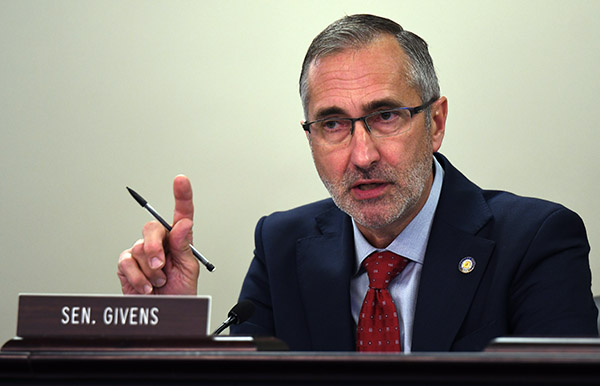
Senate President Pro Tempore David P. Givens, R-Greensburg, speaks on the Kentucky Department of Education’s School Report Card for the 2022-23 academic year. A high-res photo can be found here.
FRANKFORT — The Interim Joint Committee on Education reviewed results Wednesday from the annual ‘school report card,’ a much-anticipated snapshot of public education and student performance in Kentucky schools.
The Kentucky Department of Education (KDE) released the new report – required by state and federal law – on Tuesday night. Overall, it shows that during the 2022-23 academic year, fewer than half of public schools scored at proficient or above in major content areas, including reading, math, science and social studies.
The report also showed that the state’s composite ACT score has climbed since the 2020-21 academic year, but remains below the level measured in 2019-20.
Rhonda Sims, associate commissioner of KDE’s Office of Assessment and Accountability, summed up the year-over-year results, saying that elementary schools have consistently moved forward, middle schools have seen slight improvement in most areas, and high schools have stayed the same or declined.
“We do have improvement efforts that we need to put into place. Some things we are already doing with your assistance,” said Robin Kinney, interim commissioner of KDE.
Kinney said the department is focused on providing high-quality instructional resources, access to highly qualified teachers and administrators, and professional learning and grant opportunities. However, she pointed to teacher shortages, absenteeism and truancy as continued challenges.
“Our goal is to have every student engaged every single day,” Kinney said. “That’s the way that we have the best opportunity to make our test scores go up.”
Senate President Pro Tempore David P. Givens, R-Greensburg, agreed that varying issues may have impacted the scores in the report – such as chronic absenteeism and the lingering effects of COVID-19. But he also warned that the scores overall indicate that Kentucky is failing to provide students with the tools they need to succeed in life.
“Parents play a vital role. We’ve got to have parents getting these kids back in school. But we’ve got to make school relevant for these kids. We’ve got to make it matter. We’ve got to make them want to be there, and we’ve got to make them know that our future depends on them,” he said. “So, for all the celebrations that we’re enjoying in some districts with these results, we have some districts that have failed our kids. And whatever we need to do to help them, we stand ready.”
Another concern was raised by Rep. James Tipton, R-Taylorsville and co-chair of the committee.
“One of the alarming statistics I did see is we’re still seeing significant gaps between white and Black students. Have those numbers increased over last year? I mean we’re talking 30 points or better in these gaps,” he said.
Sims answered they would gather further information.
“There certainly are gaps,” she said. “I’ve not looked at the state data enough to tell you with great certainty if that gap is now increasing statewide, is it increasing in certain areas, but we’ll be happy to pull that information for you.”.
Sen. Stephen West, R-Paris, and a co-chair of the committee, also asked about how to find additional data on achievement gaps, and Sims said the department has a 63-page briefing packet on its website that shows how different demographic groups are performing.
Some lawmakers also said they want to see the report card data sooner next year, including Rep. Timmy Truett, R-McKee, a school principal.
“I love the data. I want to thank you for, in my opinion, probably having the best accountability system that I’ve seen as principal,” he said.
Rep. Felicia Rabourn, R-Pendleton, had a similar request.
“I’m hearing from a lot of the superintendents that I represent in my district saying if they only had that data sooner, they could be better prepared to make sure that each student comes in and they’re able to meet their needs based on the data that they’re receiving,” she said.
Legislators hear about challenges facing small business owners
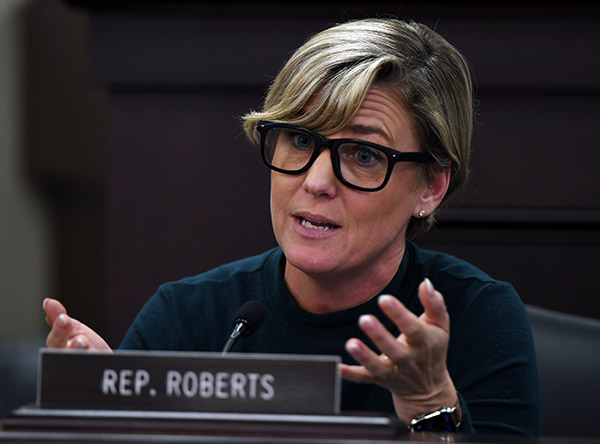
House Minority Whip Rachel Roberts, D-Newport, speaks during Thursday’s Interim Joint Committee on Tourism, Small Business, and Information Technology meeting A high-res photo can be found here.
FRANKFORT — Lawmakers heard from national and state business advocates Thursday about the challenge of workforce shortages and the role of immigration in Kentucky’s economy.
Charles Aull, executive director of the Kentucky Chamber Center for Policy and Research, testified that 80% of Kentucky’s employers say there isn’t an ample supply of workers in their perspective areas, but 79% of them expect to still be in the state 10 years from now.
His comments were part of a presentation to the Interim Joint Committee on Tourism, Small Business, and Information Technology.
In addition to Aull, John Cox, director of public affairs for the Kentucky Chamber of Commerce, and Tom Sullivan, vice president of small business policy for the U.S. Chamber of Commerce, testified about the current business climate.
“We asked them (small business owners) what they thought state policy makers in particular should be most focused on. A pretty resounding response was an emphasis on workforce, and you all have done great work in this area,” Aull said. “I think a good way to interpret this is to understand the need for just continued pressure on the issue of workforce development.”
According to his presentation, 64% of employers reported trouble finding skilled workers, and 36% reported trouble finding non-skilled workers. Around 79% of employers have increased wages to retain employees. At the same time, 51% said state government is doing an excellent or good job creating a strong business climate.
Cox said the legislators’ supportive stances are appreciated.
“We just want to thank you all for your continued work to support small businesses across the state by backing important measures to support workforce development, reduce or streamline government regulations and improve our tax code. You’re actively making Kentucky a better place and a more competitive environment for small businesses,” he said.
Senate Minority Caucus Chair Reginald Thomas, D-Lexington, said access to capital for small businesses is vital, and he asked about ways to get important information out to the public.
Sullivan said peer-to-peer learning through business associations is a good way to get the word out, but chambers of commerce use any way possible to disseminate information about available loans and challenges to obtaining them, ways to deal with inflation, and a plethora of other topics.
House Minority Whip Rachel Roberts, D-Newport, expressed concern about the cost of joining some chambers of commerce and closures of small businesses.
“So I own a small business, and one of my biggest challenges…is that so many small businesses can’t actually access their chambers because the price point for a small business to enter the chamber can be really cumbersome. In my region, it’s almost $400 for any business to join the chamber, even if that’s a sole proprietor business,” she said.
Sen. Phillip Wheeler, R-Pikeville, asked about the outsourcing of jobs, border security, immigration and patriotism.
Sullivan said his organization is doubling down on the need for additional “legal workers” in the United States, combined with additional border protections that allow for the economy to grow responsibly.
“We are now actually committed to not only have immigration reform that brings in workers that will help our economy grow, we also are committed to making sure that we have border security. We believe that those things go hand in hand. They are not separate and distinct issues and priorities that have to work against each other,” he said.
Rep. Phillip Pratt, R-Georgetown, co-chair of the committee and president and owner of a lawn and landscaping business in Georgetown, asked Sullivan to comment on the H-2B program for guest workers.
“This program is a political football in D.C. They cap it, they uncap it, then they uncap it again,” Pratt said. “What can we do to straighten this program out? These are the guys that actually pay all the taxes, and if they have committed a crime in Mexico or in the United States – a misdemeanor – they cannot come across the border.”
Sullivan said this is a perfect example of the need for certainty for small businesses to flourish. He pointed out the program operates through a lottery system, and chambers of commerce need to work with federal partners to improve the situation.
“It does not add to certainty when a small business owner has to gamble on whether or not they’re going to have enough workers to meet what they would like to see as demand for increased revenues and growth in their business and growth in their community,” he said.
Legislators hear from, question health care loan relief program representatives
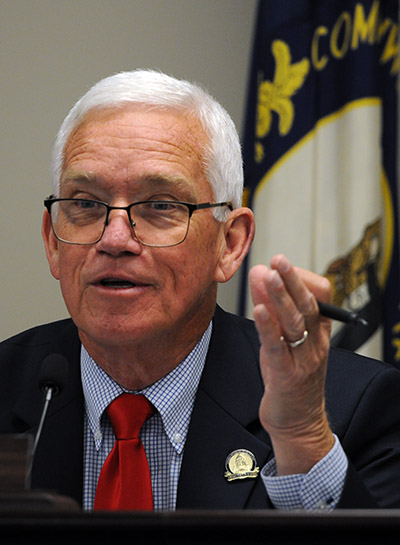
Sen. Stephen Meredith, R-Leitchfield, speaks during Wednesday’s meeting of the Interim Joint Committee on Health Services. A high-res photo can be found here.
FRANKFORT — Lawmakers heard Wednesday from groups in Kentucky that are working to recruit and retain badly needed physicians and other medical professionals using specialized loan relief opportunities.
Matt Coleman, director of the Kentucky Office of Rural Health, and Frances Feltner, director of the University of Kentucky Center of Excellence in Rural Health, both testified before the Interim Joint Committee on Health Services. Coleman called attention to two repayment efforts in particular.
The Healthcare Worker Loan Relief Program of the Commonwealth, is administered by the UK Center of Excellence in Rural Health using state funds. It was established through House Bill 573 in 2022.
That effort works in alignment with the Kentucky State Loan Repayment Program, which has been handled by the Kentucky Office of Rural Health for the last 20 years and utilizes federal funds and dollars from public organizations and nonprofits.
“We will designate funds to those providers, but also there’s a match by the organization that is employing the provider in order to keep recruitment and retention in those areas,” Coleman said.
According to testimony, the KSLRP provides up to $40,000 in loan repayment assistance each year, for a total of two years. Borrowers must commit to two years of full-time service.
The pair also presented some statistics on health care workers in Kentucky.
The highest number of physicians are located in urban Kentucky, followed by rural areas and Appalachian and Delta regions. Eight counties do not have a practicing physician. And between 2020 and 2022, Kentucky lost 258 physicians and only gained 30 back, Feltner said.
Feltner said five counties in Kentucky have no practicing dentists, and making the loan application process easier is a priority.
Rep. Kimberly Poore Moser, R-Taylor Mill, also committee co-chair, said she has concerns about the primary care physicians Kentucky is losing in underserved areas each year.
“In 2020, we lost 38 primary care physicians, and in 2022, we lost eight. Does that indicate a slowing of the loss? Are we making a difference in identifying those underserved areas and plugging those in with physicians,” she asked.
Feltner said the numbers hopefully show improved retention. “If we can use this program to keep people in place, that’s what’s so important.”
Sen. Stephen Meredith, R-Leitchfield, also committee co-chair, asked why there is such a disparity between rural and urban areas concerning primary care physicians.
“I think a lot of that has to do with pay. You know you come to a rural area and the pay is not the same for a physician,” Feltner said, also citing the possible lack of amenities – such as housing, day care, schools, and other things in rural areas.
Rep. Rachel Roarx, D-Louisville, asked what outreach would help attract more interest in the programs.
“It’s a teamwork kind of deal. Part of that is driving those direct contacts, especially in those areas that we have zero, anything, talking to the counties around them even to see where we can expand this and expand the work for this program,” Coleman said.
Feltner said reaching out to high school students could be beneficial.
Sen. Donald Douglas, R-Nicholasville, a physician himself, said doctors should be asked why they are leaving Kentucky to practice elsewhere.
Rep. Jacob Justice, R-Elkhorn City, a dentist, said serving patients using Medicaid might mean a 5% profit margin.
“If you do a thousand dollars’ worth of work on your patients, you make 50 bucks. So if you have a post-operative complication or even if it just takes a longer procedure than it should have, you end up paying money to see these patients,” he said. “And just from a business standpoint, no matter how passionate you are about your community, you just can’t do that. You can’t survive.”
Legislators learn about veterinarian shortages, mitigation efforts
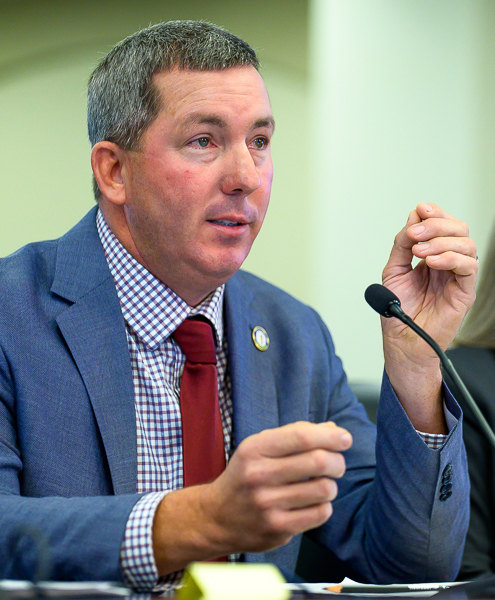
Rep. Matthew Koch, R-Paris, speaks during Thursday’s meeting of the Interim Joint Committee on Agriculture. A high-res photo can be found here.
FRANKFORT — Whether you’re a cat parent, race horses or raise cattle for food, you’re bound to need a veterinarian.
On Thursday, legislators on the Interim Joint Committee on Agriculture heard testimony about a shortage of veterinarians in Kentucky and ways to mitigate the problem.
Representatives from the Kentucky Department of Agriculture, longtime collaborators at the Auburn University College of Veterinary Medicine, and those interested in establishing a veterinary medicine school in Kentucky all spoke to the committee.
Keith L. Rogers, chief of staff for the KDA, said addressing the shortage of veterinarians in the state has been a priority. The department launched stakeholder meetings in 2022 concerning large animal vets. This led to working group that was appointed this year, he said.
The 22 members come from a wide range of agriculture, veterinary industries, and higher education disciplines. They are focused on developing a stronger pipeline for Kentucky’s students to pursue careers as veterinarians.
Efforts include working with students who participate in FFA and 4-H and collaborating with high school counselors to find ways to prepare them for veterinary medicine school, he said.
Rep. Matthew Koch, R-Paris, said there’s no doubt more veterinarians are needed in rural Kentucky, but students often graduate from veterinary school saddled with debt. That makes it difficult to practice in rural communities, he said.
Rep. Chad Aull, D-Lexington, asked Rogers about other ways to attract and retain veterinarians.
“When you’re talking to other states – I’m assuming that other states are having the same problems – are they having any kind of out-of-the box unique ideas when it comes to retention and recruiting in this space that maybe are not just economically focused, like maybe forgiveness of debt and tuition and loans,” he said.
For 72 years, Kentucky and Auburn University in Alabama have had a regional contract for veterinary education. Through the arrangement, qualified students can pursue specific health degrees at out-of-state institutions and pay in-state tuition. Private schools offer reduced tuition.
Dr. Calvin M. Johnson and Dr. Melinda S. Camus, both of the Auburn University College of Veterinary Medicine, testified at length about how the arrangement works.
Johnson said Kentucky will pay the regional board $5.24 million this fiscal year for 152 seats at Auburn.
Rep. Shawn McPherson, R-Scottsville, said he has spoken with veterinarians who said they wish they had more training on how to run a business.
Camus replied that the students learn about inventory management, salaries, hiring and other business-related topics. Some students elect to pursue a Master of Business Administration degree during the summers while enrolled at Auburn.
Dr. Brian Parr, dean of the Hutson School of Agriculture at Murry State University, said the school is well positioned to boost the number of veterinarians in Kentucky.
“(It’s) not the first time that this has been looked at. This was looked at at least one time 50 years ago and about three times in between that,” he said.
Parr said the shortage in veterinarians is compounded by some younger veterinarians who don’t want to work 40-hours a week, according to a national statistic.
Rep. Kim King, R-Harrodsburg, said she was haunted by some of the veterinarians who aim to work less than 40 hours a week.
“I can’t even fathom how they expect to have a business model and have their own practice. I can assure them that they will put in three times that amount of work and hours every week,” she said.
Parr described it as a “delicate issue,” and said the whole profile of what new veterinarians look like has changed tremendously over the last 20 years – with the average pre-veterinarian student at Murray State being a female from a suburban or urban environment.
He also said the corporatization of veterinary offices across the United States causes challenges.
“But often times in those contracts, it cuts out any large animal practice. And there’s two main factors that cause that. No. 1, the money is not there to go pregnancy check dairy cows as opposed to giving cancer treatments to Chihuahuas. It doesn’t compare,” he said.
Task force continues to study certificate of need law in Kentucky
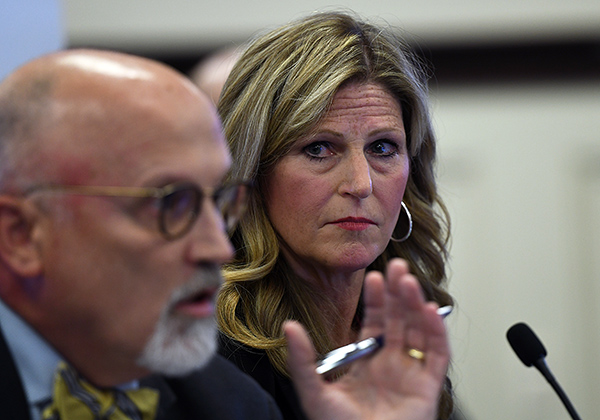
Rep. Marianne Proctor, R-Union, listens to Northern Kentucky doctor Mark Schroer speak on the impact of the certificate of need law on his patients during Thursday’s Certificate of Need Task Force meeting. A high-res photo can be found here.
FRANKFORT — The Certificate of Need Task Force heard from health care workers Thursday on the impact of the state’s certificate of need law on patient care.
The task force is a special committee charged with reviewing Kentucky’s CON program, including the state health plan and related statutes.
Rep. Marianne Proctor, R-Union, testified alongside Northern Kentucky doctor Mark Schroer and registered nurse Carol Dwyer.
Proctor told the task force her constituents would like to see the CON law repealed in Kentucky. She said research shows CON is not meeting its intended goals of accessibility, affordability and quality.
“The Federal Trade Commission and the Department of Justice have both submitted testimony in support of certificate of need repeal across both Republican and Democrat administrations,” Proctor said. “This is not a red or blue issue. This is a health care issue.”
Proctor said the state’s CON law might be hurting rural hospitals by limiting beds. Additionally, she said the research shows CON contributes to monopolies in health care, one of the driving factors of high health care costs.
“We’re seeing over and over certificate of need is protecting our hospitals, but is it protecting our patients? Is it giving them choices? Is it controlling costs? And the data is saying no,” Proctor said.
Schroer described how CON is negatively impacting his patients’ access to care. Due to CON, some patients have to travel to other facilities for certain tests or treatments that are not offered close to home. This often causes a financial burden.
“What does (the certificate of need law) say? It’s going to improve quality, increase access and regulate health system expenditures,” he said. “Now anyone who thinks that we have achieved that simply is not involved in patient care.”
Sen. Stephen Meredith, R-Leitchfield, said the biggest issue is urban vs. rural.
“People have to understand that urban and rural truly are two different worlds,” Meredith said. “With 40 years of health care experience, I will tell you that repeal of certificate of need will hurt rural hospitals because it does give us a monopoly. To a lot of people that’s a nasty word, but to me it’s not. It protects a market share.”
Sen. John Schickel, R-Union, said the CON discussion is important to his constituents, and he thanked Proctor for her work on the issue.
“I can tell you that in Northern Kentucky this issue has probably replaced the Brent Spence Bridge as the biggest issue we have, Schickel said. “I hear about it every day from constituents, especially senior citizens.”
During the interim, the Kentucky General Assembly cannot take any action on legislation. The 2024 legislative session begins Jan. 2.
The next Certificate of Need Task Force meeting is currently scheduled for Nov. 20 at 10:30 a.m. For more information, visit legislature.ky.gov.
Legislators learn about virtual academies during committee meeting
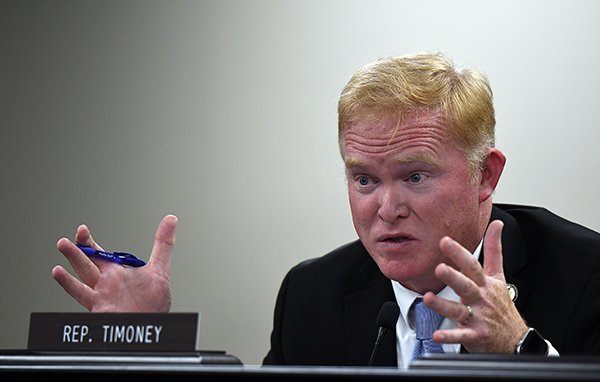
A photo from Tuesday’s Interim Joint Committee on Education meeting may be found here. It shows Rep. Killian Timoney, R-Nicholasville, discussing virtual academies.
FRANKFORT — Legislators on the Interim Joint Committee on Education learned about virtual academies during Tuesday’s meeting at the Capitol Annex.
Representatives from the Kentucky Department of Education (KDE) and the Kentucky Virtual Academy of the Cloverport Independent School District were on hand to explain how the academy operates and answer questions from legislators.
Sallie Johnson, principal of the academy, said a school with virtual instruction fills a need some students and parents seek. Cloverport is the second largest town in Breckenridge County.
“This is my third year participating in a virtual school, and I love that we have options for students,” she said. “I was a past special education teacher, and what I found is a comprehensive, in-person school is not always the right fit for our children. And it is just exciting that there is this new innovative process for school students to access school through virtual learning.”
Rep. Killian Timoney, R-Nicholasville, said there is no statewide virtual academy now, but they would be well received.
Marty Park, chief digital officer for the Office of Education Technology, said Timoney is correct about the statewide virtual academy, though virtual learning has been offered in schools for several years.
“Virtual options became necessary and expanded through the pandemic. A lot of times our programs in our school districts were designed around an emergency strategy of online virtual learning,” he said. “What we’re talking about today is very much not emergency based design. It’s very much around intentional design for high quality teaching and learning.”
Rep. James Tipton, R-Taylorsville, and co-chair of the committee, asked the KDE about the number of districts that design their own program in-house vs. districts that hire a third party contractor.
Park said officials are working through the data this year, and that it’s important to track those numbers as the program matures.
“Most of our school districts across the state of Kentucky, whether it’s in-person learning or online and virtual learning, engage in partnerships with external parties,” he said. “I think what you’re referring to is, what we would call nationally, a managed school approach. Currently today, we only have one school district who’s engaged in the managed school approach.”
Rep. Tina Bojanowski, D-Louisville, said Kentucky doesn’t have a state virtual sponsored program, but with House Bill 563, effectively any virtual school could become statewide. She asked how that impacts Support Education Excellence in Kentucky (SEEK) money. SEEK funds are formula-driven allocations of state funds for local school districts.
Matt Ross, executive adviser for the Office of Finance and Operations, said students become pupils of the district where they’re located. For instance, if a student moved to the Cloverport district, that district would receive the SEEK funds for that student during the next funding cycle.
Sen. Stephen West, R-Paris, asked what percentage of students are learning virtually. West is also co-chair of the committee.
“From fulltime enrollment status, at end of last school year, it was about 1.8%,” Park said. Projections indicate it could be up to 3% in the next five years, he added.
Rep. Emily Callaway, R-Louisville, said she supports virtual academy learning, but also has concerns.
“I do want to emphasize a lot of what my colleagues have said. I think this is a great opportunity,” she said. “It does put back into the hands of parents some different learning environments for their kids. And so I think this is absolutely wonderful, and I appreciate the details. I do also share concerns about safety of the kids and the extracurricular activities.”
The next committee meeting is scheduled Nov. 1 at 11 a.m.
Legislative committee discusses vaping issue, potential solutions
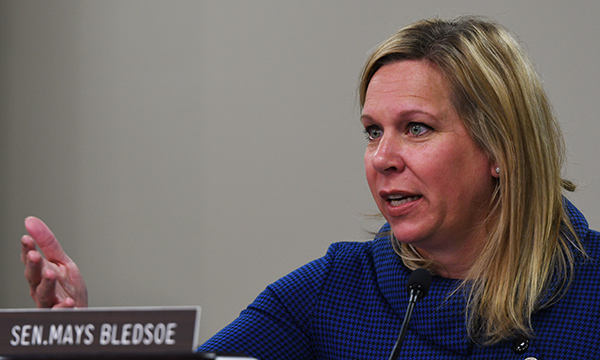
Sen. Amanda Mays Bledsoe, R-Lexington, speaks on the severity of vaping among Kentucky youth during Monday’s Interim Joint Committee on Licensing, Occupations and Administrative Regulations meeting. A high-res photo can be found here.
FRANKFORT — State and federal law prohibits tobacco sales to people under the age of 21, but student advocates say this isn’t enough.
Two student advocates and an internal medicine doctor testified on the issue before the Interim Joint Committee on Licensing, Occupations and Administrative Regulations on Monday. Information provided to lawmakers claims 23.6% of Kentucky kids reported buying nicotine products directly from stores.
Sydney Shaffer is an American Lung Association student advocate from Scott County. She and her co-presenters asked the committee to consider legislation to provide stricter enforcement of Kentucky’s tobacco laws pertaining to underage sales.
“We are here to ask you just for enforcement of the law that already exists to keep these kinds of products out of kids’ hands and have thorough, regular store checks and penalties for illegal sales practices, just like we have for alcohol,” Shaffer said.
She said vaping and e-cigarette marketing continues to target children.
“They are enticed with cool looking devices, cool sounding flavors and clever marketing – that is the bottom line – and they’re being fed high levels of nicotine,” Shaffer said, adding children and teens are getting addicted to these products quickly.
Griffin Nemeth told the committee Kentucky youth e-cigarette usage is getting higher. He is the youth advisory board coordinator for #iCANendthetrend at the University of Kentucky.
“This past year, the youth e-cigarette usage rate among Kentucky high schoolers has surpassed that of the national rate of adult cigarette usage,” Nemeth said.
Rep. Killian Timoney, R-Nicholasville, who is an educator, said vaping is “wildly out of control.” He asked what research says about parents’ knowledge of vaping.
Nemeth said many parents understand and are concerned when their child starts using e-cigarette products, but they struggle to help their children.
Sen. Amanda Mays Bledsoe, R-Lexington, said she’s seen the severity of the vaping issue firsthand as a mother. As co-chair of the Tobacco Settlement Agreement Fund Oversight Committee, Mays Bledsoe said there’s data showing peer-to-peer enforcement has been effective and asked if the advocates would like to see an expansion of those programs.
Expansion of anti-vaping advocates in schools is difficult, Nemeth said, but they would still like to see more advocates.
“We understand that there are advocates in the schools, like Sydney, but it’s hard to find adults who are willing to stand up to this issue or feel like they’ve seen it among youth or feel that youth are the problem,” Nemeth said. “We understand that youth are not the problem. It is the marketing they’ve been subjected to.”
In closing, committee co-chair Sen. John Schickel, R-Union, said he does believe that youth do have a choice when it comes to vaping.
“We need to realize that we all have a choice, kids and adults both, to choose what we want to participate in, and we have to take responsibility for those choices, not put them on other people to take responsibility for ourselves,” Schickel said.
During the interim, the Kentucky General Assembly cannot take any action on legislation. The 2024 legislative session begins Jan. 2.
The next Interim Joint Committee on Licensing, Occupations and Administrative Regulations meeting is currently scheduled for Nov. 9 at 11 a.m. For more information, visit legislature.ky.gov.
Lawmakers receive update on mental health initiative for farmers, families
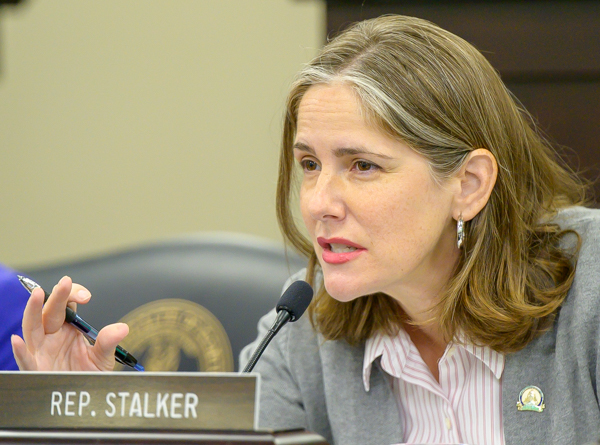
Rep. Sarah Stalker, D-Louisville, speaks during Thursday’s Interim Joint Committee on Agriculture meeting.
FRANKFORT — Farmers can face many challenges that affect their mental wellbeing – land development pressure, workforce shortages, weather disasters and many more.
On Thursday, lawmakers on the Interim Joint Committee on Agriculture heard testimony that mental health advocates are reaching out to farmers who struggle with mental health through the Raising Hope initiative.
Dave Morris, deputy director of the Office of Agricultural Marketing at the Kentucky Department of Agriculture, said the holistic health of the state’s farmers and their families is paramount.
“Many of you have observed the development of this coalition, which was initiated in 2020. We came together with a common mission among agriculturally interested academic and governmental and mental health institutions in establishing Raising Hope, our brand name, in 2021,” he said. “Our goal is to promote the health and safety of Kentucky farmers who are at elevated risk for suicide and accidents.”
Several committee members offered comments regarding mental health, and asked initiative advocates questions.
Rep. Sarah Stalker, D-Louisville, acknowledged that mental health is a crisis in the farming community.
“What I think is important is for us to ask ourselves the question ‘Are we identifying what the root causes are that are leading our farmers to have mental health crises that are leading to sometimes suicide?’” she said.
Morris named many causes of stress the state’s farmers experience.
“(There are) too many unknowns. The weather, the markets, just conditions, profitability, input costs, all the above,” he said.
Stalker asked what legislators can do to better support farmers.
“One of the biggest things that we’re focusing on is to reduce the stigma of talking about the stressors and just making them feel appreciated. Let them get it off their chest, talk about it,” Morris said.
Dale Dobson, safety administrator of KDA’s Education and Outreach Division, said it’s vital that farmers know they are cared for and there is someone they can speak with one-on-one.
“We are opening the door for them to have the chance to let something out. They don’t have to come to us. We go visit them. And it’s unreal where the stories go,” he said.
Meeting farmers where they are is at the heart of Raising Hope, Dobson said.
“We’re seeing people start to have communications. When you shake a hand, and it ain’t just shaking hands, it’s talking to somebody that knows you appreciate them and you sit there and you get starting talking and over the past few years we have got people we call, we talk, we share the good days and bad days,” he said.
Sen. Robin L. Webb, D-Grayson, said those efforts are going to help Kentucky’s youth.
“As you can see yesterday by the way they communicate, by the way they present themselves, and I’d like to see it certainly expanded throughout Kentucky in a big way. I think that’s the best thing we can do to help,” she said, referring to Farmers’ Appreciation and Awards Day, which was held Wednesday at the State Capitol.
Rep. Brandon Reed, R-Hodgenville, also thanked the advocates.
“When my constituent Dale Dobson came with me with his vision back in 2019, we established Farmer Suicide Prevention Day on the Wednesday of Farmer Ag Safety Week, and in 2020, 2021, 2022, we’ve seen significant investments by the General Assembly. So if you’re in this room and you voted on the 2021 and 2022 budgets, thank you so much. You’ve seen the fruit of this labor,” he said.
Sen. Jason Howell, R-Murray, who serves as co-chair of the committee, said he comes from a farm family, and he’s grateful the initiative exists today.
“I was just sitting smiling to myself as you all were talking about this. You couldn’t have put a gun to my grandfather’s head or any of his friends and gotten them to talk about anything that was going inside their mind. But they had great therapy sessions at John Brown Service Station when it was just them, and they would sit and work through a lot of these issues.”
Lawmakers receive inaugural statewide domestic violence report
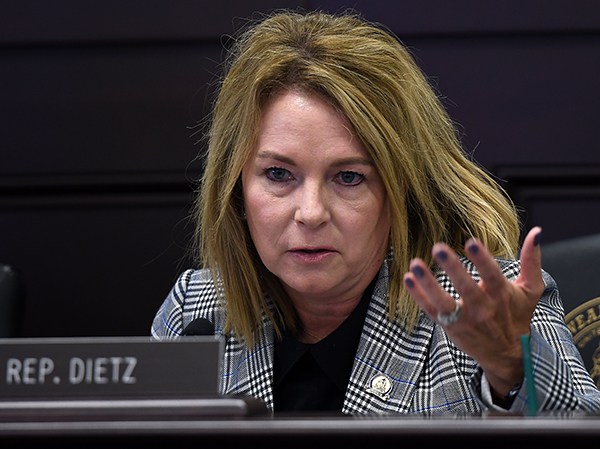
Rep. Stephanie Dietz, R-Edgewood, asks a question about education for family court judges on domestic violence during Thursday’s Interim Joint Committee on Judiciary meeting.
FRANKFORT — Last year, the Kentucky General Assembly passed legislation to collect statewide data on domestic violence.
The Criminal Justice Statistical Analysis Center’s (CJSAC) inaugural report was released a few months ago. On Thursday, the Interim Joint Committee on Judiciary discussed the report for the first time.
The CJSAC Domestic Violence Report is the product of Senate Bill 271 from the 2022 Regular Session. Sen. Whitney Westerfield, R-Fruit Hill, sponsored the legislation.
SB 271 requires the CJSAC to collect information on domestic violence fatalities, domestic violence and abuse, and dating violence and abuse from Kentucky State Police, the Administrative Office of the Courts, the Law Information Network of Kentucky, the Cabinet for Health and Family Services, the Kentucky State Medical Examiner’s Office and county coroner’s offices.
In return, the CJSAC is required to produce an annual report by July 1 to the legislature, the governor’s office, the health cabinet, and ZeroV, which was formerly known as the Kentucky Coalition Against Domestic Violence.
Representatives from ZeroV and The Ion Center for Violence Prevention testified before lawmakers on Thursday on the report’s findings and what can be done to prevent domestic violence and better help victims.
Meg Savage, chief legal officer of ZeroV, said the report shows a serious domestic violence issue in Kentucky.
“What does this report tell us about the state of domestic violence in Kentucky? There’s too much of it. It affects children … We need to somehow determine why domestic violence remains so underreported,” she said.
Kentucky State Police data shows more than 38,000 forms related to suspected domestic violence were filed in the 2022-23 fiscal year.
KSP data also shows there were up to 27 homicides, 880 cases of strangulation, 18 cases of stalking and more than 16,000 emergency protective orders served in Kentucky last year. AOC data showed more than 27,000 emergency and interpersonal protective orders were filed across the state.
“This report doesn’t give us context or causation, and keep in mind, this is only the first year of baseline data,” Savage said.
Christy Burch, CEO of The Ion Center, asked lawmakers to consider more funding for anti-domestic violence programs who are struggling to help clients due to staffing issues. Victims could also use more support when it comes to accessing affordable housing, reliable transportation, childcare, employment and mental and substance abuse services.
Rep. Lindsey Burke, D-Lexington, is an attorney with a background in social work. She said she has talked to 18 stalking victims so far this year, so she’s concerned about KSP’s low number and worries about stalking being an underreported crime.
“I’m sure I didn’t talk to everyone in the state,” Burke said. “So what do you think we can do to get better numbers? Should we make proposals to KSP about how they can track the numbers?”
Savage said there are a lot of reasons why domestic violence as a whole is underreported, but stalking cases are difficult to bring to court and get a conviction. There’s a huge education component at play.
House Majority Whip Jason Nemes, R-Louisville, asked if Kentucky has harsh enough penalties for domestic violence perpetrators.
Savage said a perpetrator who is charged with assault related to domestic violence three times within five years is supposed to be charged with a felony, but the law is underutilized. She also mentioned that violation of a protection order is always charged as a misdemeanor on every offense.
“I think we need more enforcement,” Nemes said. “We certainly need more education, but for the repeat offender, the best education are metal bars.”
Rep. Stephanie Dietz, R-Edgewood, who is a family law attorney, asked what can be done to educate family court judges about how intimate partner violence doesn’t always start out with physical or sexual violence, but with coercive control and isolation.
“They don’t see it,” she said. “So what are we doing to help our family court judges identify (domestic violence) on the front end?”
Burch said the Ion Center would welcome the opportunity for more education.
“I think this is a perfect way that we can utilize our local programs,” she said.
The next Interim Joint Committee on Judiciary meeting is currently scheduled for Oct. 13 at 2 p.m. For more information, visit legislature.ky.gov.
Interim committee examines potential tax exemption for diapers
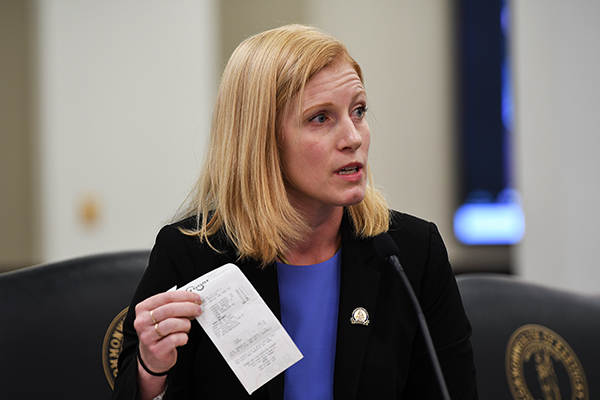
Sen. Cassie Chambers Armstrong, D-Louisville, holds up a receipt that demonstrates how much diapers cost in Kentucky during Wednesday’s Interim Joint Committee on Appropriations and Revenue Committee meeting
FRANKFORT — Diapers are in high demand across Kentucky, and some families struggle to pay the cost.
Sen. Cassie Chambers Armstrong, D-Louisville, shared her plan with the Interim Joint Committee on Appropriations and Revenue to file a bill next year that would make infant and adult diapers in Kentucky tax-exempt.
“It has a simple purpose: Make diapers more affordable for families in Kentucky,” she said at Wednesday’s meeting.
In Kentucky, families can spend up to $2,000 a year on diapers, Chambers Armstrong said. A current draft of her proposed legislation would make diapers exempt from the state’s sales and use tax beginning Aug. 1, 2024. A fiscal impact statement estimates the bill would decrease the general fund by $6.1 million.
Families struggling to afford diapers sometimes have to visit diaper banks or find ways to make their current supply last for as long as it can, Chambers Armstrong said. Nationwide, 1 in 2 families struggle to afford diapers.
“Some families resort to washing and reusing disposable diapers, turning them inside out or leaving their child in the same diaper all day hoping that child won’t develop a severe enough diaper rash that they will need to go to the hospital,” she said.
Currently, 18 other states and Washington D.C. have made diapers sales tax-exempt.
“The results are remarkable,” Chambers Armstrong said. “We see families in low-income neighborhoods buy 6% more diapers, and we see the purchase of children’s pain medications in those same neighborhoods decrease by 6.2%.
Babies are healthier, they aren’t getting severe diaper rash, and families are better able to meet their needs.”
This bill would also help adults and caregivers of adults with disabilities and other health-issues that require the use of an adult diaper.
Sen. Donald Douglas, R-Nicholasville, asked if Chambers Armstrong’s bill would include or exclude families already receiving public assistance.
Chambers Armstrong said the bill would include everyone in Kentucky.
“One of the things about diaper need is that there are no public assistance programs that cover it,” she said. “So a family that can’t afford diapers can’t go to Medicaid or WIC for that need.”
Rep. Ken Fleming, R-Louisville, asked if the $6.1 million general fund impact would be higher.
Chambers Armstrong reasoned that it wouldn’t be because families will take their savings on diapers and spend it on other things the child needs.
“We know that families, whenever they are undergoing the financial strain of having a new child, every dollar you put into their pocket they reinvest into buying things for that child,” she said.
During the interim, the Kentucky General Assembly cannot take any action on legislation. The 2024 legislative session begins Jan. 2.
The next Interim Joint Committee on Appropriations and Revenue meeting is currently scheduled for Oct. 18 at 1 p.m. For more information, visit legislature.ky.gov.
A draft of Chambers Armstrong’s bill is available here
Advocates urge lawmakers to continue advancing computer science in schools
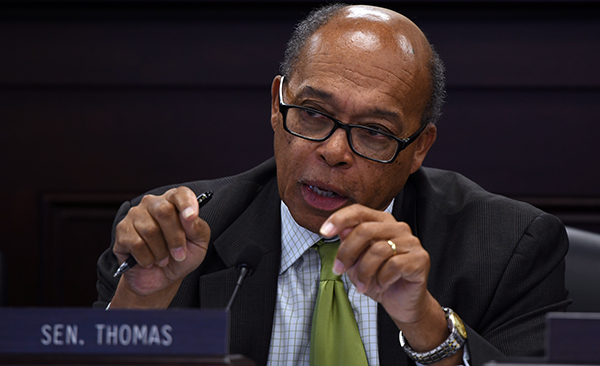
Senate Minority Caucus Chair Reginald Thomas, D-Lexington, speaks during Tuesday’s Interim Joint Committee on Education meeting. Thomas said students should be exposed to computer science long before they reach high school
FRANKFORT — The Interim Joint Committee on Education on Tuesday heard from computer science advocates about ways this multi-faceted discipline could be expanded in Kentucky’s schools.
The meeting coincided with Coding at the Capitol, a full-day event in which students shared robots, displays and experiments with state legislators.
“Why is computer science needed in the state of Kentucky? To further attract employers and large scale economic development projects, Kentucky would need to produce a workforce pipeline that keeps up with the workforce demand,” said Codeye J. Woody, director of State Government Affairs for nonprofit Code.org.
The state has 3,432 open computing jobs with an average salary of $74,833 per year, he said.
“And when we think about computer science, I kind of want to let you know we’re not just preparing students just for a tech job or just going to a tech company,” he said.
Rep. James Tipton, R-Taylorsville, said he thinks he knows why there’s a shortage of computer science teachers.
“I’m really interested in the teacher preparation aspect of this, because I suspect one of the reasons why we have schools who do not offer the courses is the availability of teachers qualified to offer that,” he said.
Tipton, who co-chairs the education committee, asked those who testified about the implications of artificial intelligence and where they see it going.
Cameron Wilson, president of Code.org, said artificial intelligence could be helpful to train people and offer new tools to generate code, among other things. He said there are still many unknowns regarding industries.
The Kentucky Department of Education (KDE) developed a computer science state plan for K-12 in 2022 as required by Senate Bill 193 in 2020, Woody said.
Kentucky also adopted computer science standards in 2019 for K-12 students. Funding for Senate Bill 193 in 2022 included $800,000 for the state’s Computer Science/IT Academy for computer science learning, Woody said.
“What we would need to do is require all high schools to offer computer science as part of their K-12 curriculum,” he said.
Another speaker, Monique M. Rice, computer science initiatives director for AdvanceKentucky, said pathways for those who study computer science should be modernized in an age of artificial intelligence and cybersecurity.
Rep. Jennifer Decker, R-Waddy, asked about how educators could also teach computer science classes.
Rice said AdvanceKentucky already has a program for that subject, and teachers would basically just have to sign up to get started.
“The program runs all year. It consists of a five-day summer institute with support throughout the school year for those teaching the courses. And the two courses that we’re supporting are computer science principles and AP Computer Science A, which is programming in Java,” she said.
Rep. Bobby McCool, R-Van Lear, said he supports computer science education, but KDE might be best suited to actually oversee it. He cited flexibility to address this rapidly changing field.
Senate Minority Caucus Chair Reginald Thomas, D-Lexington, said computer science education should be available for K-8 students.
“My focus is on exposure. And I’m in firm agreement that computer science should be offered in our high schools. This is 2023 now, and learning has changed since I was in high school,” he said.
Sen. Gex Williams, R-Verona, said he has a friend with a bachelor’s degree in math and a master’s degree in computer science who also ran a computer company and developed software he marketed all over the world. However, that friend couldn’t get a teaching certificate.
Williams asked how long it might take him today to be able to teach high school computer science.
“We have occupation based certification tracks now that – as long as he does some sort of mentorship program and monitoring with a mentor teacher – he can qualify to teach in a Kentucky high school in the industry area he had,” said Sean Jackson, K-12 computer science lead for KDE.
Birthing centers discussed at Certificate of Need Task Force meeting
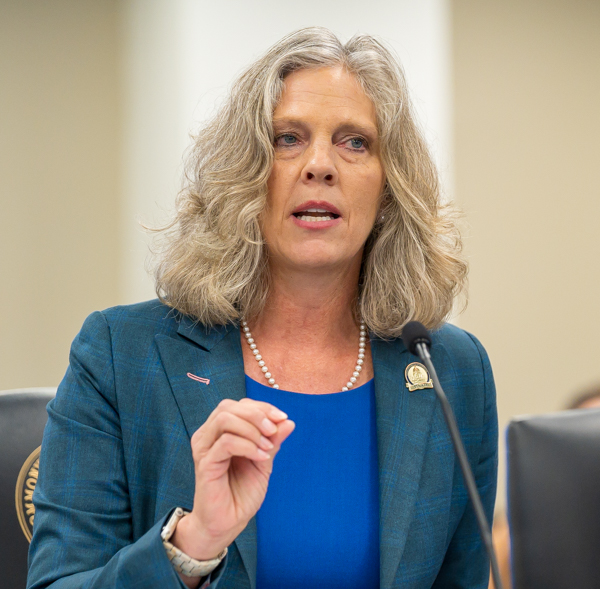
Sen. Shelley Funke Frommeyer, R-Alexandria, speaks on removing the certificate of need requirement for freestanding birthing centers during Monday’s Certificate of Need Task Force meeting
FRANKFORT — Removing the certificate of need (CON) requirement for freestanding birthing centers in Kentucky is still being studied following the 2023 Regular Session.
Sen. Shelley Funke Frommeyer, R-Alexandria, and other stakeholders spoke to the Certificate of Need Task Force about the issue on Monday. The new task force is a special committee charged with reviewing Kentucky’s CON program, including the state health plan and related statutes.
Earlier this year, Funke Frommeyer’s Senate Bill 67 would have modernized birthing center statutes in several areas and removed the CON requirement for birthing centers with no more than four beds. The bipartisan bill did not make it to a Senate floor vote.
SB 67 defined freestanding birthing centers as any health facility or institution that is not part of a hospital but provides care during labor, delivery and the immediate postpartum period. This care is usually provided by midwives and reserved for healthy patients with healthy pregnancies who are at a low risk of complications during birth.
A common concern when it comes to birthing centers is safety. Mary Kathryn DeLodder with the Kentucky Birth Coalition told the task force safety is already addressed by existing administrative regulations for licensure requirements.
“The Kentucky Birth Coalition holds the position that freestanding birth centers should not be subject to the certificate of need requirement,” DeLodder said. “Birth centers are different than hospitals and do not provide the same service.”
Funke Frommeyer said birthing centers would address a great maternal health care need in Kentucky.
“The 2023 March of Dimes report (says) 45.8% of the counties in Kentucky are maternity care deserts,” she said, adding that 31.3% of women in Kentucky live more than a 30-minute drive from a birthing hospital.
DeLodder said 110 women opted to drive out of state to give birth at a birthing center in Indiana last year. Home births are also on the rise. Funke Frommeyer said 901 home births took place in Kentucky in 2021.
Although birthing centers are not prohibited under Kentucky law, the state’s CON process creates a barrier for providers looking to open a center, DeLodder said.
Funke Frommeyer said most of the opposition to birthing centers comes from hospitals that have safety concerns and contend midwifery services are already being provided.
Sen. Karen Berg, D-Louisville, who is also a physician, expressed concerns about patient safety at freestanding birthing centers.
“How do your providers assure that they have enough malpractice coverage to cover an absolute horrendous mishap in one of your facilities and what does that cost them?” she asked.
Victoria Burslem, a midwife who has worked a birthing center in Georgia, said malpractice insurance cost about $50,000 per year as an example. An exact amount for Kentucky providers was not available during the meeting.
Sen. Stephen Meredith, R-Leitchfield, also shared concerns about safety at birthing centers and the need for them to be within a short drive to a hospital in case the mother or baby faces a life-threatening complication.
“I’m truly not trying to be argumentative, but you can’t convince me there’s never going to be a situation or crisis that develops in a birthing center that’s going to have to be addressed,” Meredith said. “You may not be able to within a reasonable timeframe for mother or the baby.”
DeLodder said statistics show that since birthing centers are for patients with a low risk of complications, negative outcomes are rare.
Funke Frommeyer’s 2023 legislation called for birthing centers to have a hospital transport plan in place in case of an emergency. Requiring birthing centers to be located within 30 minutes of a hospital has also been suggested by at least one hospital representative.
Funke Frommeyer said their goal is not to minimize the importance of obstetricians.
“That’s part of this need that we recognize isn’t currently being met, thus the maternity care deserts,” she said.
During the interim, the Kentucky General Assembly cannot take any action on legislation. The 2024 legislative session begins Jan. 2. Funke Frommeyer would have to refile her birthing center legislation in order for the legislature to consider it.
The next Certificate of Need Task Force is currently scheduled for Oct. 19 at 11 a.m. For more information, visit legislature.ky.gov.
Juvenile Justice Oversight Council examines alternatives to detention
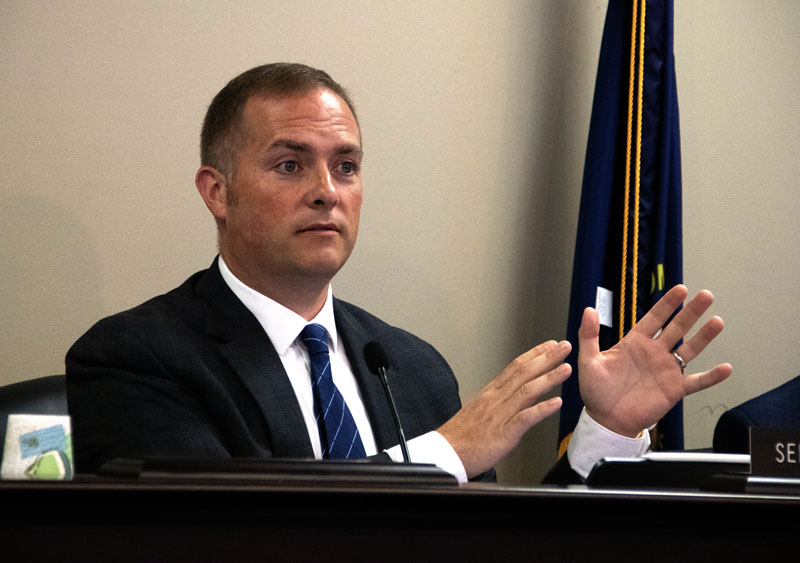
Juvenile Justice Oversight Council co-chair Sen. Whitney Westerfield, R-Fruit Hill, asks a question about alternatives to juvenile detention.
FRANKFORT — Traditional detention isn’t the only option for children in Kentucky’s juvenile justice system.
Margo Figg, director for the Division of Classification and Placement for the Kentucky Department of Juvenile Justice, gave a presentation on the alternatives to detention during Friday’s Juvenile Justice Oversight Council meeting.
“The alternatives are short-term, less restrictive programs than detention,” Figg said. “We try to keep the kids no longer than 30-45 days. However, it is up to the judge.”
The different types of alternative detention programs include home incarceration with electronic monitoring, home supervision, group homes, foster care, private child care, community programs and in-home wrap-around services.
Ensuring the public remains safe, the youth does not reoffend, and that the youth doesn’t miss court appearances is important, Figg said.
“The goals are to divert the youth from secure detention in order to serve them more appropriately and assure that detention beds are for the offenders who present public safety issues,” Figg added.
Council co-chair Sen. Whitney Westerfield, R-Fruit Hill, asked if alternatives to detention happen pre-adjudication. Figg said yes.
“Which means that they’re in front of the judge pretrial agreement … we work with them until their cases are disposed,” she added.
Detention alternative coordinators (DACs) are available to help youth find an alternative program and navigate the system. Once several open positions are filled, the state Department of Juvenile Justice will employ 17 DACs and three supervisors across the state, Figg said. Each one is assigned to a geographical area, so all 120 Kentucky counties are served.
“We want these youth to be successful,” she said. From January to August of this year, 726 youth have been served with an 83% success rate in alternative detention.
Rep. Kevin D. Bratcher, R-Louisville, asked if DACs are successful in Jefferson County.
“They’re doing an amazing job,” Figg said, while noting one challenge: The number of youth who qualify for alternative detention exceeds the number of open placements in group homes and other facilities.
Rep. Keturah Herron, D-Louisville, asked Figg for a list of where children are being referred to in Jefferson County and how much the state is spending on alternative detention.
“I think we need to also have an understanding of how funding is being utilized for alternatives and other things, so we can have understanding if we need to be putting more money into those things,” Herron said.
Figg said it is an “exorbitant” amount, but the exact figure will have to be sent to the council later. Currently, the state spends $50 per day on home incarceration and $78 to $150 per day on private or foster care.
Westerfield also had a request. He asked Figg for data on how alternative detention is being used per county.
“If possible, I’d like to identify by map, by chart, spreadsheet – however you all can compile – I’d like to identify counties where you had eligible kids that didn’t utilize the program,” Westerfield said.
Juvenile Justice Commissioner Vicki Reed said they will try to gather some data for the council. Reed is also an ex-officio non-legislator member of the council.
“I’ll just tell you that (alternative detention) is very popular with most judges,” Reed said, adding that some judges prefer traditional detention.
The Juvenile Justice Oversight Council is a statutory committee tasked with providing an independent review of the state’s juvenile justice system. The council’s next meeting is currently scheduled for 2 p.m. on Sept. 15.
For more information, visit legislature.ky.gov.
Legislators vow to fight fentanyl during committee meeting
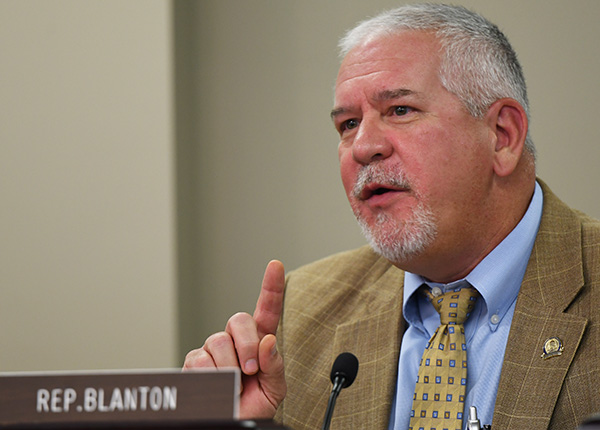
Rep. John Blanton, R-Salyersville, speaks on fentanyl during Tuesday’s Interim Joint Committee on Veterans, Military Affairs, and Public Protection meeting. A high-res photo can be found here.
FRANKFORT — The Interim Joint Committee on Veterans, Military Affairs, and Public Protection heard impassioned testimony Tuesday from those who lost loved ones to fentanyl, and some lawmakers vowed to continue fighting the drug through legislation.
Three women involved with The Never Alone Nick Rucker Foundation – a nonprofit group formed to warn the public about the dangers of fentanyl, end stigma and change laws – told legislators about the devastating impact of fentanyl on their families.
One legislator who accompanied the women, Rep. Candy Massaroni, R-Bardstown, described fentanyl as a ticking time bomb in Kentucky’s neighborhoods, school and workplaces.
“Today, we just want to address an issue. It’s a heart-wrenching issue that’s affecting every community across the nation and especially Kentucky. It’s the deadly impact of the drug cartels who are peddling not only illegal narcotics, but a hidden danger – fentanyl,” she said.
Tami Boblitt said she struggled to find treatment for her son, Chase, who died from an overdose in June 2021. Boblitt said they went to six treatment facilities in one day and were turned away for a multitude of reasons.
“The stigma is terrible. I was treated poorly. Chase was treated poorly. Even the places where we were going to for help, we were treated very poorly,” she said. “So we’re just trying to raise awareness. We want people to understand we’re normal people. These things happen to lots of families.”
Boblitt is supporting a proposal called Chase’s Law, which seeks to reduce stigma and provide people with a safe place to recover after they receive Narcan, an anti-overdose drug.
While she said jail is not the answer, a 72-hour hold or similar intervention would help prevent deaths that can occur even after someone becomes alert and seems to be much better, she argued.
Another mother, Ashley Green, testified about her 3-year old son’s fentanyl-related death and her own struggles with drug use.
Green said her son was exposed while in a house with four people, one of whom had fentanyl. Nobody has admitted they had the drug, and laws are too weak to provide justice, she added.
“He did not do fentanyl. He did not come across this, you know, on his own. An adult in that house had it, and nobody’s going to be prosecuted for that. That’s not fair to him or his life, nor his purpose. He came to save me from addiction,” she said.
Rep. Chris Fugate, R-Chavies, who served with the Kentucky State Police for 22 years, said the legislature had a “great opportunity” to be more stringent regarding fentanyl dealers two years ago, but legislation didn’t pass.
“They ought to have to serve jail time. We’ve become so soft in this country on people who are killing our people,” he said.
Rep. John Blanton, R-Salyersville, who also worked for KSP, said those who sell drugs to support their habit are still dealers. He said he’s working with Rep. Deanna Frazier Gordon, R-Richmond, on legislation that would toughen drug-related penalties.
“If you provide drugs to somebody and they lose their life, then you ought to be charged with murder, period, because you’re responsible for their death,” he said.
Sen. Matthew Deneen, R-Elizabethtown, said he encourages committee members to support state funding for the 11 drug task forces in Kentucky. He said not funding them amply is costing lives and this should be addressed during the upcoming legislative session, which starts in January.
“You would think all of them have their own radios to operate within a drug task force. They do not. You would think that every one of the 11 drug force task teams have the technology necessary to survey, monitor and protect their communities. They do not,” he said.
Nail tech industry asks legislative committee to update testing, regulations
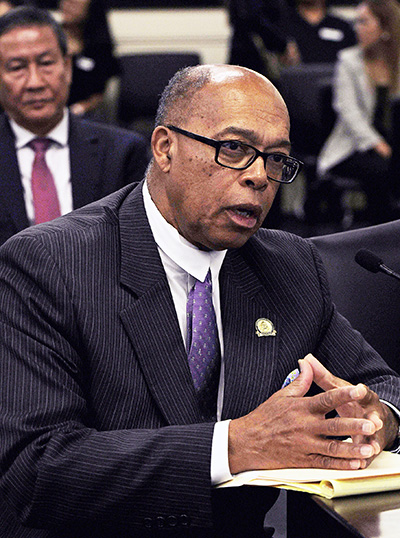
Senate Minority Caucus Chair Reginald Thomas, D-Lexington, discusses a potential bill on nail tech certification and regulations during Tuesday’s Interim Joint Committee on Licensing, Occupations and Administrative Regulations meeting. A high-res photo can be found here.
FRANKFORT — A bipartisan bill in the works for the 2024 legislative session would update nail tech certification testing and nail salon regulations.
Senate Minority Caucus Chair Reginald Thomas, D-Lexington, is one of the primary sponsors of the potential legislation. He and Sen. John Schickel, R-Union, have been working together on the bill.
“I really hope that we can come to some consensus about this bill,” Thomas told the Interim Joint Committee on Licensing, Occupations and Administrative Regulations. He invited several representatives from the nail tech industry to testify on the issue during the committee’s meeting Tuesday.
Kentucky nail technician Molida Soth said most nail techs in the U.S. are in the Asian American Pacific Islander community, and many of them are not native English speakers. Currently, the nail tech certification exam is only offered in English.
Soth said the exam needs to be offered in multiple languages, including Vietnamese, Cambodian and Chinese. Failing the exam more than three times requires the applicant to wait six months and take an 80-hour brush up course before retaking the exam. If they fail two more times, the applicant is banned from retaking the exam for three years, she added.
“Examination disfavors those who do not speak English as their first language,” Soth said. “So this is not because of their lack of skill, but simply due to the fact they do not read English … This causes a great financial burden.”
When otherwise skilled nail techs cannot get board certified, it makes it difficult for them to find a job and it hurts the high-in-demand nail tech industry that needs workers, Soth said.
Additionally, Soth said nail salons have faced strict regulations by the Kentucky Board of Cosmetology that have led to shut downs and excessive fines with little chance to correct any issues beforehand.
Ultimately, the industry would like to see a nail tech representative added to the state cosmetology board and a written warning before punitive action is taken against a salon. Soth said they are also requesting the board certification exam be offered in multiple languages with unlimited opportunities to retake the exam.
“Asian immigrants are known for their strong work ethic,” Soth said. “We work long hours. We dedicate ourselves to our craft. We pay taxes on our earnings, and we firmly believe in the American dream.”
Schickel, who co-chairs the committee, said he’s “very excited” about Thomas’s bill. Schickel said he’s spent some time this summer visiting nail salons in his district, and he’s been impressed.
“It’s been my observation that you are hardworking people, and that the citizens, at least in my community, utilize your services,” he added.
Rep. Killian Timoney, R-Nicholasville, who is a first-generation American, said he thinks the issues facing the nail tech industry are getting in the way of people working.
“I think this is one of those cases where we have overregulated something that we need to take a look at finding a way where we can get people to work that want to work and encourage them and make sure red tape is not in the way,” he said.
Sen. Michael J. Nemes, R-Shepherdsville, said an update to the Kentucky Board of Cosmetology is needed.
“I thank you all for adapting to what you’ve had to adapt to and thank you for being a great asset to Kentucky,” Nemes said. “I look forward to backing this bill.”
During the interim, the Kentucky General Assembly cannot take any action on legislation. The 2024 legislative session begins Jan. 2.
The next Interim Joint Committee on Licensing, Occupations and Administrative Regulations is currently scheduled for Sept. 28 at 11 a.m.
Questions abound from legislators during energy-related meeting
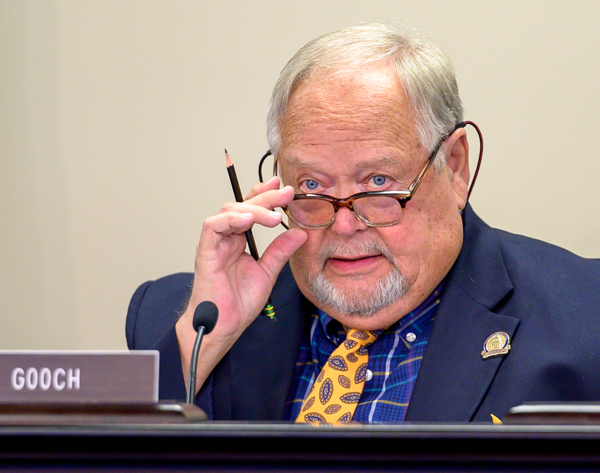
Rep. Jim Gooch Jr., R-Providence, also committee co-chair, speaks on Thursday during a meeting of the Interim Joint Committee on Natural Resources and Energy. A high-res photo can be found here.
FRANKFORT — Questions abounded on Thursday from legislators on the Interim Joint Committee on Natural Resources and Energy as a representative from one of Kentucky’s power grid operators offered predictions about the future of energy in the commonwealth.
Asim Z. Haque serves as vice president of state and member services for the Pennsylvania-based PJM Interconnection. The organization coordinates the electrical transmission grid for parts or all of 13 states, including about half of Kentucky.
Haque said East Kentucky Power Cooperative, Duke Energy Kentucky and Kentucky Power all operate within the PJM’s footprint. His organization’s primary focus is making sure that power is generated and transmitted reliably, while also maintaining affordability for consumers, he testified.
However, Haque expressed concerns that the energy supply will not keep pace with growing demand over the next decade as operators retire more power generating units. He said new types of energy production – such as solar and wind – are not making up for the retirements.
“Later on into this decade, we are concerned about a supply crunch – concerned about resources leaving the system too quickly and new resources not finding their way onto the system at a rate to replace those resources leaving the system,” he said.
Haque explained that energy resources offer different degrees of reliability, and that thermal resources – nuclear, coal and gas – provide a certain amount of essential reliability to the power grid.
Several lawmakers expressed apprehension about the trends and asked about the risk of rising costs and future blackouts, especially as electric vehicles and other types of equipment create more demand for power.
Rep. Jim Gooch Jr., R-Providence, and a committee co-chair, said he’s concerned about replacement of efficient power sources with those that aren’t as productive. He said 700 megawatts generated from wind and solar does not equate to 700 megawatts from fossil fuels because wind and solar are not always available.
“That’s one of the problems I’ve been trying to convey – that it’s not the same,” he said.
Haque agreed that there’s a difference between varying types of resources and said certain resources can’t be replaced without affecting reliability.
“One message to convey is, you can’t simply shut down all thermal resources and replace them with non-thermal resources because those thermal resources provide, again, essential reliability services,” Haque said.
Rep. John Blanton, R-Salyersville, said some states have been reckless in their efforts to close fossil fuel power plants and asked if shortages in other states will cause energy to be rationed in Kentucky to keep the lights on elsewhere.
“These policies are destroying our grid …every time they shut down one of these fossil fuel plants,” he said. “Those of us who are awakened and see through the smog, we understand that it is an attempt to shut down all of our fossil fuels that provide the most reliable, cheapest form of energy.”
Haque said PJM tries to educate policy makers to create reliability “safety valves.” If removing a unit will create challenges, the organization can ask units to remain operable until additional infrastructure is ready. He also encouraged states to remain “open for business” as operators look to expand renewables.
One issue, according to Sen. Robin L. Webb, D-Grayson, is which communities and demographics in Kentucky might be affected first in the event of an energy shortage. She asked if PJM has any models to predict who would experience the biggest impact from certain scenarios.
“I’ve got a lot of poor rural people, and I’ve got some major users like a refinery in my district,” she said.
Haque said any response to shortages would be based on the grid engineering and what’s necessary to keep the bulk of the grid viable, not on the types of customers.
Sen. Phillip Wheeler, R-Pikeville, said one of the promises made by people supporting renewables is that they are going to reduce costs, make the environment cleaner and be a benefit to consumers. He asked when consumers will see the benefits of the new resources.
“I’ve done a little bit of research, and in 2004, the average Kentucky Power customer was paying about $74 a month. Now they’re paying about $187.50, which is about a 250% increase, which I understand there’s some inflation in there, but that far outpaces inflation,” he said.
Haque said in the PJM footprint, Kentucky generally uses 50%-plus coal resources and 40%-plus natural gas resources.
“So I have not, at least in the PJM footprint, we have not seen many renewables find their way into the system, again, at least in the PJM footprint in Kentucky,” he said.
Omnibus electronic privacy protection bill in the works for 2024 legislative session
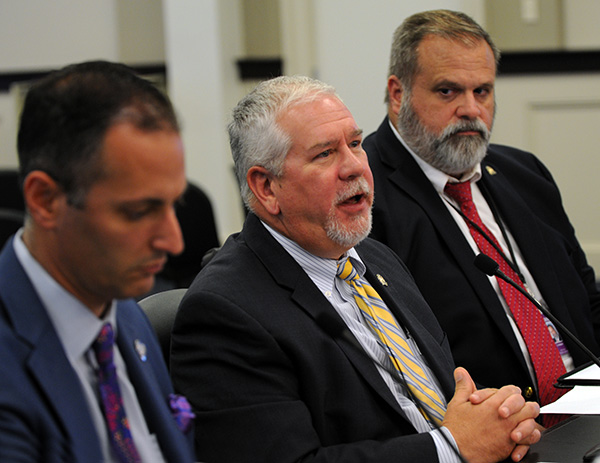
Rep. John Blanton, R-Salyersville, speaks on an electronic privacy protection bill for the 2024 legislative session alongside co-sponsors Rep. Daniel Grossberg, D-Louisville, (left) and Rep. John Hodgson, R-Fisherville during Thursday’s Interim Joint Committee on Judiciary meeting. A high-res photo can be found here.
FRANKFORT — Technology once seen only in science fiction is now becoming reality. Some members of the Kentucky General Assembly want to make sure it’s used for good, not evil.
Bill Request 26 would aim to regulate the use of automated license plate readers, drones, artificial intelligence and microchip technology. The bipartisan initiative is led by Rep. John Hodgson, R-Fisherville, Rep. John Blanton, R-Salyersville, and Rep. Daniel Grossberg, D-Louisville.
All three lawmakers testified before the Interim Joint Committee on Judiciary on Thursday. Hodgson called the potential bill for the 2024 legislative session a “team effort.”
“It’s widely supported by the public,” Hodgson said. “Nobody really wants the government or their neighbor spying on them, and that’s the genesis of this bill.”
Hodgson said he the co-sponsors want a draft of the bill available to the public early to create a dialogue and make sure the legislation won’t have any unintended consequences.
The first section of BR 26 covers automated license plate readers. An entity could retain collected data for only 90 days unless it’s evidence in a felony case, the subject of a subpoena or being used to collect tolls. The bill would also prohibit the sale of license plate data.
The second section of the bill would apply to unmanned aircraft or drones, Blanton said. BR 26 would prohibit the use of drones with an imaging device on private property without the owner’s written consent. Some exceptions would apply for law enforcement with a search warrant, for example. Civil action may be taken against violators, according to the draft of the legislation.
Other portions of the bill would protect Kentuckians from the unlawful transmission of a deep fake, Grossberg said.
“A deep fake is a fabricated video or audio clip made with machine learning to imitate a real person,” he said. “Since the term was coined in 2017, the emerging technology has advanced rapidly. Anyone with a cheap program can create a deep fake visually indistinguishable from reality with less than a minute of audio and a handful of pictures.”
Grossberg said the FBI and the Department of Homeland Security have already issued warnings against the technology.
“Fraudsters can now mimic reality at a level once thought impossible,” he added. “Online predators can lure children with realistic young avatars. Deep fake pornography can be used to harass women who post on social media.
“In fact, according to a deep fake detection agency, Sensity AI, 95% of deep fake videos posted online are non-consensual pornography.”
BR 26 would prohibit the dissemination of a deep fake without the depicted individual’s written consent. Violators would be subject to civil action and possible criminal charges.
Distributing a deep fake with the intent to harm, harass, annoy, threaten, alarm or cause harm to the reputation or finances of the depicted individual would be a class D felony under the bill.
Additional language in BR 26 would protect individuals from being required or coerced into the implantation of an identification device or a microchip.
Although the current version of the bill only covers four areas of electronic privacy, Hodgson said more provisions may be added as he and others learn more about AI technology.
During the interim, the Kentucky General Assembly cannot take any action on legislation. The 2024 legislative session begins Jan. 2.
A draft of BR 26 is available here.
State education committee hears from Kentucky math center
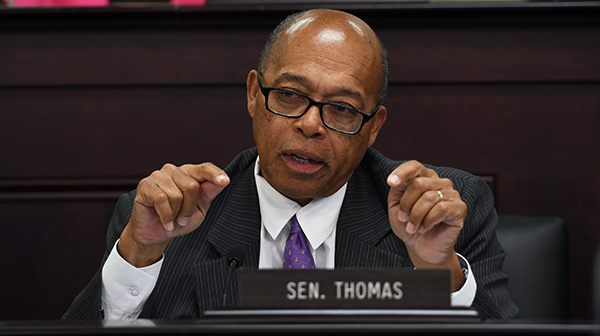
Senate Minority Caucus Chair Reginald Thomas, D-Lexington, speaks on the Alabama Numeracy Act during Tuesday’s Interim Joint Committee on Education meeting. He said similar legislation could benefit Kentucky’s students. A high-res photo can be found here.
FRANKFORT — The Interim Joint Committee on Education heard from supporters of the Kentucky Center for Mathematics on Tuesday about efforts to improve numeracy throughout the commonwealth.
The center was established at Northern Kentucky University through state funding in 2006, and it provides services for teachers and anyone else interested in mathematics. It also receives grant money, according to the organization’s executive director, Kelly Stone DeLong.
“We really focus on that math intervention. We focus on diagnostic assessment, coaching, and mentoring is really an important part of what we’re doing. And that’s becoming more and more of what we’re working on and other instructional strategies to address students’ needs,” she said.
Over the past three years, nearly 2,200 teachers have participated in 2,293 hours of professional learning through KCM.
Amanda Holbrook, a math teacher at Martha Jane Potter Elementary School in Letcher County, testified that KCM helped teachers and students get back to learning following flooding that destroyed the school in 2022.
“She brought in truckloads of brand new, hands-on math materials and calculators for our students. She fully equipped our teachers with the materials they need to teach mathematics. With the help of Kelly and the Kentucky Center for Mathematics, our students began the year with good, quality math instruction,” she said.
KCM provided lawmakers with statistics from 2022, compiled by the National Assessment of Educational Progress. Among Kentucky fourth graders, 75% performed at or above the NAEP basic level in math. That’s down from 81% in 2019.
Sen. Stephen Meredith, R-Leitchfield, raised concerns about the downward trend, and DeLong said she’s interested in studying the issue more.
Rep. Josie Raymond, D-Louisville, asked about teaching mathematics to children before they begin school and how KCM supports early educators.
“We have a pre-K curriculum and course that we did that’s very popular, grounded in the research. So we would love to scale that to more places with those preschool teachers,” DeLong said.
She also suggested that KCM’s intent is to work with Kentucky Educational Television to benefit the state’s young children.
Rep. James Tipton, R-Taylorsville, and co-chair of the committee, said one trend he’s noticed on test scores is they tend to drop from elementary school to middle school to high school. He asked DeLong what causes the decline.
DeLong hypothesized that while students work diligently, they may not have secured math fluencies in the earlier grades. Then the subject becomes more complicated at the middle and the high school levels.
“The other thing is we want to have the math identity, and maybe by the time they get to middle school, then they have decided that math is not their identity,” she said.
Senate Minority Caucus Chair Reginald Thomas, D-Lexington, said he recently learned about the Alabama Numeracy Act, which is designed to boost students’ math skills. He said those skills are as important as literacy.
“When someone comes up and says they can’t read, we’re appalled by that. We can’t understand that,” he said. “And yet we readily accept, Ms. DeLong, when someone says, ‘I can’t just get math. It’s too hard for me. It’s something that I just can’t comprehend.’’’
Committee receives overview of AI positives, negatives
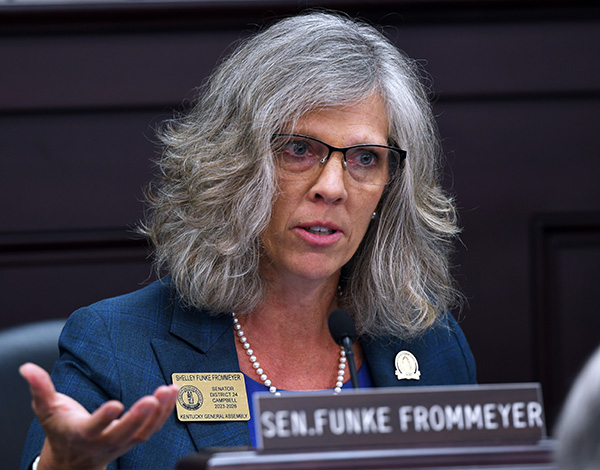
Sen. Shelley Funke Frommeyer, R-Alexandria, speaks about artificial intelligence at Monday’s meeting of the Interim Joint Committee on Tourism, Small Business, and Information Technology. A high-res photo can be found here.
FRANKFORT — Advocates for the commonwealth’s use of artificial intelligence offered legislators an overview of new technology – some of it already in use – during a meeting of the Interim Joint Committee on Tourism, Small Business, and Information Technology.
Ben Kaner and Alicia Schollaert of Gartner, an international consulting firm, testified to the legislators Monday about ways that state agencies could implement and benefit from AI while also reducing some of the risks.
Kaner outlined many potential uses, such as data management, developing user guides, and providing multilingual resources to Kentuckians. However, he also warned that AI can provide misleading information and reflect bias in data. It also gives malign users smarter tools to attack government networks.
He recommended that lawmakers view AI as an opportunity and provide a safe space for experimentation. But governments must look to mitigate risks by keeping humans in the loop and scaling automation appropriately and in stages, he said.
“It is an opportunity to set up Kentucky to advance significantly in a way to provide services and the service it provides to its citizens,” Kaner said.
Legislators expressed a myriad of concerns over the technology during Monday’s hearing. Some questioned whether AI systems could take jobs, maliciously mine data or grow smart enough to hijack government networks. Others appeared more focused on upside potential.
Sen. Shelley Funke Frommeyer, R-Alexandria, asked if AI could provide some practical tools for teaching math and reading.
“Your presentation is incredibly timely because we’re grappling with so many education issues, and Kentucky continues to have some challenges, and we have fantastic teachers, but perhaps not enough teachers,” she said.
Schollaert said 51% of teachers are already using AI to cut down on administrative tasks and spend more time with students. AI can help teachers come up with lesson plans and even provide one-on-one tutoring for students, she said.
Rep. Candy Massaroni, R-Bardstown, asked about data mining, noting that many parents have concerns that popular devices are already collecting data on their children.
But Kaner said if a system is set up correctly, it would prevent mining of data.
Rep. Daniel Grossberg, D-Louisville, said AI should not be banned or dismissed, and he envisions AI as a support tool, not a complete replacement for human work.
“AI is going to revolutionize the world the way that the invention of the electric generator and the electric motor did. And if you think back 120 years ago, no one could conceive what electricity did to humankind,” he said. “We are just scratching the surface in this conversation.”
However, Grossberg added that it’s absolutely essential for lawmakers to develop protocols and guardrails. While AI is not sentient, it could be programmed for “great evil,” he warned.
“That’s what we need to be focused on, making sure we have oversight on who has access to the technology, what the trainings are, and have serious repercussions if someone goes off the rails with it,” he said.
Rep. Kim King, R-Harrodsburg, a co-chair of the committee, said AI issues have been on her mind for months, and she expressed concern about “bad actors.”
“This is a very heavy weight of responsibility that we are taking on here,” she said. “So one thing that keeps coming to mind is the fiduciary responsibility we have given to professions. The ones that come to mind are lawyers, financial institutions, insurance, probably even real estate comes to mind. They have to have the best interest of the client or the people that they’re representing in mind, and that’s how they make decisions,” she said.
Rep. Ryan Dotson, R-Winchester, said he fears AI will become “self-learning” as technology evolves and that fear is high among the general public.
“I see all the benefits of AI. It’s a very powerful tool. It’s going to replace industries. It’s going to enhance industries. And even though it may be a powerful tool, it can also be a powerful force for us to contend with in the future,” he said.
Legislators hear workforce and labor market policy recommendations
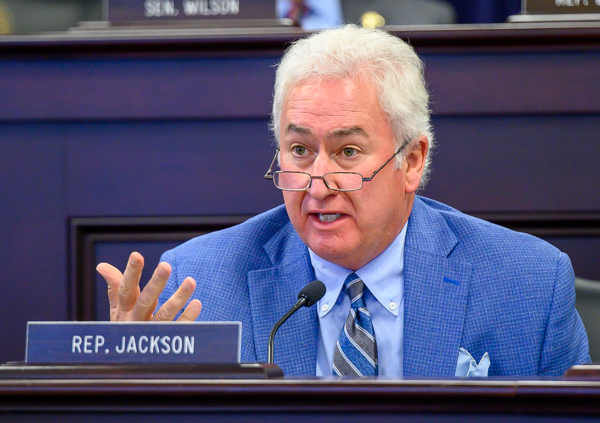
Rep. Kevin Jackson, R-Bowling Green, asks a question about workforce participation during Monday’s Interim Joint Committee on Economic Development and Workforce Investment meeting. A high-res photo can be found here.
FRANKFORT — Jobs are plentiful in Kentucky, but the state’s low workforce participation rate leaves many positions open.
Charles Aull spoke to the Interim Joint Committee on Economic Development and Workforce Investment on Monday about Kentucky’s workforce and labor market. Aull, who is the executive director at the Kentucky Chamber of Commerce Center for Policy and Research, also provided some policy recommendations.
Kentucky’s unemployment rate may be at a record low for the state, but the workforce participation rate has not recovered to pre-pandemic levels, Aull said. An aging workforce, lack of affordable child care and substance use disorder are three of the biggest factors behind low workforce participation rates.
“There are absolutely things that state policy can do, that federal policy can do and that the private sector can do to alleviate these challenges,” Aull said.
Rep. Kim King, R-Harrodsburg, asked if there’s something about this region of the U.S. that attracts more workers.
“What can Kentucky do to get up there with our neighbors?”
A warmer climate and competitive tax rates in states like Tennessee and Florida are two of the biggest factors that attract workers to the southeast and the southwest, Aull said.
Policy wise, Kentucky should focus on attracting more workers, optimizing the homegrown workforce, continuing to make Kentucky more tax competitive and reducing opioid use disorder, Aull said.
He also recommended increasing re-entry support for previously incarcerated Kentuckians and developing a statewide strategy to optimize underutilized talent in certain populations. That includes refugee and immigrant populations along with individuals with disabilities.
Some research estimates that 55,000 adult Kentuckians are not participating in the workforce due to opioid use disorder, Aull said.
“The good news is, I think this general assembly is already doing a lot,” Aull added. “What I would want to impart though to you all is not to let your foot off the gas on these issues. This will require extreme amounts of focus and dedication.”
Rep. Kevin Jackson, R-Bowling Green, said his district competes with Tennessee for employees.
“Could you give me your explanation of why Tennessee grew at a rate four times of Kentucky as far as workforce levels?” he asked.
Aull said Tennessee is more tax competitive since the state doesn’t have an income tax. Tennessee also has a large tourism industry.
On the issue of wages, Senate Minority Caucus Chair Reginald Thomas, D-Lexington, said he thinks raising the minimum wage would increase workforce participation.
“If you look at the top 10 states that have a higher workforce, you will find that most of them, not all of them but most of them, have a higher minimum wage than $7.25 an hour,” he said.
Aull said he omitted increasing the minimum wage from his list of policy recommendations because most employers have already increased wages due to market demand. Changing state law to increase the minimum wage could inadvertently hurt child care and long term care facilities, he added.
Sen. Robby Mills, R-Henderson, asked Aull if there is anything states can do to address the birth rate issue.
“Have you seen any states doing anything creative around birth rates like tax incentives?” he said.
Aull said birth rates are a global challenge as more couples start families later in life and financial issues cause people to have fewer children. But Kentucky tends to do better than other states when it comes to the birth rate.
“If you can make it I guess less expensive for families to have children, I think there’s a good chance that we would see some increase in those fertility rates,” Aull said.
The next Interim Joint Committee on Economic Development and Workforce Investment is scheduled for Aug. 23 at 9 a.m. in Frankfort. For more information, visit legislature.ky.gov.
Legislative committee discusses future of child care funding
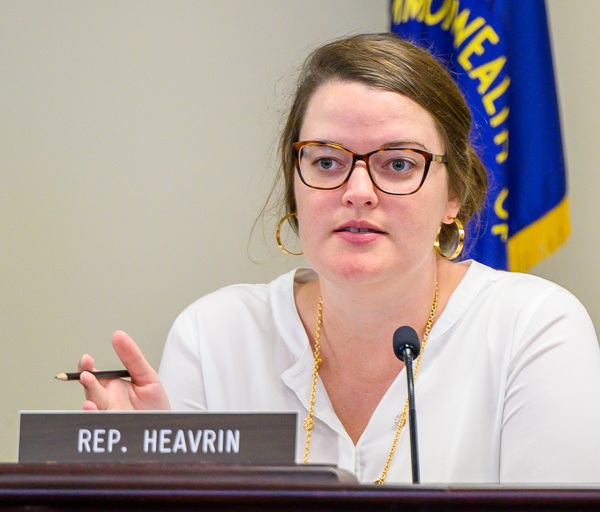
Committee co-chair Rep. Samara Heavrin, R-Leitchfield, speaks on the future of sustainability payments for child care centers during Tuesday’s Interim Joint Committee on Families and Children meeting. A high-res photo can be found here.
FRANKFORT — It is no secret Kentucky’s child care industry struggled during the height of the COVID-19 pandemic. Federal American Rescue Plan Act (ARPA) funding came to the rescue, but a major portion of those funds will run out in September.
The Interim Joint Committee on Families and Children met Tuesday to discuss the future of child care funding in the state. Committee co-chair Sen. Danny Carroll, R-Benton, said the Kentucky General Assembly has a lot of consider going into the next budget cycle, which begins in 2024.
“You all know how crucial child care is coming into this next session,’ Carroll said. “I don’t know that there’s any one topic that is more important than that … There’s a lot of uncertainty on what the investment will need to be and how we can continue to grow centers throughout the commonwealth and sustain what we got.”
Ensuring quality child care is available across the commonwealth impacts the workforce and economy, Carroll said.
Andrea Day, who testified before the committee on Tuesday, said about 60% of Kentucky is considered a child care desert. Day is the division of child care director in the Department for Community Based Services (DCBS).
In 2021, Kentucky began receiving $470 million in ARPA funds to use as sustainability payments and $293 million for one-time child care and development block grants, Day said. By September, the sustainability payments will end. The block-grant funding will remain through September 2024.
Day said the ARPA funds have helped child care centers in Kentucky remain open and keep rates low for low-income Kentuckians. The block grant funding has been used to provide start-up grants, tuition support, facility updates and more.
Committee co-chair Rep. Samara Heavrin, R-Leitchfield, asked Day if the Cabinet for Health and Family Services planned to fund the sustainability payments once they run out. The General Assembly could possibly allocate funding in the next biennial budget, Heavrin said, even though she’s not sold on the idea.
“I think a lot of us here in the General Assembly are trying to figure out if it’s the government’s place to help with those sustainability payments. Because if it’s a broken system, how do we need to revamp that to help child care owners to be able to fix that?” Heavrin said.
Day said the cabinet has not made a decision.
Rep. Lisa Willner, D-Louisville, said she’s aware of child care providers who are “very concerned” about the end of the sustainability payments.
Rep. Josie Raymond, D-Louisville, also said she’s aware of child care centers with rate-increase letters ready to go out just in case the cabinet does not take over. She said the General Assembly is going to have to invest in subsidizing the child care industry moving forward.
“Do we want women between the ages of 20 and 40 to be in the workforce? Yeah, if we do, we need to subsidize starting with an additional stabilization in September,” Raymond added.
Senate Majority Caucus Chair Julie Raque Adams, R-Louisville, asked Day if DCBS has any legislative proposals outside of budget recommendations prepared. Day said she was not aware of any.
Adams said sometimes issues can be fixed through non-monetary solutions.
“We do it through legislative fixes, and so I would encourage you all in the cabinet to look at possible legislative proposals that you can bring to the General Assembly for us to consider,” Adams said.
After a lengthy discussion, Carroll, who works in the child care industry, said the industry is not looking for a bail out.
“These are ‘mom and pop’ child care centers that are just trying to help raise and educate kids so parents can go to work,” he said.
The next Interim Joint Committee on Families and Children meeting is scheduled for Aug. 24 at 2 p.m. at the Kentucky State Fair in Louisville.
For more information, visit legislature.ky.gov.
Lawmakers discuss automating criminal record expungement process
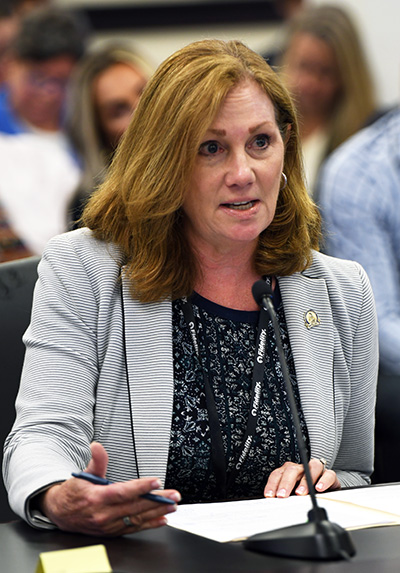
Rep. Kimberly Poore Moser, R-Taylor Mill, testifies on the potential Clean Slate Act during a July 20 meeting of the Interim Joint Committee on Judiciary. A high-res photo can be here.
FRANKFORT — State law allows Kentuckians with low-level, non-violent convictions to have their criminal record expunged after meeting a few requirements, but it isn’t a simple process.
Rep. Kimberly Poore Moser, R-Taylor Mill, and other stakeholders spoke before the Interim Joint Committee on Judiciary on Thursday on how to make the expungement process easier.
Moser said the potential legislation would not change the current expungement statute. Earlier this year, Moser sponsored House Bill 588, but it did not pass before the end of the legislative session. She would have to refile the bill in 2024 in order for lawmakers to officially reconsider it.
“The objective of our corrections system as we all know is to assist individuals in their rehabilitation and to let them get on with their life to reintegrate into society,” Moser said. “This will simply expedite the process.”
Otherwise known as The Clean Slate Act, it would apply to Kentuckians who have completed their sentence and remain crime-free for five years. Once those requirements are met, the state would notify the individual they are eligible for expungement. This process would involve the Administrative Office of the Courts and Kentucky State Police. A judge would have to issue the final approval.
“Currently, less than 10% of individuals who are eligible for expungement actually petition the court for their expungement, so this would simplify the process,” Moser said.
Several Kentuckians who have petitioned for expungement testified before the committee on how it is difficult and costly. They also shared how having a criminal record for many years after completing their sentence made it harder to find a well-paying job, attend field trips with their kids, find housing and more.
Rep. Stephanie Dietz, R-Edgewood, said prior to the meeting she heard from some commonwealth attorneys with concerns about the bill’s impact on restitution and Marsy’s Law, which provides certain rights to crime victims.
Jesse Kelley, a campaign strategist with the Clean Slate Initiative, said Kentucky’s version of The Clean Slate Act would not impact restitution or Marsy’s Law. Individuals who have not met all of their sentencing requirements from the court, including completing their restitution payments, would not be eligible for expungement.
Sen. John Schickel, R-Union, said he did not support the first expungement law and he does not support this idea. He believes businesses have the right to know the criminal backgrounds of potential employees.
“Who are we to say that the government can hide that from us?” Schickel said. “I don’t understand that. We shouldn’t be making decisions for small businesses.”
Moser said she initially had the same concerns as Schickel, but she later changed her mind.
“I thought, who are we to question the courts and the punishment that has been given to these individuals for their mistakes? So it goes both ways,” she said, adding individuals who have completed their sentences should be able to “get on with their life.”
Sen. Karen Berg, D-Louisville, also spoke in favor of expediting the expungement process.
“I think this is an awesome, awesome, awesome idea,” she said.
The next Interim Joint Committee on Judiciary meeting is scheduled for 11 a.m. on Aug. 3. For more information, visit legislature.ky.gov.
Committee learns more about invasive carp in Kentucky
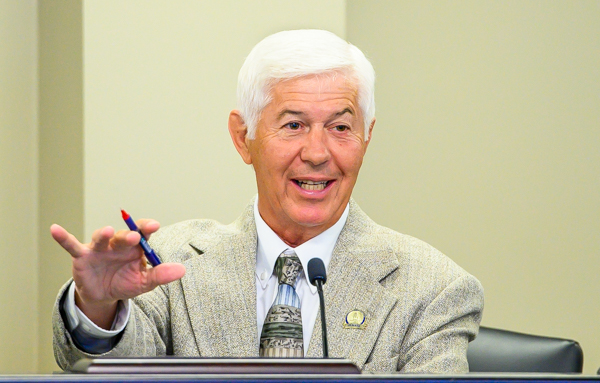
Sen. Gary Boswell, R-Owensboro, speaks on invasive carp in Kentucky during Thursday’s meeting of the Interim Joint Committee on Agriculture. A high-res photo can be here.
FRANKFORT — Fish such as bass and blue gill are welcome in Kentucky’s waters. However, Asian carp, also called invasive carp, have had a devastating effect on the state’s economy, state lawmakers heard Thursday.
The Interim Joint Committee on Agriculture received updates from the Kentucky Department of Fish and Wildlife Resources about efforts to manage invasive carp in the commonwealth’s waterways.
Officials told the committee that invasive carp came from private ponds in Arkansas. The ponds flooded, allowing the fish to spread to tributaries and into Kentucky. They said that while the situation is improving, it’s vital to maintain momentum.
“We are not where we were three years ago, and I think we’re well down the road to addressing this situation being it is what it is,” said Fish and Wildlife Commissioner Rich Storm.
State, federal, and private partners have worked with the department since 2010 to obtain federal funds for battling invasive carp. Increased funding has allowed wildlife authorities to establish carp crews in Frankfort and Murray. The crews monitor their populations and assess their impacts on native species, along with other tasks.
Director of Fisheries Dave Dreves said the department’s invasive carp work seeks to completely eradicate invasive carp. However, it won’t happen in the near future.
“We know that’s probably not very likely anytime soon, and so what we can do is we can slow their expansion into new waters, and we can try to put together programs and amend regulations to try to assist the commercial fishermen to fish these populations down where they are present,” he said.
Efforts include an 8-cent per pound subsidy on invasive carp harvested from Kentucky Lake and Lake Barkley, all paid for with federal dollars. Wildlife authorities are also deploying bio-acoustic fish fences, which use sound and bubbles to create a barrier.
Storm said more of them would be beneficial and this needs to be addressed soon.
Rep. Daniel Fister, R-Versailles, said he’s been aware of the invasive carp for years.
“It first came to light for me when these fish were still in the Mississippi River and hadn’t gotten here, so I kind of watched it as it came along, and I really thank you all for being proactive and making lemonade out of an issue that could have been a whole lot worse,” he said.
Fister asked about the types of invasive carp and if the base problem is expanding.
Chris Wooldridge, director of the Center for Economic and Entrepreneurial Development at Murray State University, said the four invasive species – bighead carp, silver carp, grass carp and black carp – have not expanded.
Rep. David Hale, R-Wellington, asked about the number of pounds of harvested invasive carp.
“Since 2013, we have harvested 50 million pounds or so. Now that we’re half way through the year, I’m just estimating we’ve probably got about five million pounds harvested this year so far,” Dreves said.
Sen. Gary Boswell, R-Owensboro, agreed that invasive carp are a serious problem and asked if shocking the fish is allowed.
“Right now, electrofishing is used by our federal and state resource agencies, but it’s not currently allowed for commercial use,” Dreves said. “The concerns are just about the non-target species being one and also safety issue is two.
Sen. Jason Howell, R-Murray, and committee co-chair, said the invasive carp are more of a threat than people realize.
“This is a completely different animal literally and figuratively, and the impact that it has on the areas that get affected is devastating,” he said. “That sounds dramatic, but it’s not. The economic impact to our area in this already has been problematic, and it could get a lot worse if we don’t take these steps.”
Budget subcommittee receives KSU update
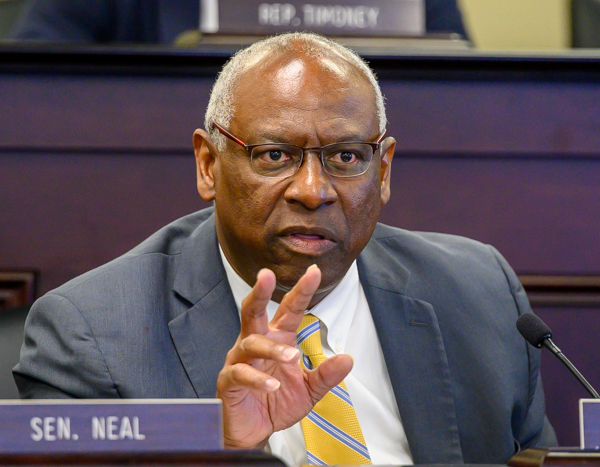
House Minority Floor Leader Derrick Graham, D-Frankfort, speaks about Kentucky State University during Wednesday’s Budget Review Subcommittee on Education meeting. A high-res photo can be here.
FRANKFORT — The Budget Review Subcommittee on Education received an update Wednesday about the commonwealth’s only public historically Black college and university, Frankfort-based Kentucky State University.
KSU has faced severe financial challenges in recent years, and last July, the governor directed the Kentucky Council on Postsecondary Education to complete a financial review. The General Assembly has also passed legislation to provide financial relief to the university.
During the meeting, Koffi C. Akakpo, the university’s recently named president; Travis Powell, vice president and general counsel for the Kentucky Council on Postsecondary Education; and Tammi Dukes, a member of the KSU Board of Regents, testified on the institution’s status.
Akakpo, who previously served as president and chief executive officer of Bluegrass Community and Technical College, said he inherited problems that arose before he took office at KSU. However, he told legislators he’s going to make sure the budget is balanced.
“We also have started the process of improving the internal control system,” he said. “We have to have a strong, robust internal control system in place to prevent the university from going back to where it has been for the last few years.”
Another goal is to boost enrollment, Akakpo added. He also testified that KSU has successful nursing and education programs, both of which produce graduates who can serve Kentuckians in these shortage plagued fields.
Powell said KSU is making progress, but he also pointed out challenges.
“I’m really excited to have Dr. Akakpo on board. One of the requirements of House Bill 250 was to go through a presidential search process, and I can tell you that it was an absolutely substantive and thorough process,” he said.
Lawmakers were quick to request additional updates as KSU moves forward.
House Minority Floor Leader Derrick Graham, D-Frankfort, said developing a strong relationship between the university and the community is important.
“The university is part of the community and vice versa. And also a relationship with our business community because they’re ready to work and to support the university as well as a good relationship with our school districts here in Franklin County and the surrounding counties to recruit those students who may not want to go to a large university or larger university,” he said.
Graham added that he’d like to see more promotion of the university’s nursing and aquaculture programs.
Rep. James Tipton, R-Taylorsville, asked about the university’s financial information and when committee members would receive audit findings.
“I know one of the items of consternation over the last couple of years has been the lack of the internal audit from the fiscal year 2021 budget,” he said.
Dukes responded, testifying that the 2021 financial audit and the compliance audit are both on track to be completed by July 31. Officials will complete the fiscal year 2022 audit by August, she said.
Senate Democratic Floor Leader Gerald A. Neal, D-Louisville, said he doesn’t want KSU to fail, and leaders at KSU should be honest about their challenges.
“I would like to see for you not to be timid about what you need the legislature to do in this role,” he said. “(The) legislature is complicit historically in what has happened at Kentucky State, and we have a responsibility, because of its historical value and what it offers us going forward, to make sure that this is a success story.”
Sen. Stephen West, R-Paris, asked the KSU representatives if they have ample information to work on the university’s latest budget.
“Do you have a good snapshot of what’s there so you can make informed decisions on the budget,” he asked?
Akakpo said it’ll be difficult. “I’ll be honest with you. I like to be honest and transparent,” he said.
Sen. Matthew Deneen, R-Elizabethtown, who also is co-chair of the subcommittee, said the KSU representatives should come to future meetings and offer regular updates.
“I understand you have a tall mountain to climb, and we will do what we can to support you. But we would like for you to come back time and again and maybe give us updates quarterly as you progress along these improvement plans and give us updates,” he said.
Legislators hear from education coalition about teacher shortages, recruitment efforts
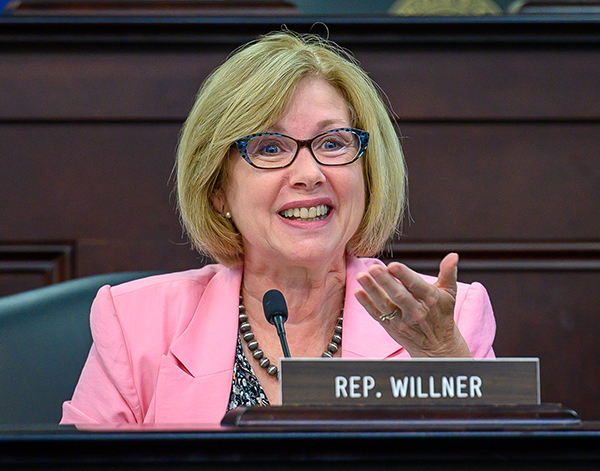
Rep. Lisa Willner, D-Louisville, speaks during Tuesday’s Interim Joint Committee on Education meeting. A high-res photo can be here.
FRANKFORT — The Interim Joint Committee on Education heard from multiple education leaders and advocates on Tuesday about proposals to ease teacher shortages in Kentucky.
Members of the Coalition to Sustain the Education Profession shared recommendations from an upcoming report on shortages that the group plans to release in August. The Frankfort-based Kentucky Association of School Administrators (KASA) convened the coalition last year.
Rhonda Caldwell, executive director of the KASA, praised lawmakers for acting on a first round of recommendations during the 2023 legislative session and said the latest report will include 17 recommendations and input from 150 people.
She highlighted three recommendations related to sustaining the profession, including one focused on teacher pay.
“Paying our teachers a salary that provides them with a living wage ensures that, most importantly, our quality educators are at the helm of every single classroom and keep Kentucky on par with neighboring states who actively recruit our quality teachers every single day,” Caldwell said.
David Meinshein, superintendent of Livingston County Schools, said the coalition is calling for a statewide minimum salary of $45,000 for new teachers at the start of the 2024-25 school year. The Kentucky average starting salary is $38,010, according to the group.
Other recommendations discussed Tuesday include extending the GoTeachKY program to every school district, establishing a statewide mentoring program and a tenure review committee.
The coalition also supports creating an educator stabilization fund to help attract and retain high-quality teachers in low-performing schools and for critical need positions.
One coalition member, Jim Allen, vice chair of Robert W. Baird & Co. Inc., said he can’t imagine running a business with the type of turnover schools sometimes face. He said a stipend for student teachers and framing education as an investment instead of an expense are good ideas.
“I look at it through the lens of a corporation and how we would address this if it were our issue,” he said. “The data is extremely telling. When you look at the 2021-22 data, it’s the most recently available, you had teacher turnover in Kentucky at 20.4 %.”
Rep. Jared Bauman, R-Louisville, asked why and how the coalition decided to propose the $45,000 figure. Caldwell said it was a practical number, and Meinshein said the ultimate goal will be for $50,000.
Rep. Lisa Willner, D-Louisville, said she appreciates the business aspects of the coalition’s presentation and supports a minimum salary for teachers.
“We’ve been hearing for a long time about how dire this situation is,” she said. “I appreciate that you’ve come to us today with some very concrete recommendations. And I’m really just looking forward to working together in a bicameral, bipartisan way in the session to establish what you guys are recommending. Certainly a minimum teacher salary makes so much sense.”
Rep. Killian Timoney, R-Nicholasville, a former teacher and principal, said he has monitored pay in surrounding states and that the minimum salary proposed is very reasonable.
“The name of game is the number of applicants for positions,” he said. “It’s not we have 2,100 openings. If we have 2,100 openings, we need 10,000 applicants.”
The committee’s next meeting is scheduled Tuesday, Aug. 1 at 11 a.m.
Highway work zone safety on Transportation committee’s radar
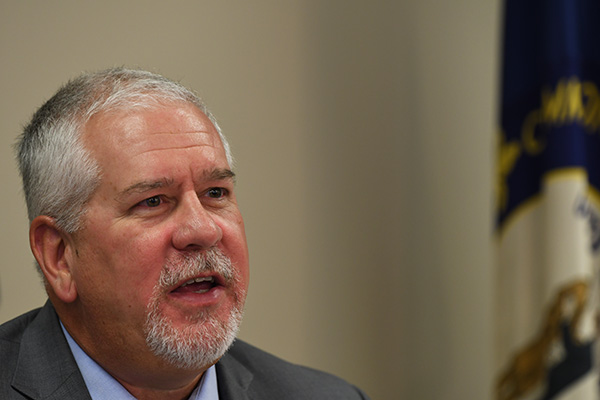
Committee co-chair Rep. John Blanton, R-Salyersville, sharing his idea for highway work zone camera legislation during Tuesday’s Interim Joint Committee on Transportation meeting. A high-res photo may be found here.
FRANKFORT — In 2022, more than a thousand crashes occurred in highway work zones in Kentucky, with five of those crashes resulting in a fatality.
Officials with the Kentucky Transportation Cabinet shared those statistics with the Interim Joint Committee on Transportation on Tuesday. Several lawmakers on the committee said they hope to fix Kentucky’s highway work zone safety problems in the 2024 legislative session.
Joe Plunk, chief district engineer for the cabinet’s district 3, said the number of vehicles driving into work zones is on the rise. He said current state laws on work zone violations are difficult to enforce.
“There is a lack of ability to enforce these work zone protections as work zone violations are treated just like any other traffic violation,” Plunk said. “In other words, they must be caught in the act.”
Officials shared several examples of state highway workers and contractors being injured or even killed by motorists who didn’t pay attention to traffic cones, signage or speed limits. In some cases, drivers intentionally injured a worker.
“Anything you can do to increase the safety of our employees and any work zone employees is critical,” said Deneatra Henderson, chief district engineer for district 2.
Committee co-chair Rep. John Blanton, R-Salyersville, said he’s worked with the cabinet over the last three years on legislation to put cameras in work zones to catch motorists who violate the law.
Blanton said legislators have a duty to protect people throughout the Commonwealth.
“If cameras aren’t the answer, then give me something that is,” he said. “I’m not married to cameras. I’m married to finding safety for our workers in our work zones. Provide me something that we can do to create a safer work environment.”
Blanton also said he’s in favor of increasing fines for work zone-related traffic violations.
“Let’s start making it hurt where it hurts us the most: our wallets,” he said. “Maybe that’ll grab some people’s attention.”
Senate Minority Whip David Yates, D-Louisville, said he is in favor of Blanton’s work zone camera proposal. He would like to see a pilot program to ensure accountability and oversight.
“Watching state after state do the pilot program, they’re showing they work. They slow things down,” he said.
Rep. Samara Heavrin, R-Leitchfield, also expressed concerns on work zone safety and the need for the general assembly to act during the meeting. .
“I’m afraid we’re going to keep trying to have this conversation and nothing’s going to get done and more people are going to get killed because we can’t come to an agreement,” she said. “What can we do in the meantime to come up with a short term solution while we figure out the long term solution?”
The next Interim Joint Committee on Transportation meeting is scheduled for 1 p.m. on Aug. 1.
For more information, visit legislature.ky.gov.
Legislative committee issues report on juvenile justice
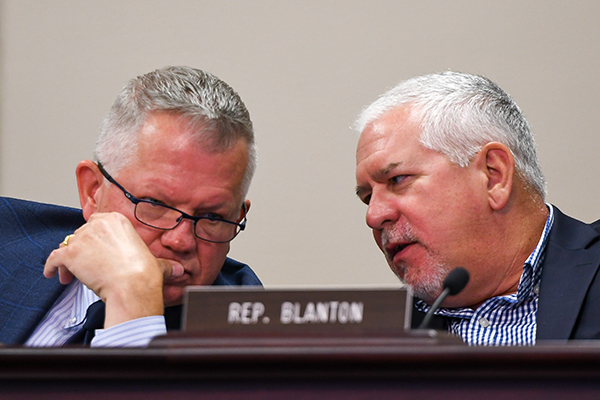
Sen. Danny Carroll, R-Benton, (left) confers with Rep. John Blanton, R-Salyersville, during the Legislative Oversight and Investigations Committee meeting on July 14. A high-res photo may be found here.
FRANKFORT — The Legislative Oversight and Investigations Committee has approved more than two dozen recommendations to help stabilize Kentucky’s troubled juvenile justice system following fires and a riot at two state detention centers last year.
In a report adopted Friday, the committee is calling for more top-down oversight of detention facilities, more training for staff, better monitoring of staff grievances and work hours, and improved tracking of offenders and serious incidents.
Those are just some of the 30 recommendations from a nine-month investigation into Kentucky’s regional juvenile detention centers, which function as jails for juvenile offenders. All eight centers operate under the state Department of Juvenile Justice (DJJ).
A copy of the report is available on the Legislative Research Commission’s website. A full list of the recommendations appears in the executive summary, and a list of major conclusions begins on page 4 of the document.
The Legislative Oversight and Investigations Committee serves as the main investigative committee for the Kentucky General Assembly. The 16-member panel – comprised of legislators from both the House and Senate – has authority to review the operations of all state agencies, including their programs and funding structure.
In October, committee members directed staff to investigate two fires and an escape that occurred at the Jefferson Regional Juvenile Detention Center in August. The investigation was expanded to include all eight facilities after a riot erupted at the Adair Regional Juvenile Detention Center in November.
Friday’s report concludes that various factors contributed to the incidents at Jefferson Regional. It notes that the building was not designed for secure detention and that a breakdown occurred in supervision and staffing.
The riot at Adair Regional began after a staff member unlocked an offender’s cell to provide toilet paper, according to the report. However, other factors such as the recent transfer of 13 offenders from Jefferson Regional also played a role.
Across DJJ, investigators also found that detention centers lack fully automated systems to track offenders, report incidents, or to collect and analyze data related to federal accreditation standards.
In addition, the offender booking system is obsolete, and DJJ relies on internal processes for employees to report allegations of neglect and abuse of juveniles in custody, the report concludes. It also identifies mental health services and staffing ratios as two important areas for further review.
Committee members voted 11-0 to adopt the report on Friday after hearing testimony from Kerry Harvey, secretary of the Kentucky Justice and Public Safety Cabinet, and DJJ Commissioner Vicki Reed. The justice cabinet oversees DJJ in the state executive branch.
Harvey told lawmakers that the cabinet agreed with most of the committee’s recommendations and that areas of disagreement are not fundamental to the conclusions of the report.
“There's been a lot of work involved in that on both sides,” he said. “I think we've opened the books. We've been transparent. We've made no effort to hide anything. And it's been a good process because of that, and I think it's a productive report because of the work of your staff and because of the work of mine.”
Lawmakers questioned Harvey over some of the details in the investigation, however.
Senate Majority Caucus Chair Julie Raque Adams, R-Louisville, was among several who cited concerns about staffing problems within detention facilities.
“Are we going to just accept the fact that we have staffing challenges, particularly as they relate to Jefferson, or are we going to have some creative approaches to how we solve those staffing changes,” she asked.
Harvey pointed to recent raises that have improved the starting pay of frontline detention workers from around $30,000 to $50,000 annually. But he said more work is needed to make sure salaries are competitive within local labor markets, particularly in areas such as Jefferson County.
“I agree with you that we have to use every creative tool we can think of to recruit in colleges, to recruit in high schools, and we are doing that,” he said. “I think that there's all sorts of things we can do to try to be creative, but it's always going to come down to a competitive compensation package.”
Senate Minority Caucus Chair Reginald Thomas, D-Lexington, agreed that a $50,000 salary is not as attractive in some areas of the state. He also said juvenile offenders present more risk to detention workers than in the past.
“We were seeing a different type of juvenile now come through the system than we did 20 years ago,” he said. “…The kind of juvenile offender that we're seeing coming in now is a more violent offender.”
Other legislators raised concerns over training and data management at DJJ.
Rep. Adam Bowling, R-Middlesboro, noted that when juveniles were abruptly transferred to Adair Regional just before the riot, three members of the same gang where placed in a pod together. Bowling, who co-chairs the committee, asked if that same lapse could occur again.
“Would that happen today, or would that be caught,” he said.
Harvey said DJJ staff have been training with experts from adult corrections on strategies for identifying security threats among offenders.
“So we would be better at identifying members of the security threat groups today,” he said. “But can I promise you we could separate them? Absolutely not because there's too many of them, and we have eight facilities. And you have to remember these are small facilities.”
Rep. Matt Lockett, R-Nicholasville, asked if the failure of staff to complete incident reports and intake forms correctly was due to a lack of training or a disregard of protocol.
Harvey attributed the problem to staff and time limitations, but added that it’s “unacceptable because I think these reports are absolutely essential.”
Lockett said that filling out forms correctly is vital in preventing other incidents moving forward.
“That's probably the last thing they want to do when they leave, but it's important in terms of getting that information right, and I would encourage you to emphasize that to them,” he said.
The General Assembly passed two major bills during the 2023 legislative session to overhaul juvenile justice in Kentucky.
House Bill 3 states that juveniles charged with a violent felony offense must be detained for up to 48 hours, beginning July 1, 2024. The bill also seeks to improve parental accountability, expand mental health interventions and enhance options for restorative justice.
Senate Bill 162 requires DJJ to establish adequate contracts to ensure timely access to institutional treatment for children with severe emotional disturbances or mental illnesses. It also mandates access to mental health professionals for children in crisis who are residing in detention facilities.
Combined, the two bills provided more than $75 million to improve multiple areas within the system, including salaries, automation, security, diversion programs, transportation and operations.
New State Laws Take Effect This Week
FRANKFORT — New laws related to child abuse, drugs, gambling, mental health, gender services, education and dozens of other topics are set to take effect on Thursday after receiving a nod from the Kentucky General Assembly earlier this year.
State lawmakers passed more than 170 bills during the 2023 legislative session, and the Kentucky Constitution states that new laws take effect 90 days after the legislature adjourns, making June 29 the effective date for most measures.
The only exceptions are bills that have special effective dates, are general appropriation measures, or include emergency clauses that make them effective immediately upon becoming law.
That means that, among many changes to state law this week, people convicted of murdering children will face tougher penalties, operators of gray machines could be subject to fines, certain workforce training programs will qualify for state scholarships, and wellness programs will provide more confidentially for doctors and police.
Here’s a look at some of the measures taking effect on Thursday:
Child Abuse: Senate Bill 229 seeks to ensure that law enforcement, social services and other authorities are properly notified and are communicating with each other in cases of child abuse. It also requires agencies under investigation to cooperate with authorities.
Child Murder: House Bill 249 makes the intentional killing of a child under age 12 an aggravating circumstance. That ensures that a person who is guilty of killing a child would either be subject to life in prison without parole or the death penalty.
Delta-8 THC: House Bill 544 directs the state Cabinet for Health and Family Services to develop regulations related to delta-8 THC by Aug. 1. That includes regulations on product testing, packaging and labeling, along with prohibitions that prevent anyone under 21 from buying or possessing delta-8 products. While the bill technically takes effect on Thursday, Kentuckians will not see many changes until the cabinet’s regulations are finalized and implemented.
DUI Restitution: Senate Bill 268 allows courts to order restitution for children whose parents are killed or permanently disabled by an intoxicated driver.
ESG Investing: House Bill 236 requires that the state’s public pension investments be based on financial risks and returns and not on environmental, social and governance factors, commonly known as ESG.
Fentanyl Test Strips: House Bill 353 removes fentanyl test strips from state prohibitions on drug paraphernalia unless the strips are used in the manufacture or selling of the drug.
Gender and Sexuality: Senate Bill 150 is a wide-ranging bill focused on health services and school policies related to gender and human sexuality. Many provisions in the bill took effect immediately, including the portions on school policies. However, the June 29 effective date applies to a section of the bill that bans puberty blockers, hormones and gender-related surgeries for minors.
Gray Machines: House Bill 594 clarifies that certain gambling machines, often called “gray machines” or “skill games,” are illegal in Kentucky. The devices are called gray machines because they have operated in a gray area in the state’s gambling laws while growing more prevalent at gas stations and convenience stores over the past two years. Under HB 594, anyone who manages or owns the machines could be subject to a $25,000 fine per device.
Hazing: Senate Bill 9, known as “Lofton’s Law,” elevates reckless or dangerous acts of hazing to a crime. First-degree hazing will qualify as a Class D felony, while second-degree hazing will be a Class A misdemeanor.
Incest: House Bill 78 more specifically defines Kentucky’s incest laws by prohibiting a person from having sexual intercourse with his or her parent, child, grandparent, grandchild, great-grandparent, great-grandchild, uncle, aunt, nephew, niece, brother, sister, first cousin, ancestor or descendant.
Juvenile Detention: House Bill 3 requires that juveniles charged with a violent felony offense be detained up to 48 hours pending a detention hearing with a judge, beginning July 1, 2024. The bill also seeks to improve parental accountability, expand mental health interventions and enhance options for restorative justice. Other provisions provide funds toward the reopening the Jefferson County Regional Juvenile Detention Center.
KEES for Workforce Training: Senate Bill 54 allows students to use a Kentucky Educational Excellence Scholarship to attend certain propriety school programs and workforce training programs that are focused on high-demand work sectors. Students could also use KEES funds at an eligible college of art and design.
Motor Vehicle Racing: Senate Bill 96 sets up a framework for local governments to grant permits for motor vehicle racing events as long as certain conditions are met on insurance, security and emergency services. It also allows local governments to temporarily close roadways and waive traffic regulations for the events.
Physician Wellness: Senate Bill 12 allows physicians to participate in wellness and career fatigue programs without disclosing their participation to employers. Supporters say it will help physicians deal with job-related burnout without fear of retaliation.
Police Wellness: House Bill 207 allows law enforcement agencies to provide confidential wellness programs to support employee mental health. Specifically, it shields records of a wellness program from subpoenas and open records requests.
Postpartum Depression: Senate Bill 135 calls on the state Cabinet for Health and Family Services to create a panel focused on perinatal mental health disorders and provide related information and assessment tools online.
Religious Freedom in Schools: House Bill 547 codifies religious freedoms for public school teachers, faculty and staff, including the right to engage in religious expression and prayer during breaks and to display religious items in personal spaces.
Sex Offenders: Senate Bill 80 prohibits registered sex offenders from loitering or operating a mobile business within 1,000 feet of schools, daycares, and public playgrounds or swimming pools. One section of this bill related to sex offender residences does not take effect until next year.
Sports Wagering: House Bill 551 creates a structure to legalize, regulate and tax sports wagering in Kentucky under the auspices of the Kentucky Horse Racing Commission. Only licensed tracks will be permitted to obtain a sports wagering license, and the bill sets up a fund to address problem gambling. It also prohibits minors from placing wagers. While the bill technically takes effect on Thursday, Kentuckians will not see many changes until the racing commission finalizes and implements regulations related to sports wagering.
Student Discipline: Under House Bill 538, school boards are required to adopt policies related to expelling students who pose a threat to the safety and well-being of others and disciplining students who have physically assaulted, battered or abused personnel or other students off school property if the incident is likely to disrupt the educational process. HB 538 also provides more flexibility to place students into alternative learning programs.
Teacher Shortages: House Bill 319 aims to ease teacher shortages by cementing Kentucky’s place in the Interstate Teacher Mobility Compact. The compact seeks to ease licensing barriers for teachers moving into the state. HB 319 also requires the Kentucky Department of Education to establish a statewide job posting system.
Tracking Devices: Senate Bill 199 outlaws, with some exceptions, the installation of tracking devices on motor vehicles without the consent of the vehicle owner or lessee.
Learn more about the Kentucky General Assembly by visiting the legislature’s webpage. Kentuckians can research bills and resolutions from the 2023 session.
Citizens may also share their views by calling the General Assembly’s toll-free message line at 1-800-372-7181.
Health care experts brief legislators on COVID-19, workforce shortage
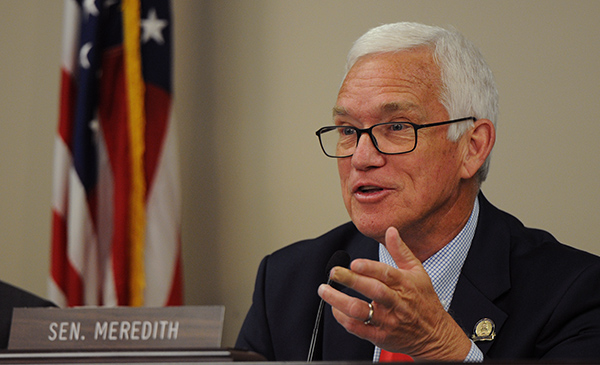
Sen. Stephen Meredith, R-Leitchfield, speaks about health care during Wednesday’s meeting of the Interim Joint Committee on Health Services. He is co-chair of the committee. A high-res photo may be found here.
FRANKFORT — The Interim Joint Committee on Health Services received updates from major health care groups Wednesday about COVID-19’s impact and workforce shortages in Kentucky.
Those representing the state’s Cabinet for Health and Family Services, the Kentucky Association of Health Care Facilities and Kentucky Center for Assisted Living, the Kentucky Nurses Association, and the Kentucky Medical Association testified. Legislators had a full gamut of questions following their presentations.
Committee members heard about a shortage of physicians and nurses in the state and how health groups plan to move forward regarding COVID-19.
Patrick T. Padgett, executive vice president for the Kentucky Medical Association, told legislators that between 2019 and 2022, Kentucky’s physician count fell from 10,592 to 10,002. This statistic is credited to the Kentucky Office of Rural Health’s 2022 Kentucky Physician Report.
“We lost 590 physicians out of the state at a time that we needed more physicians in the state. So that’s a big loss, and physicians not only treat patients and try to maintain their health and make them healthier and make them more productive, but they are an economic driver in the state,” he said.
According to a recent study of the American Medical Association, on average, physicians each bring about $1.9 million of economic activity to a region, Padgett said.
“So when we lost 590 physicians, Kentucky lost over $1 billion in economic impact,” he said.
Sen. Karen Berg, D-Louisville, is a physician who serves on the committee. She said prior authorization from insurance companies can be “out of control” because of administrative burdens. She also raised concerns that far too many medical students say they’re planning to leave Kentucky.
“These first- and second-year medical students, and I would say there’s at least 40 in the room when I’m talking, are telling me that under no circumstances are they planning on doing their residencies here in Kentucky. They are all planning on going away,” she said.
As is the case with physicians, the nursing field is experiencing shortfalls, testified Delanor Manson, chief executive officer of the Kentucky Nurses Association.
“Pre-pandemic, there was a nursing shortage. The pandemic did not cause the nursing shortage. On average, the Kentucky nurse is 53 years old. Nurses in the rest of the country are 42,” she said. “Things such as inflexible work schedules, unsafe work places, nurses being absent from decision-making in organizations, nurse retention and the image of nursing have played a part in the nursing shortage.”
In a separate presentation, officials from the Cabinet for Health and Family Services reported that COVID-19 statistics have changed over time, and the information will be studied for decades.
CHFS Secretary Eric Friedlander offered a brief critique of how the pandemic has been handled, and said it’s now moving to an endemic stage.
“There were good decisions made. There were bad decisions made, and we’re going to parse that out as folks examine what was effective, what wasn’t, what had an impact, what didn’t,” he said. “I promise you we were going with the best of our knowledge, and it changed over time.”
Sen. Stephen Meredith, R-Leitchfield, co-chair of the committee, asked Friedlander about the number of Medicaid recipients in Kentucky. He said he’s concerned about the program’s future cost.
“Let me put some historical perspective on this. In 2017, we had, I think, 1.4 million Medicaid recipients. The Medicaid budget was $10 billion. Going forward to this year, we’re at 1.7 million, $15 billion budget,” he said. “A lot of tremendous economic push and pull on this that I’m not sure we’ve factored in. We haven’t talked about the impact of inflation at all on this program.”
Sen. Shelley Funke Frommeyer, R-Alexandria, asked how people could be encouraged to transition to private plans so taxpayers aren’t covering their insurance.
“Is there something that we legislators can do to promote that gradual move off of Medicaid…” she said.
Friedlander said it’s an economic development question and getting people “living wage” jobs.
Veronica Judy-Cecil, deputy commissioner of CHFS’s Department for Medicaid Services, added that every Medicaid recipient has the opportunity to complete job training and they are connected to the Kentucky Education and Labor Cabinet
Legislators receive overview on juvenile justice disparities
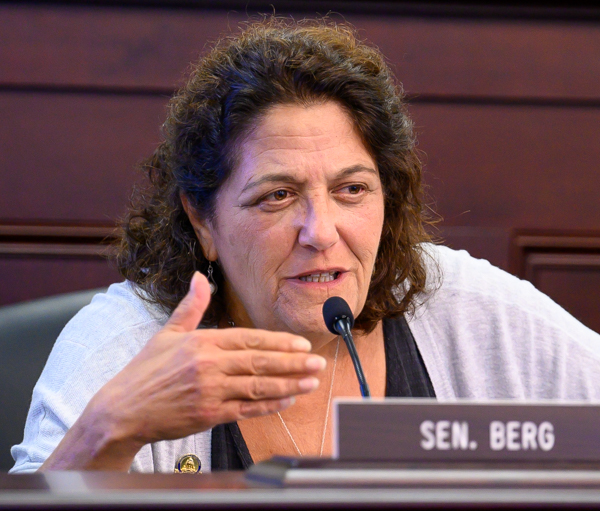
Note: Sen. Karen Berg, D-Louisville, speaks during Tuesday’s joint meeting of the Commission on Race and Access to Opportunity and the Juvenile Justice Oversight Council. A high-res version can be found here.
FRANKFORT — During Tuesday’s joint meeting of the Commission on Race and Access to Opportunity and the Juvenile Justice Oversight Council, legislators and others received an overview on disparities within Kentucky’s juvenile justice system.
Cortney Downs and Shannon Moody of Louisville-based Kentucky Youth Advocates presented statistics from the Kentucky Administrative Office of the Courts. The numbers touched on many topics, including racial disparities in criminal complaints, detention, diversion, and youthful offender referrals.
For instance, 22% of all complaints filed in 2022 were against Black youths, who only comprise about 11% of Kentucky’s juvenile population. Around 8% of all complaints were filed against multi-racial youths, who make up about 2% of the population.
Overall, about 69% of juvenile cases that were resolved in circuit court in 2022 involved youth of color, according to the statistics provided Tuesday.
Sen. Karen Berg, D-Louisville, said she was concerned about some of the numbers.
“I’m looking through some of the data and it is just, I mean I don’t even know what word to use to describe it,” she said. “It looks like on average Black kids are going to be arrested at twice the rate that they belong in the population. But then we have some counties here where it’s three or four times.”
Berg asked if those numbers are passed on to counties and if officials in those counties are aware that their rates are out of proportion to their population.
Rachel Bingham, director of the Office of Statewide Programs at the Administrative Office of the Courts, attended the meeting and answered questions. She said the information is provided to counties but cautioned that the number of cases varies between rural and urban communities.
“We provide this because it’s important for the community to know what is coming into the juvenile justice system and what those numbers look like,” Bingham said. “And you’re absolutely right that in some of the counties it is very concerning obviously to see.”
Senate Democratic Floor Leader Gerald A. Neal, R-Louisville, said he has a background as a juvenile probation officer and has worked extensively with juveniles in the legal field. He encouraged those at the meeting to be careful with the information that was shared and suggested they revisit the matter.
“Let me point out these judgments are subjective, and we can set objective criteria,” he said. “To make those judgments in various and varying circumstances is really subjective to a significant extent, and there’s an exception to everything anybody says in this room.”
Senate President Pro Tempore David P. Givens, R-Greensburg, asked Bingham if disabilities are considered in juvenile cases.
“You’re indicating that we’re still in the infancy of collecting and utilizing this information. Do judges use this as a consideration in the process today or not? If a young person appears before you as a judge and you know that that young person has a disability, is that influential or not,” he said.
Bingham answered yes – when the youth is before a judge. But she also noted that the level of information varies at other points of contact.
Kentucky Youth Advocates shared three recommendations with the commission and council.
They include expansion of the use of diversion, especially for young children and those who commit status and lower-level offenses, reduction of the use of county attorney and judicial overrides, and consideration the Tennessee model, the Second Look Commission.
Legislators debate penalties for selling drugs
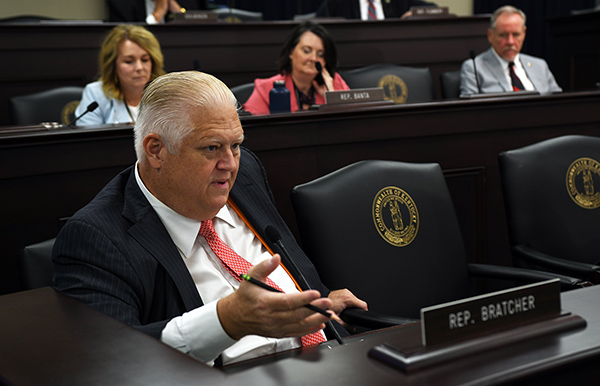
Note: A photo from Thursday's Interim Joint Committee on Judiciary meeting may be found be found here. It shows Rep. Kevin D. Bratcher, R-Louisville, asking a question.
FRANKFORT — The Interim Joint Committee on Judiciary heard testimony Thursday for and against legislation that would boost penalties for delivering, administering, distributing or selling controlled substances that result in an overdose death.
Rep. Deanna Frazier Gordon, R-Richmond, sponsored House Bill 388 during the 2023 Regular Session with Rep. Brandon Reed, R-Hodgenville. It would have allowed prosecutors to pursue murder charges in such cases. However, the measure remained in committee when the session ended.
"This is something that my constituents have been asking us for," she said. "We're not making good progress in the issues of opioid abuse and drug trafficking. Twenty other states in some way have enhanced their charges dealing in this area."
Rep. John Blanton, R-Salyersville, also testified in favor of the proposal, calling it an important tool to help law enforcement investigate drug crimes and root out "bad actors." Blanton, a former law enforcement officer, said he wished the law had been tougher in the 1990s.
"We're not interested in that user. We're interested in the dealer, the one that's putting the poison out on the street," he said. "The one that's killing our family members. And so this is another tool that will help law enforcement to get these people out of our communities and make it safer for our children, and our neighbors, and our communities."
Richmond Police Chief Rodney Richardson also testified in support. He told lawmakers that Madison County has suffered a high number of fatal overdoses in recent years. The county counted 85 in 2021, up from 68 the prior year, he said.
"One a week where we're finding people deceased, either in their homes, in parking lots, in tents on the side of the road, wherever we can find them," he said. "These are the ones that are reported to us."
Richardson said mothers have expressed frustration with way the department has handled their loved ones' cases.
However, Rep. Lindsey Burke, D-Lexington, said she has concerns about 18 to 21-year olds who have drug addiction problems and might face prison on a capital offense. She said she had friends and classmates who went down the wrong path, and some never recovered.
"When I think about the people who I knew and loved who were using and selling drugs, they were young people. They were young people who made big mistakes," she said.
B. Scott West, deputy public advocate for the Kentucky Department of Public Advocacy, spoke in opposition to the measure. He cited a report that found prosecution doesn't stop people from selling drugs, but "chills" Good Samaritan laws.
"What this study finds is that the threat of criminal prosecution for murder, or lesser degrees of murder, are a chill effect and can actually lead to people walking away," he said.
Rep. Kevin D. Bratcher, R-Louisville, asked a rhetorical question about how much money federal, state and local governments have spent on the efforts. He also asked Thursday's presenters how effective drug reduction efforts have been.
"We've been talking about this stuff for 23 years, at least. And here we are again, and guys come in and they say this is a tool that we need. And it's just like a revolving cycle of what needs to be done," he said.
Richardson said the county coroner supplies the police department with different types of statistics. So far this year, the county has experienced 22 overdose deaths, and Richardson projected that the number would exceed 50 this year.
"We're on an uptick, so it's told me basically that we're increasing our numbers," he said.
Maj. Josh Hale of the Richmond Police Department, who also testified, said the money spent is worth it.
"I don't think we're ever going to be wasting time if we're talking about victims and families," he said.
Interim joint committee meetings begin in June
FRANKFORT — The first week of committee meetings of the 2023 interim period begin June 5 for Kentucky lawmakers.
An interim joint committee is composed of all members of a Senate standing committee and all members of a House standing committee. Interim joint committees meet between sessions as a subcommittee of the Legislative Research Commission. Statutory and special committees may also meet during the interim period.
For the full 2023 interim calendar, visit https://legislature.ky.gov/Documents/2023%20Interim%20Calendar.pdf. Please note, the calendar is subject to change.
Unless otherwise indicated on the calendar, most interim joint, statutory and special committee meetings are scheduled to take place in the Capitol Annex building in Frankfort.
Livestreams of the committee meetings will be provided by Kentucky Educational Television (KET) and the Legislative Research Commission. For links to the livestreams, go to https://legislature.ky.gov/Public%20Services/PIO/Pages/Live-Streams.aspx.
Each week, the legislative calendar on the Legislative Research Commission website will be updated with information on which committees are meeting for the week. The calendar is available at https://apps.legislature.ky.gov/LegislativeCalendar
For more information on interim joint committees, visit https://legislature.ky.gov/Committees/interim-joint-committee.
For more information on statutory committees, visit https://legislature.ky.gov/Committees/statutory-committee.
For more information on special committees, visit https://legislature.ky.gov/Committees/special-committee.
To view materials such as info sheets, handouts and PowerPoint presentations that are compiled for lawmakers to review at committee meetings, click on the "Meeting Materials" tab on the left side of each committee's page. Meeting agendas are also posted on this page.
To share feedback on an issue with lawmakers, call the General Assembly's Message Line at 1-800-372-7181. Kentuckians with hearing loss can use Kentucky Relay by dialing 7-1-1.
To directly reach a lawmaker's office, call 502-564-8100. An operator will transfer the call to the office of the lawmaker you want to reach.
If you have a question about the lawmaking process or legislative resources, the LRC Public Information can be reached by calling 502-564-8100 ext. 59105.
Juvenile Justice Oversight Council holds first interim meeting
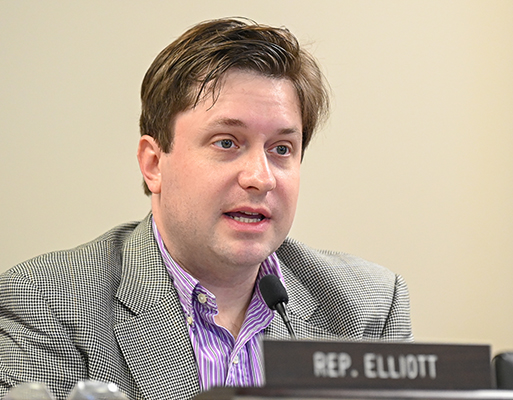
A high resolution photo from Friday's Juvenile Justice Oversight Council meeting can be found here. It shows council co-chair Rep. Daniel Elliott, R-Danville, leading the meeting.
FRANKFORT — The Kentucky General Assembly continues to monitor Kentucky's juvenile justice system following the 2023 legislative session.
The Juvenile Justice Oversight Council held its first meeting of the 2023 interim period on Friday. The council is co-chaired by Sen. Whitney Westerfield, R-Fruit Hill, and Rep. Daniel Elliott, R-Danville. The other legislators on the council are Sen. Danny Carroll, R-Benton; Sen. Robin L. Webb, D-Grayson; Rep. Kevin D. Bratcher, R-Louisville; and Rep. Keturah Herron, D-Louisville.
The council also features 12 non-legislator members who represent different areas of the juvenile justice system and state government. A full list of the council's members is available at https://legislature.ky.gov/Committees/Pages/Committee-Details.aspx?CommitteeRSN=414&CommitteeType=Statutory%20Committee
The Juvenile Justice Oversight Council is a statutory committee that will meet at least once a month in 2023 to provide an independent review of the state juvenile justice system and provide recommendations to the legislature, Elliott said.
The council will actively review the implementation of all juvenile justice reforms enacted by the General Assembly, collect and review performance measurement data, and continue to review the juvenile justice system for changes that improve public safety, hold youth accountable, provide better outcomes for children and families, and control juvenile justice costs, Elliott added.
On Friday, the council heard an update on the Department of Juvenile Justice from Kerry Harvey, secretary of the Kentucky Justice and Public Safety Cabinet, and Department of Juvenile Justice Commissioner Vicki Reed. Harvey and Reed also serve on the council.
In the 2023 legislative session, lawmakers approved legislation geared toward making Kentucky's juvenile justice system safer for offenders and staff while also ensuring the physical and mental wellbeing of juvenile offenders in the system.
House Bill 3 requires that juveniles charged with a violent felony offense be detained up to 48 hours pending a detention hearing with a judge, beginning July 1, 2024. The bill also seeks to improve parent accountability, expand mental health interventions and enhance options for restorative justice. Other provisions will reopen the Jefferson County Youth Detention Center.
Senate Bill 162 places all eight of Kentucky's juvenile detention centers under one office with a lead supervisor who reports directly the commissioner. Among many other changes, the bill seeks to increase staffing and training, enhance mental health interventions, and provide better segregation of violent offenders.
Harvey said the department is already working on implementing the new requirements. For example, detention center officers are now provided with pepper spray and tasers in the event of a violent incident.
"I do want you to know that we take very seriously our obligation to implement the legislative changes that were made in this session," Harvey said.
The council spent two hours discussing the many challenges facing Kentucky's juvenile justice system. Lawmakers asked Harvey, Reed and other state officials to continue communicating with them on the needs of the department.
"The relationship that we developed in working through these issues – the bills that passed – we need to build on that, and there needs to be a trust there," Carroll said.
The next Juvenile Justice Oversight Council meeting will be a joint meeting with the Commission on Race and Access to Opportunity on June 20 at 1 p.m.
For more information, visit legislature.ky.gov.
This Week at the State Capitol
Short but active session adjourns after lawmakers pass bills on cannabis and sports betting
Despite maintenance to the dome, the Kentucky Capitol remained illuminated in Frankfort Thursday night. A high resolution photo is available here.
FRANKFORT — While the 2023 legislative session may have opened to tempered expectations in January, it gaveled to a close this week with a stack of major bills in the books, including two breakout measures on medicinal cannabis and sports wagering that both passed in the final hours.
Lawmakers returned to Frankfort on Wednesday for the last two days of the short, 30-day session and, in a marathon of proceedings, overrode more than a dozen vetoes from the governor.
They also wrapped up an historic impeachment trial against a Kentucky prosecutor, honored the victims of the deadly helicopter crash near Fort Campbell, and passed another volley of bills before adjourning sine die late Thursday night.
Overall, close to 175 measures earned a final tap of the gavel this year, including more than 40 that carried support on the last day. Many have already become law.
Legislation on medicinal cannabis is one of the most noteworthy thanks to its long and rocky path to victory. Lawmakers have debated the concept of medical marijuana for more than a decade in Kentucky, and even though proposals have won favor in the House in recent years, they have failed to get much traction in the Senate.
Supporters broadened the appeal this year by proposing additional safeguards against abuse.
The measure, Senate Bill 47, establishes a framework for the state Cabinet for Health and Family Services to oversee and regulate a medicinal cannabis program, starting in January 2025. That includes special permits and licenses for cultivators, prescribers and dispensaries.
SB 47 allows cannabis use for those suffering with cancer, chronic and other types of pain, epilepsy, multiple sclerosis, muscle spasms, chronic nausea or post-traumatic stress disorder. Patients who are over 21 could vape the substance, but smoking would remain illegal.
The House approved the legislation with a 66-33 vote Thursday, and the governor signed it into law Friday morning. The Senate passed the bill with a 26-11 vote earlier this month.
The measure on sports wagering also marked a significant shift in the General Assembly.
House Bill 551 creates a structure to legalize, regulate and tax sports wagering in Kentucky under the auspices of the Kentucky Horse Racing Commission. Only licensed tracks would be permitted to obtain a sports wagering license, and the bill sets up a fund to address problem gambling. It also prohibits minors from placing wagers.
Officials estimate that the wagering marketplace will generate about $23 million in new tax revenue for the state, much of which will benefit Kentucky's troubled public pensions, according to supporters.
The bill cleared the Senate floor on a 25-12 vote Thursday and received the governor's signature Friday morning. It passed out of the House earlier this month on a 63-34 vote.
Both measures were among a list of substantial bills that won approval this year despite a relatively slow start to the session.
Over the 30 days, lawmakers also passed a major package on juvenile justice, a ban on gray machines and a battalion of bills on public schools, some of which spurred intense deliberations.
Many will remember the session for Senate Bill 150, which focuses on health services and school policies related to gender and human sexuality. The legislation commanded headlines throughout most of the session and stirred another round of fierce debate Wednesday as lawmakers overrode a veto on the bill.
But many other bills found bipartisan support, including legislation to regulate delta-8 THC, efforts to expand the workforce and a measure to crack down on hazing.
Here's a final look at some of the major bills that won passage this year:
Autonomous Vehicles: House Bill 135 would provide a legal framework for the use of fully autonomous vehicles in Kentucky. The measure has been sent to the governor.
Biomarker Testing: House Bill 180 requires health benefit plans to cover biomarker testing for patients who have been diagnosed with cancer and other diseases. The governor signed this bill into law.
Bourbon Barrel Tax: House Bill 5 would, over a 20-year period, phase out the property taxes on distilled spirts that are warehoused in Kentucky. The taxes are paid to state and local taxing districts, and the bill includes some protections for public schools and local governments that use the revenue. HB 5 has been signed by the governor.
Charles Young Corridor: Senate Joint Resolution 58 calls for the area from Camp Nelson in Jessamine County to the Kentucky and Ohio border at Mays Lick, Kentucky, to be designated as the Brigadier General Charles Young Memorial Historical Corridor. The governor signed this resolution.
Child Abuse: Senate Bill 229 seeks to ensure that law enforcement, social services and other authorities are properly notified and communicating in cases of child abuse. It also requires agencies under investigation to cooperate with authorities. The governor signed this bill into law.
Child Murder: House Bill 249 makes the intentional killing of a child under age 12 an aggravating circumstance. That ensures that a person who is guilty of killing a child would either be subject to life in prison without parole or the death penalty. The governor signed this bill into law.
Coal Power: Senate Bill 4 requires utility companies to receive permission from the Kentucky Public Service Commission before retiring a fossil fuel-fired electric generating unit. A unit cannot be retired if the move would compromise the quality of service to customers or negatively impact the electric grid. SB 4 became law without the governor's signature.
Delta-8 THC: House Bill 544 directs the state Cabinet for Health and Family Services to establish regulations related to delta-8 THC by Aug. 1. That includes product testing and labeling along with prohibitions on the sale of delta-8 products to people under age 21. The governor signed this bill into law.
DUI Restitution: Senate Bill 268 would allow courts to order restitution for children whose parents are killed or permanently disabled by an intoxicated driver. This bill has been delivered to the governor.
ESG Investing: House Bill 236 requires that the state's public pension investments be based on financial risks and returns and not on environmental, social and governance factors, commonly known as ESG. The governor signed this bill into law.
Federal Firearms Bans: House Bill 153 prohibits state and local law enforcement agencies and other public officials from enforcing any federal firearm bans or regulations enacted after Jan. 1, 2021. Violators could be charged with a misdemeanor and face termination from their job. HB 153 became law without the governor's signature.
Fentanyl Test Strips: House Bill 353 would remove fentanyl test strips from state prohibitions on drug paraphernalia unless the strips are used in the manufacture or selling of the drug. This bill was sent the governor.
Gender and Sexuality: Senate Bill 150 is a wide-ranging bill focused on health services and school policies related to gender and human sexuality. Among many provisions, the legislation bans puberty blockers, hormones and surgeries for transgender minors. SB 150 also calls for greater parental communication and consent on how schools approach gender and sexuality with students. It prohibits instruction on human sexuality in elementary school and requires written parental consent for teaching the subject in later grades. Other instruction on exploring gender identity or sexual orientation is not allowed at any grade level. The governor vetoed this bill, but lawmakers overrode the veto.
Gray Machines: House Bill 594 clarifies that certain gambling machines, often called "gray machines" or "skill games," are illegal in Kentucky. The devices are called gray machines because they have operated in gray area in the state's gambling laws while growing more prevalent at gas stations and convenience stores over the past two years. Anyone who manages or owns the machines would be subject to a $25,000 fine per device. The governor has signed HB 594 into law.
Hazing: Senate Bill 9, known as "Lofton's Law," would elevate reckless or dangerous acts of hazing to a crime. First-degree hazing would qualify as a Class D felony, while second-degree hazing would be a Class A misdemeanor. The governor signed this bill into law.
Health Care Workers: House Bill 200 aims to address a shortage in health care workers by creating the Kentucky Health Care Workforce Investment Fund. It will use both public and private money to increase scholarship opportunities in the field. The governor signed HB 200 into law.
Incest: House Bill 78 more narrowly defines Kentucky's incest laws by prohibiting a person from having sexual intercourse with his or her parent, child, grandparent, grandchild, uncle, aunt, nephew, niece, brother, sister or ancestor or descendant. This bill was signed into law by the governor.
Juvenile Detention: House Bill 3 requires that juveniles charged a violent felony offense be detained up to 48 hours pending a detention hearing with a judge, beginning July 1, 2024. The bill also seeks to improve parent accountability, expand mental health interventions and enhance options for restorative justice. Other provisions will reopen the Jefferson County Youth Detention Center. The governor signed this bill into law.
Juvenile Justice Reform: Senate Bill 162 will place all eight of Kentucky's juvenile detention centers under one office with a lead supervisor who reports directly the commissioner. Among many other changes, the bill seeks to increase staffing and training, enhance mental health interventions, and provide better segregation of violent offenders. SB 162 was signed into law by the governor.
KEES for Workforce Training: Senate Bill 54 allows students to use a Kentucky Educational Excellence Scholarship to attend certain propriety school programs and workforce training programs that are focused on high-demand work sectors. Students could also use KEES funds at an eligible college of art and design. The governor signed this bill into law.
Literacy Center: Senate Bill 156 establishes a statewide reading research center for research on early reading models, instructional resources and evidence-based reading practices. The legislation builds on last year's Read to Succeed Act, a comprehensive effort to improve early literacy outcomes in Kentucky. The governor signed this bill into law.
Motor Vehicle Racing: Senate Bill 96 would set up a framework for local governments to grant permits for motor vehicle racing events as long as conditions are met on insurance, security and emergency services. It would also allow local governments to temporarily close roadways and waive traffic regulations for the events. SB 96 has been sent to the governor.
Physician Wellness: Senate Bill 12 will allow physicians to participate in wellness and career fatigue programs without disclosing their participation to employers. Supporters say it will help physicians deal with job-related burnout without fear of retaliation. The bill was signed by the governor.
Police Wellness: House Bill 207 would allow law enforcement agencies to provide confidential wellness programs to support employee mental health. Specifically, it would shield records of a wellness program from subpoenas and open records requests. The bill has been sent to the governor.
Postpartum Depression: Senate Bill 135 calls on the state Cabinet for Health and Family Services to create a panel focused on perinatal mental health disorders and provide related information and assessment tools online. The governor signed this bill into law.
Public Employee Payroll Deductions: Senate Bill 7 will cease most automatic payroll deductions that public employees might use for paying union dues or dues to other organizations. The governor vetoed this bill, but lawmakers overrode the veto.
Religious Freedom in Schools: House Bill 547 codifies religious freedoms for public school teachers, faculty and staff, including the right to engage in religious expression and prayer during breaks and to display religious items in personal spaces. The governor signed this bill into law.
School Materials: Senate Bill 5 calls on local school boards to create a process for reviewing and resolving parental objections over sexually explicit materials in public schools. This bill became law without the governor's signature.
School Staffing: House Bill 32 allows school districts to hire classified personnel, such as cafeteria workers and bus drivers, without a high school diploma or GED. The school district must provide those employees an opportunity obtain a GED or earn relevant licenses or credentials at no cost. The governor signed this bill into law.
Sex Offenders: Senate Bill 80 prohibits registered sex offenders from loitering or operating a mobile business within 1,000 feet of schools, daycares, and public playgrounds or swimming pools. The governor signed this bill into law.
State Education Commissioner: Under Senate Bill 107, the state education commissioner will be subject to Senate confirmation before taking office. The bill also sets a four-year term for the position. The governor vetoed this bill, but lawmakers overrode the veto.
Student Discipline: Under House Bill 538, school boards are required to adopt policies related to expelling students who pose a threat to the safety and wellbeing of others and disciplining students who have physically assaulted, battered or abused personnel or other students off school property — if the incident is likely to disrupt the educational process. HB 538 also provides more flexibility to place students into alternative learning programs. The governor signed this bill into law.
Taxes: House Bill 1 is part of a broad, multi-year effort to gradually reduce and eliminate income taxes while also expanding the overall tax base. It would reduce state income taxes from 4.5% to 4% at the start of 2024 and codify a reduction from 5% to 4.5% that took effect earlier this year. The governor signed this bill into law.
Teacher Shortages: House Bill 319 aims to ease teacher shortages by cementing Kentucky's place in the Interstate Teacher Mobility Contract if created. The bill also requires the Kentucky Department of Education to establish a statewide job posting system. The bill has been sent to the governor.
TikTok Ban: Senate Bill 20 bans nearly all employees in the state executive and legislative branches from using the social media app TikTok on government-owned networks and devices. The app — owned by the Chinese company ByteDance — is considered a threat to the state's data security. The governor signed this bill into law.
Tracking Devices: Senate Bill 199 would, with some exceptions, outlaw the installation of tracking devices on motor vehicles without the consent of the vehicle owner or lessee. The bill has been delivered to the governor.
Unemployment Insurance: House Bill 146 makes technical updates to an overhaul of unemployment insurance that lawmakers passed last year. Among the changes, the measure sets the minimum duration of benefits to 16 weeks, instead of 12, and calls on state unemployment officials to advise claimants on educational and training opportunities. The governor signed this bill into law.
Vehicular Homicide: House Bill 262 adds the crime of vehicular homicide to state statutes. A person would be guilty of vehicular homicide, a class B felony, if they cause a death while operating a motor vehicle impaired. The governor signed this bill into law.
Most bills will take effect 90 days after passage unless they contain emergency clauses or special effective dates. Kentuckians can learn more about these bills and many others by visiting the Legislative Record webpage.
Citizens can also share their views on issues with lawmakers by calling the General Assembly's toll-free message line at 1-800-372-7181.
The Kentucky General Assembly will gavel back in for a 60-day legislative session on Jan. 2, 2024
Senate passes sports wagering bill on last session day
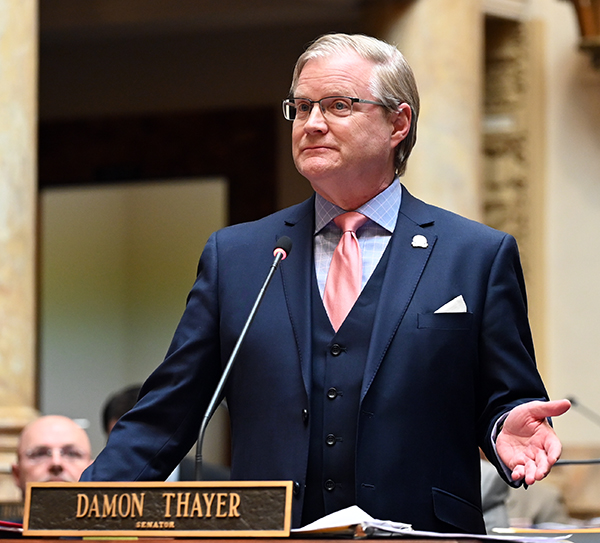
Senate Majority Floor Leader Damon Thayer, R-Georgetown, speaks on House Bill 551. The measure would legalize sports wagering in Kentucky. A photo from today's Senate proceedings can be found here.
FRANKFORT — Every coin has two sides, and so it was with the opinions of Kentucky lawmakers in the Senate on Thursday after they passed legislation that would create a legal marketplace for sports wagering and establish a fund for regulation of the industry.
House Bill 551, sponsored by Rep. Michael Meredith, R-Oakland, and introduced on the Senate floor by Senate Majority Floor Leader Damon Thayer, R-Georgetown, would also establish a fund for problem gambling, and much of the tax revenue would benefit Kentucky's pension fund.
The legislation would also make the Kentucky Horse Racing Commission the exclusive regulator of sports wagering with exclusive jurisdiction over wagering and licensing
"We are a sports crazy state — we love our sports in the Commonwealth," Thayer said. "And people want to be able to make the choice of their own free will to make a wager on a sports event like almost all of our surrounding states."
He said six states that border Kentucky have already legalized sports betting, and Missouri is in the process of doing so. Forty-six counties in Kentucky have a border state, and several thousand people regularly drive to Ohio, Indiana and Tennessee to make legal sports wagers, he added.
Thayer pointed to a fiscal analysis of the bill indicating that sports wagering would raise $23 million annually for the state general fund. However, Thayer said he thinks that number is low.
"We know that quantitatively, and we know qualitatively because we hear the stories about people driving across the river in Cincinnati and Louisville to make online wagers or brick and mortar sportsbook wagers in our surrounding states," he said. "Our nine racetracks would be the brick and mortar locations. This follows the trend in other states where brick and mortar locations are located at racetracks, casinos, and occasionally professional sports franchises."
Before accessing the product, patients would have to register and receive approval for a special identification card. Patients under 18 years old would not be allowed to possess, purchase or acquire medicinal cannabis without the assistance of a designated caregiver.
The measure cleared the Senate floor on a 25-12 vote and now heads to the governor's desk. It passed out of the House earlier this month on a 63-34 vote.
Sen. Whitney Westerfield, R-Fruit Hill, said he's against the legislation because the outcomes can badly damage people and families.
"I've heard all of you at one point or another on the floor and committee talking about how you want to provide for the least of these. You want to look out for people that are in need, you want to protect the people who can be harmed," he said.
Westerfield said some families only have a specific amount of disposable income.
"And whatever money is spent on that app gambling on whatever sport you want to bet on is money that's not spent in a church offering plate, that's not spent on a United Way campaign, that's not spent on a nonprofit that needs you," he said.
Sen. Jimmy Higdon, R-Lebanon, also opposed the bill.
"I made a promise to my constituents when I ran that the only way I would vote for gambling would be on a constitutional amendment. Kentucky's constitution only allows three types of gambling — lottery, charitable gaming, and pari-mutuel. And this doesn't fit in any of those categories," he said.
Sen. Gex Williams, R-Verona, voted for the measure even though he said he has spoken to many friends who are against it.
"I can't take responsibility for everybody in this state on their wagering," he said. "However, what I assured them was I would make sure there is a fund… for problem gamblers and that we would monitor that to make sure it is sufficient for what we need to do and that it is going to the right people."
Senate Minority Whip David Yates, D-Louisville, also voted in favor of the measure, citing less government intrusion in his constituents' lives.
"They wanted sports wagering. They wanted the ability to be able to make a bet legally. And I say 'legally' because a lot of people were already making the bets on their phone. They were already doing it," he said. "…What does work is a calculated, intelligent regulation and oversight, and I think this bill does that."
Kentucky General Assembly sends medicinal cannabis bill to governor's desk
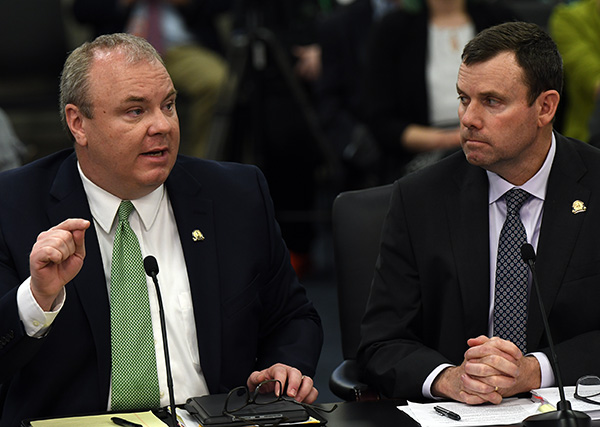
House Majority Whip Jason Nemes, R-Louisville, (left) and Sen. Stephen West, R-Paris, presents Senate Bill 47, a bill to legalize medicinal cannabis, before the House Licensing, Occupations and Administrative Regulations Committee. A high-res version can be found here.
FRANKFORT —The Kentucky House of Representatives gave final passage to a bipartisan bill to legalize medicinal cannabis in the Commonwealth on Thursday.
Senate Bill 47 will now go to Gov. Andy Beshear's desk for his signature or veto. The House approved the legislation with a 66-33 vote. It passed the Senate with a 26-11 vote earlier this month.
House Majority Whip Jason Nemes, R-Louisville, carried SB 47 in the House on behalf of the bill's primary sponsor, Sen. Stephen West, R-Paris.
"First of all, I want to note that this is a no smoke bill, no self-grow," Nemes said on the House floor.
SB 47 establishes a framework for the Cabinet of Health and Family Services to regulate the cultivation and distribution of medicinal cannabis, or medical marijuana, in the Commonwealth. One provision of the bill makes it illegal for medicinal cannabis users to smoke the substance, but vaping would be allowed for users over the age of 21.
Under SB 47, individuals diagnosed with cancer, multiple sclerosis, epilepsy, chronic pain, muscle spasms, chronic nausea or cyclical vomiting syndrome and post-traumatic stress disorder could receive prescriptions for medicinal cannabis. The bill also permits the Kentucky Center for Cannabis Research to add medical conditions and diseases to the list.
Additionally, those seeking to cultivate marijuana for medicinal purposes must obtain special permits. Doctors and nurse practitioners would also need a special license to prescribe, and dispensaries would need a special license to distribute.
Nemes said fiscal courts can vote to opt counties out of allowing distribution of medicinal cannabis. Minors could receive prescriptions for cannabis, but caretakers would be responsible for managing and administering the prescription, he added.
On the House floor, several lawmakers spoke against the bill.
Rep. Shane Baker, R-Somerset, attempted to pass a floor amendment to more narrowly tailor some of the provisions in the bill, including removing all stages of cancer, PTSD and muscle spasms from the list of conditions.
Baker's amendment failed, and he urged his fellow lawmakers to vote against SB 47.
"We all agree urban and rural, wherever you are across the Commonwealth, we have a drug issue, and this will adversely affect the people of our communities, including our young people," Baker said.
Rep. Matt Lockett, R-Nicholasville, also shared his concerns with SB 47 on the House floor. He said he was in favor of Baker's amendment and that SB 47 in its current form "has a lot of flaws."
"I really, really wanted to get to a 'yes' because I think this has a lot of merit … and I think as a body it's our duty that the laws that we pass are the best form of that law that we can get," Lockett said.
Rep. Daniel Grossberg, D-Louisville, was one of several lawmakers who spoke in favor of SB 47.
"The legalization of medical marijuana could be an economic boon to Kentucky," he said. "It would create jobs in the cannabis industry and generate tax revenue for our state. We have an opportunity to be at the forefront of this growing industry, and we shouldn't let it pass us by."
Rep. Mark Hart, R-Falmouth, said he is not in favor of recreational marijuana, but he is in favor of SB 47.
"I do think it's time that we give people with medical conditions that can get relief by using this substance the opportunity to do it legally," Hart said.
If the governor signs SB 47 into law, it will not go into effect until Jan. 1, 2025.
This Week at the State Capitol
A wave of legislation receives final passage before lawmakers recess for vetoes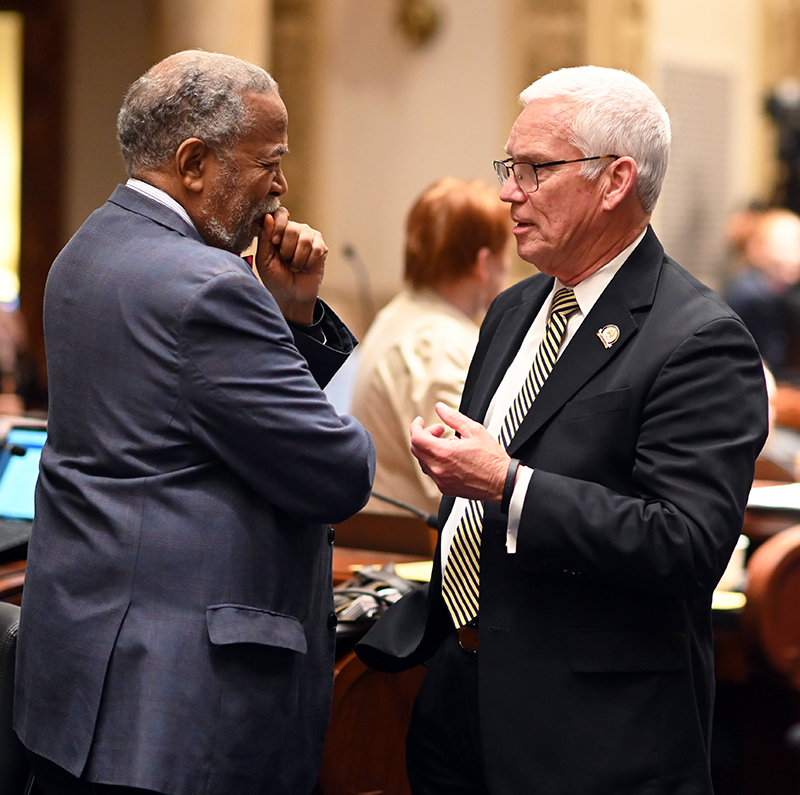
A photo from the state Capitol this week is available here. It shows Senate Minority Floor Leader Gerald A. Neal, D-Louisville, (left) speaking with Sen. Stephen Meredith, R-Leitchfield, on the Senate floor.
FRANKFORT — Lawmakers often compare the chambers of the House or Senate to an arena. They sometimes quote Theodore Roosevelt's famous passage about faces "marred by dust and sweat."
If ever a week in the General Assembly proved those sentiments correct, it was the one that wrapped up late Thursday night when the legislature gaveled out for a 10-day veto recess.
The last full week of the 2023 Regular Session was ablaze with electric oratory and raw debates as lawmakers hotfooted from committee to caucus to chamber — all in a four-day sprint to get bills to the governor's desk.
Throughout the late nights and early mornings, legislators sparred over education, gender identity, parental rights, firearms, marijuana, gambling and coal. They pondered the relationship between state and federal government. They recited scripture from both sides of the political aisle.
By midnight Thursday, more than 120 bills had received final passage and were sent to the governor, including a full slate of bills on public schools.
The most prominent and contested of those was Senate Bill 150, a wide-ranging bill focused on health services and school policies related to gender and human sexuality. Among many provisions, the legislation would ban puberty blockers, hormones and surgeries for transgender minors.
SB 150 also calls for greater parental communication and consent on how schools approach gender and sexuality with students. It would prohibit instruction on human sexuality in elementary school and would require written parental consent for teaching the subject in later grades. Other instruction on exploring gender identity or sexual orientation would not be allowed at any grade level.
The legislation, versions of which appeared in different bills this week, sparked long and impassioned debates in both chambers, along with another measure — Senate Bill 5 — that calls on local school boards to create a process for reviewing and resolving parental objections over sexually explicit materials in public schools.
Both SB 150 and SB 5 were sent to the governor on Thursday.
Education has remained at the forefront this session, and other bills on student discipline, religious freedom in schools and school staffing received a final nod this week with varying degrees of support.
Lawmakers were more united on a different matter related to minors — a comprehensive overhaul of Kentucky's troubled juvenile justice system.
Senate Bill 162 would place all eight of Kentucky's juvenile detention centers under one office with a lead supervisor who reports directly the commissioner. Among many other changes, the bill seeks to increase staffing and training, enhance mental health interventions, and provide better segregation of violent offenders.
SB 162 was the result of special work group that lawmakers formed earlier this year following reports of problems in the state Department of Juvenile Justice. The measure cleared both chambers with unanimous support on Thursday, and supporters said it marks the beginning of a larger revamp.
Bipartisan consensus is also emerging on legislation related to medicinal cannabis that could potentially break a long-standing impasse in the legislature.
Senate Bill 47 calls on the state Cabinet for Health and Family Services to implement, oversee and regulate a medicinal cannabis program, starting in January 2025. It would allow cannabis use for those suffering with cancer, chronic and other types of pain, epilepsy, multiple sclerosis, muscle spasms, chronic nausea or post-traumatic stress disorder.
The Senate advanced the legislation off the floor on Thursday, marking newfound support for the concept in that chamber. The bill now heads to the House where medicinal cannabis has won more favor in recent years.
Lawmakers are saving two legislative days at the end of March to override any vetoes and close out any unfinished business. After a bill receives final passage, the governor has 10 days to sign it, issue a veto or allow the legislation to become law without his signature.
Here are some of the bills that received a final vote before the legislature adjourned on Thursday.
Biomarker Testing: House Bill 180 would require health benefit plans to cover biomarker testing for patients who have been diagnosed with cancer and other diseases.
Child Abuse: Senate Bill 229 seeks to ensure that law enforcement, social services and other authorities are properly notified and communicating in cases of child abuse. It would also require agencies under investigation to cooperate with authorities.
Child Murder: House Bill 249 would make the intentional killing of a child under 12 an aggravating circumstance. That would ensure that a person who is guilty of killing a child would either be subject to life in prison without parole or the death penalty.
Coal Power: Senate Bill 4 would require utility companies to receive permission from the Kentucky Public Service Commission before retiring a fossil fuel-fired electric generating unit. The unit could not be retired if the move would compromise the quality of service to customers or negatively impact the electric grid.
Delta-8 THC: House Bill 544 would direct the state Cabinet for Health and Family Services to establish regulations related to delta-8 THC by Aug. 1. That would include product testing and labeling along with prohibitions on the sale of delta-8 products to people under age 21.
ESG Investing: House Bill 236 would require that the state's public pension investments be based on financial risks and returns and not on environmental, social and governance factors, commonly known as ESG.
Federal Firearms Bans: House Bill 153 would prohibit state and local law enforcement agencies and other public officials from enforcing any federal firearm bans or regulations enacted after Jan. 1, 2021. Violators could be charged with a misdemeanor and face termination from their job.
Gray Machines: House Bill 594 clarifies that certain gambling machines, often called "gray machines" or "skill games," are illegal in Kentucky. The devices are called gray machines because they have operated in gray area in the state's gambling laws while growing more prevalent at gas stations and convenience stores over the past two years. Anyone who manages or owns the machines would be subject to a $25,000 fine per device. The governor signed HB 594 on Thursday.
Hazing: Senate Bill 9, known as "Lofton's Law," would elevate reckless or dangerous acts of hazing to a crime. First-degree hazing would qualify as a Class D felony, while second-degree hazing would be a Class A misdemeanor.
Health Care Workers: House Bill 200 aims to address a shortage in health care workers by creating the Kentucky Health Care Workforce Investment Fund. It would use both public and private money to increase scholarship opportunities in the field.
Incest: House Bill 78 would more narrowly define Kentucky's incest laws by prohibiting a person from having sexual intercourse with his or her parent, child, grandparent, grandchild, uncle, aunt, nephew, niece, brother, sister or ancestor or descendant.
Juvenile Detention: House Bill 3 would require that juveniles charged a violent felony offense be detained up to 48 hours pending a detention hearing with a judge beginning July 1, 2024. The bill also seeks to improve parent accountability, expand mental health interventions and enhance options for restorative justice. Other provisions would reopen the Jefferson County Youth Detention Center.
KEES for Workforce Training: Senate Bill 54 would allow students to use a Kentucky Educational Excellence Scholarship to attend certain propriety school programs and workforce training programs that are focused on high-demand work sectors. Students could also use KEES funds at an eligible college of art and design.
Literacy Center: Senate Bill 156 would establish a statewide reading research center for research on early reading models, instructional resources and evidence-based reading practices. The legislation builds on last year's Read to Succeed Act, a comprehensive effort to improve early literacy outcomes in Kentucky.
Physician Wellness: Senate Bill 12 would allow physicians to participate in wellness and career fatigue programs without disclosing their participation to employers. Supporters say it will help physicians deal with job-related burnout without fear of retaliation. The bill was signed by the governor on Friday.
Postpartum Depression: Senate Bill 135 calls on the state Cabinet for Health and Family Services to create a panel focused on perinatal mental health disorders and provide related information and assessment tools online.
Postsecondary Education Study: Senate Joint Resolution 98 would direct the state Council on Postsecondary Education to study the placement and services of public colleges and universities in Kentucky.
Public Employee Payroll Deductions: Senate Bill 7 would cease most automatic payroll deductions that public employees might use for paying union dues or dues to other organizations.
Religious Freedom in Schools: House Bill 547 would codify religious freedoms for public school teachers, faculty and staff, including the right to engage in religious expression and prayer during breaks and to display religious items in personal spaces.
School Staffing: House Bill 32 would allow school districts to hire classified personnel, such as cafeteria workers and bus drivers, without a high school diploma or GED. The school district must provide those employees an opportunity obtain a GED or earn relevant licenses or credentials at no cost.
Sex Offenders: Senate Bill 80 would prohibit registered sex offenders from loitering or operating a mobile business within 1,000 feet of schools, daycares, and public playgrounds or swimming pools.
State Education Commissioner: Under Senate Bill 107, the state education commissioner would be subject to Senate confirmation before taking office. The bill also sets a four-year term for the position.
Student Discipline: Under House Bill 538, school boards would be required to adopt policies related to expelling students who pose a threat to the safety and wellbeing of others and disciplining students who have physically assaulted, battered or abused personnel or other students off school property — if the incident is likely to disrupt the educational process. It would also provide more flexibility to place students into alternative learning programs.
TikTok Ban: Senate Bill 20 would ban nearly all employees in the state executive and legislative branches from using the social media app TikTok on government-owned networks and devices. The app — owned by the Chinese company ByteDance — is considered a threat to the state's data security.
Unemployment Insurance: House Bill 146 would make technical updates to an overhaul of unemployment insurance that lawmakers passed last year. Among the changes, the measure sets the minimum duration of benefits to 16 weeks, instead of 12, and calls on state unemployment officials to advise claimants on educational and training opportunities.
Lawmakers are scheduled to return to Frankfort on March 29 for day 29 of the 30-day session.
Kentuckians can track the action through the Legislative Record webpage, which allows users to follow a bill's progression through the chambers.
Citizens can also share their views on issues with lawmakers by calling the General Assembly's toll-free message line at 1-800-372-7181.
Medicinal cannabis bill makes history after several attempts to gain approval
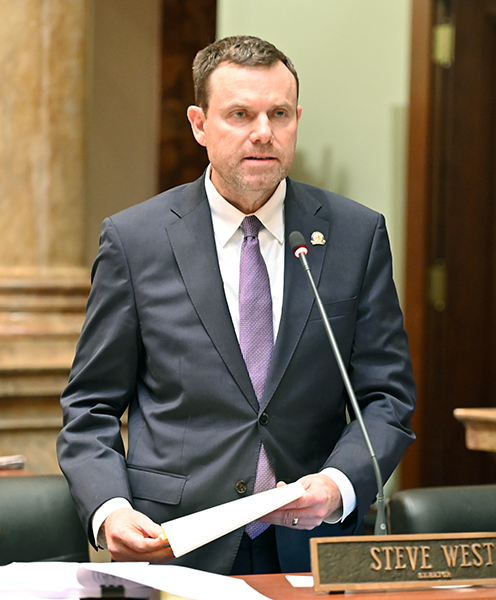
Sen. Stephen West, R-Paris, speaks on the Senate floor. A high-res version can be found here.
FRANKFORT — After failing to gain much support in the Senate in past years, a medical cannabis bill won approval on the chamber floor Thursday.
Senate Bill 47 calls on the state Cabinet for Health and Family Services to implement, oversee and regulate a medicinal cannabis program, which would be clear to launch in January 2025.
The bill's primary sponsor, Sen. Stephen West, R-Paris, said the bill is not actually his — it is the work of many people who have contributed over time. The measure passed off the chamber floor with a 26-11 vote.
"I didn't intend to get into this issue," West said. "I'm now convinced that medical marijuana, if provided to our citizens through a tightly regulated system, can provide some important relief to our constituents in dealing with numerous horrendous conditions and those with conditions in which pharmaceuticals do not provide relief or cause serious side effects."
SB 47 has been vetted possibly more than any other bill in the history of the commonwealth, he said, adding that "this is a very complex issue and if passed, will be a work in progress."
The legislation gives officials at the health cabinet latitude to develop regulations and implement the legislation. The use of the product will be tracked through Kentucky's controlled substance monitoring system, which is known as KASPER.
Several medical conditions could qualify someone to use medicinal cannabis, including cancer, chronic and other types of pain, epilepsy, multiple sclerosis, muscle spasms, chronic nausea and post-traumatic stress disorder.
Before accessing the product, patients would have to register and receive approval for a special identification card. Patients under 18 years old would not be allowed to possess, purchase or acquire medicinal cannabis without the assistance of a designated caregiver.
The bill would also create separate licenses for cultivators, dispensers and producers.
"Persons shall not operate cars, vessels or aircraft under the influence. Smoking is not allowed in this bill," West said.
While the Senate was divided on the measure, debate over SB 47 was amicable.
Sen. John Schickel, R-Union, voted against the measure, but said he has been impressed by impassioned advocates who fought for the bill.
Sen. Donald Douglas, R-Nicholasville, also opposed SB 47, citing concerns about the lack of assessment, review and reporting of data on medicinal cannabis. He also noted that the federal Food and Drug Administration has not formally approved marijuana for any medical use.
"A recent study that was done in Colorado suggested that for every dollar gained in taxes, it cost them about $4.50 just to mitigate the other issues that occur as a result the marijuana, and we're not even taxing this because it's medical someone says," Douglas said.
Senate Majority Floor Leader Damon Thayer, R-Georgetown, said he's been called one of the strongest opponents of medical marijuana. However, he said many people over the years have had an effect on him, including some of his relatives.
"I vote yes. And this is not an easy vote for me. I'm not the kind of guy who changes his mind very easily," he said.
Thayer said he does support the pain relief medicinal cannabis can offer.
"On behalf of those who suffer and can find some relief, I've come to this decision. And people have asked me why because they know I'm a stubborn guy. Why did you change your mind? One word: compassion. I proudly vote yea," he said.
Sen. Robin L. Webb, D-Grayson, said she is proud to support the legislation.
"It is an historic moment, and I think we can make it a good moment as we utilize an option for a population in Kentucky that needs it and that we can do it in a responsible manner. And I look forward to doing that," she said.
Kentucky General Assembly sends juvenile justice reform bills to governor's desk

Rep. Kevin D. Bratcher, R-Louisville, presents one of two juvenile justice reform measures, House Bill 3, on the House floor. A high-res version can be found here.
FRANKFORT — The Kentucky General Assembly gave final approval to two bills geared toward juvenile justice reform on Thursday.
House Bill 3 and Senate Bill 162 are the byproduct of multiple months of discussions between lawmakers and juvenile justice stakeholders. Rep. Kevin D. Bratcher, R-Louisville, is the primary sponsor of HB 3, and Sen. Danny Carroll, R-Benton, is the primary sponsor of SB 162.
SB 162 passed off the House floor on Thursday unanimously, and did the same in the Senate last week.
Carroll said last week that SB 162 is based on the efforts of a legislative work group that began meeting in January to review ongoing issues in the state Department of Juvenile Justice (DJJ). The group has toured facilities throughout the state and met with numerous officials from all levels of the government, including former employees.
"Senate Bill 162 will not solve all these issues within DJJ," Carroll said. "But it will address the most pressing issues, and it will lay a foundation for additional changes to occur in the near future."
SB 162 would:
- have all eight juvenile detention centers report to one supervisor,
- establish a centralized DJJ tracking system to monitor the location of each detained juvenile,
- appoint one non-voting member from the House and one from the Senate to the Juvenile Justice Oversight Council,
- allow the DJJ to enter into a contract with a third party organization to work with juveniles with severe emotional or mental illnesses
- allow DJJ to be given pepper spray and tasers to use during violent incidents at detention centers,
- appropriate millions toward salary increases, security upgrades at DJJ centers, and a diversionary program for youths suffering from a severe mental health crisis.
Rep. Keturah Herron, D-Louisville, said SB 162 is a bill she and several others worked "very hard" on. Herron said she has concerns about some aspects of the bill, like the provision to provide DJJ workers with pepper spray and tasers.
However, Herron voted "yes" on the legislation on Thursday and said she was "thankful" to see the bill has a specific appropriation for severe mental health issues.
"I know that next year is going to be an official budget year. I hope that we can put more resources into the prevention, intervention, reentry and alternatives to detention as well," Herron said.
SB 162 now heads to the governor's desk for his signature or veto.
Also on Thursday, the House concurred on changes the Senate made to HB 3, sending the legislation to the governor's desk.
On the House floor last month, Bratcher said HB 3 will not "lock (children) up and throw away the key."
HB 3 would:
- require children taken into custody for a violent felony offense be detained a maximum of 48 hours before receiving a detention hearing and an evaluation on mental health and substance use disorders beginning July 1, 2024,
- allow members of the clergy, family and other verified support persons to visit a juvenile during the 48-hour holding period,
- enhance access to mental health care and restorative justice programs,
- appropriate $13.2 million toward the renovation of the Jefferson County Youth Detention Center and $2 million toward operating costs, and
- appropriate $4.5 million toward the renovation of the Jefferson Regional Juvenile Detention Center at Lyndon.
The House approved HB 3 by a 79-18 vote on Feb. 28, and the Senate approved the legislation by a 29-7 vote on Tuesday.
Bill to regulate coal-fired plant retirements heads to governor's desk
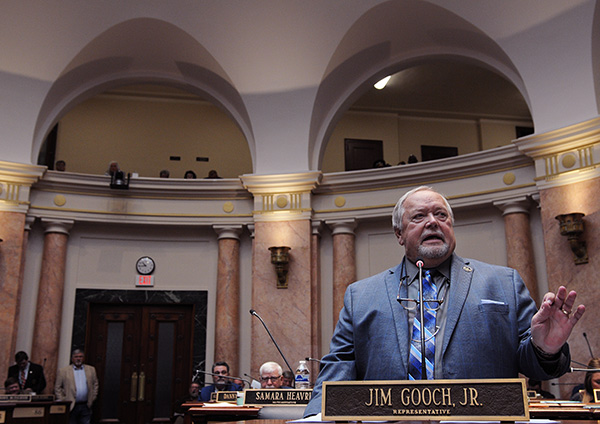
Rep. Jim Gooch Jr., R-Providence, speaks on Senate Bill 4 on the House floor. A high-res version can be found here.
FRANKFORT — Utility companies planning to retire coal-fired generating units may soon have to ask the Kentucky Public Service Commission for permission first.
The Kentucky House of Representatives approved Senate Bill 4 by a 66-28 vote on Thursday. The bill's primary sponsor is Sen. Robby Mills, R-Henderson. Rep. Jim Gooch Jr., R-Providence, carried the bill in the House.
Under SB 4, retirement of a fossil fuel-fired electric generating unit would not be approved if that retirement would compromise the quality of service to customers or negatively impact the electric grid.
Gooch called the legislation a "consumer protection bill."
"It's also a bill so that we can push back a little bit and say to people who want to force changes on us that we have a say," Gooch added.
While discussing SB 4, a few lawmakers shared stories of the impact the decline of coal has had on their communities. Rep. Ryan Dotson, R-Winchester, said coal helped bring stability to a struggling community in Pike County, but now the economy has collapsed because of "the war on coal."
"I have seen firsthand the harm and damage that the undue regulatory hardships passed down to my people, my family, from Washington D.C. that has taken jobs and destroyed the vitality of my hometown of Phelps, Kentucky, in Pike County," Dotson added.
Rep. Daniel Grossberg, D-Louisville, said SB 4 violates the free market.
"Coal plants are not economical," Grossberg said. "They are not environmentally friendly. They are not reliable, and they are not the future."
Rep. Emily Callaway, R-Louisville, said she does believe the "war on coal" is a real concern, but she would vote "no" on SB 4 for her district.
"I'm voting 'no' because we shouldn't refuse to pursue any economic development and other sources of energy because extreme measures are being implemented in other places," Callaway said. "For my district, LG&E is doing the right thing, and this is unnecessary overreach based on the evidence I've seen."
Rep. Jacob Justice, R-Elkhorn City, also spoke on the impact of the decline of coal in his community. He said people in his district struggle to afford their utility bills.
"Take it from us in Eastern Kentucky who are getting hosed by these high utility bills," Justice said. "Once the coal plants are torn down, they're gone forever. And for all of you, not just Eastern Kentucky, will be put in a quote 'untenable situation.'"
SB 4 will now go to the governor's desk for his signature or veto. An emergency clause in the bill would make it go into effect immediately upon his signature.
Bill addressing public employee payroll deductions for organizations advances
FRANKFORT — A bill restricting some types of payroll deductions for public employees may soon become law.
The Kentucky House of Representatives approved Senate Bill 7 on Wednesday by a 66-33 vote. Rep. Josh Bray, R-Mount Vernon, presented the bill on the House floor on behalf of the bill's primary sponsor, Sen. Robby Mills, R-Henderson.
Under SB 7, Bray said public employees, except for first responders, would not be allowed to deduct union dues or dues from other organizations from their paychecks.
"Several courts have ruled, including the U.S. Supreme Court, that there is no constitutional right to a payroll deduction system for political fundraising," Bray said.
If SB 7 becomes law, payroll deductions could continue until existing agreements have expired.
Bray said SB 7 would not prevent public employees from being in unions or other organizations or prohibit them from contributing to collective bargaining agreements.
"What this bill does is it severs the relationship between the government payroll system and the union," Bray said. "It makes that relationship solely between its members and the union."
Rep. Kim Banta, R-Fort Mitchell, attempted to amend the bill to remove the emergency clause and set the effective date to July 1, 2024. The amendment failed.
During discussion, Rep. Josie Raymond, D-Louisville, asked Bray why the bill exempts labor organizations for law enforcement. Bray said the bill exempts law enforcement, fire and EMS because of the hazardous nature of the profession.
"We treat them differently throughout the statutes," he added.
Rep. Ashley Tackett Laferty, D-Martin, asked Bray how unions qualify as being "political in nature." He said it is because unions often make contributions to political action committees.
Laferty then spoke in favor of payroll deductions on the House floor.
"If you truly want to protect the paychecks of hardworking Kentuckians, then you will vote to allow them to use the money that they earn in the way they want to spend it," she said.
Rep. Matt Lockett, R-Nicholasville, said SB 7 does not stop anyone from joining a union.
"I believe that having and using public funds to withhold PAC dues and then sending those to particular races to influence those one way or the other is extremely inappropriate as well," Lockett said.
SB 7 will now go back to the Senate for concurrence.
Bill prohibiting state enforcement of federal gun bans wins final passage

Sen. Lindsey Tichenor, R-Smithfield, speaks on House Bill 153, a measure that would prohibit state and local law enforcement agencies and other public officials from enforcing federal firearms bans or regulations enacted after Jan. 1, 2021. A high-res version of the photo can be found here.
Audio: An audio version of this story is available here.
FRANKFORT — A measure that would prohibit state and local law enforcement agencies and other public officials from enforcing federal firearms bans in Kentucky is now headed to the governor.
House Bill 153 — sponsored by Rep. Josh Bray, R-Mount Vernon — cleared the Senate with a 27-9 vote Wednesday following a lengthy debate over constitutional law and the relationship between state and federal government.
Sen. Lindsey Tichenor, R-Smithfield, presented HB 153 on the chamber floor, saying that nothing in the bill would prevent the federal government from enforcing its own firearms restrictions or prohibit the General Assembly from enacting new gun laws in the future.
"What is in this bill is the affirmation that Kentuckians, and only Kentuckians, should decide the future of our Second Amendment rights," she said.
HB 153 applies to federal laws or regulations that have been enacted on firearms, ammunition and accessories since Jan. 1, 2021. Violators could face misdemeanor charges under the bill and termination from their jobs.
Tichenor said any federal laws enacted prior to 2021 could still be enforced by Kentucky law enforcement. She noted that 14 other states have passed similar legislation and 115 Kentucky counties have adopted similar resolutions.
But lawmakers debated the measure on the Senate floor for nearly an hour, sparring over how it would impact police and how it would conform to the U.S. Constitution.
One opponent, Senate Minority Whip David Yates, D-Louisville, said the measure would make those who enforce the law into criminals.
"We're going to make police officers who do this criminals and jail them. Is that what this body's going to do today?" he said.
Senate Minority Caucus Chair Reginald Thomas, D-Lexington, voted against the bill, citing similar concerns.
"To say that our police departments, our police forces or police, if they try to enforce that legal constitutional law are going to be criminalized, I'm opposed to that. And that's why I'm voting no," Thomas said.
The majority of lawmakers supported the measure, including Sen. Stephen West, R-Paris. He called some of the main arguments against the bill "patently absurd."
"The state of Kentucky does not have the responsibility to enforce any federal law," West said. "That responsibility resides in Washington. It is a federal responsibility. The enforcement of federal law, and when we help the federal government when we cooperate with them, it is at our sole discretion as a state. We are a sovereign state."
West said if the law is to be enforced, the federal Bureau of Alcohol, Tobacco, Firearms and Explosives could be used.
"Plenty of federal tax dollars go to Washington to fund the ATF, and if they want to enforce, they can use the ATF," he said.
Senate committee advances sports wagering bill
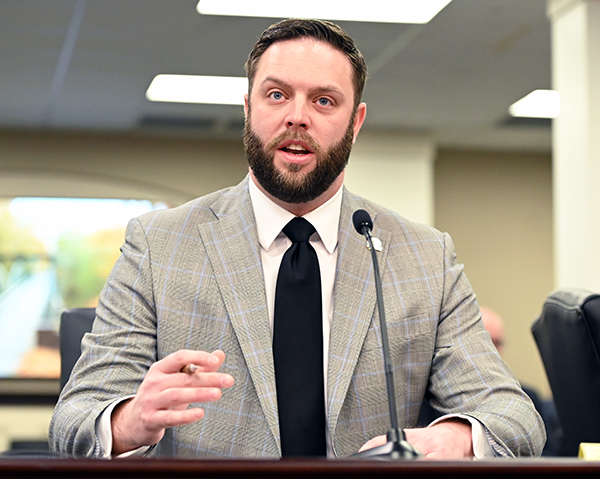
Rep. Michael Meredith, R-Oakland, speaks during Wednesday's meeting of the Senate Licensing and Occupations Committee. Meredith testified on House Bill 551, which would create a regulated marketplace for sports wagering in Kentucky. A high-res version of the photo can be found here.
FRANKFORT — The Senate Licensing and Occupations Committee on Wednesday advanced a bill that would create a legal marketplace for sports wagering and establish a sports wagering fund that pays for the regulation of the industry.
House Bill 551, presented by primary sponsor Rep. Michael Meredith, R-Oakland, would also establish a fund for problem gambling, and much of the tax revenue would benefit Kentucky's pension fund.
"It takes this activity out of the darkness, out of the shadows and into the light in a regulated format," he said.
The measure, which passed with a 9-1 vote, would make the Kentucky Horse Racing Commission the exclusive regulator of sports wagering, and it would have exclusive jurisdiction over wagering and licensing. The nine horse racing tracks in Kentucky have an opportunity to be licensed for an upfront initial fee of $500,000 and a $50,000 renewal fee, Meredith said.
"As far as broadening that beyond the racetracks, each racetrack can contract to up to three service providers that would provide either onsite wagering technology or technology for mobile and internet applications that can contract with those tracks," he said. "To be a service provider, you pay a $50,000 initial fee and a $10,000 annual renewal fee."
The racing commission must establish a system within six months of the effective date of the bill.
Other provisions in HB 551 would make tampering with the outcome of the sporting event a Class D felony. It would also prohibit employees of tracks or service providers from betting with the company they work for and sports event participants from wagering on events in which they participate.
Meredith said that, according to estimates, the state should bring in about $22.9 million annually in taxes and licensing fees. He added that recent polling showed strong support for a sports wagering law, especially if the revenue benefits public pensions.
"Six of the seven states that border Kentucky already have a legal program of sports wagering," Meredith said. "And if you look at the geography of our state, 46 counties in Kentucky border one of the states that already has a legal program, meaning the citizens in those 46 counties only have to cross a county line, which is a state border, or cross a river, and they can legally bet in the other jurisdictions that are already legal."
David Walls, executive director of The Family Foundation, spoke against the measure, arguing that legalized sports wagering harms children and leads to gambling addiction.
Sen. Donald Douglas, R-Nicholasville, said the issue is a tough one for him and mentioned how more discussion would be a good thing.
"I do realize the seriousness of the issues. I do realize the need to get a handle on some of the regulation, but should this go to the Senate floor? I likely will be looking at some other issues surrounding this whole area here," he said.
However, Sen. Denise Harper Angel, D-Louisville, said it's time for Kentucky to benefit from sports wagering revenue.
"We've been leaving money on the table for far too long, and I really, really hope we cross the finish line with this legislation," she said.
Senate Majority Floor Leader Damon Thayer, R-Georgetown, said six several states that surround Kentucky are already actively engaged in sports betting, including Tennessee, which brought in $68 million for its general fund last year alone.
"The public wants this. We can't stop people from doing things that are bad for them. There are a lot of behaviors out there that if done in excess are bad for people, but my constituents want this. The people of Kentucky want this. It's time that we give them the choice for free will, God-given free will to engage in legal sports betting," he said.
Senate Minority Caucus Chair Reginald Thomas, D-Lexington, said he agrees with others who testified that Kentucky is losing money to other states.
"We're in day two of March Madness. How many people do you think here in Kentucky are going to place a bet on the NCAA tournament? I would say there are going to be millions that are going to be finding a bet to place on the NCAA tournament. I think we've just got to be realistic here," he said.
HB 551 now heads to the full Senate.
Senate advances bill to ban 'gray' machines
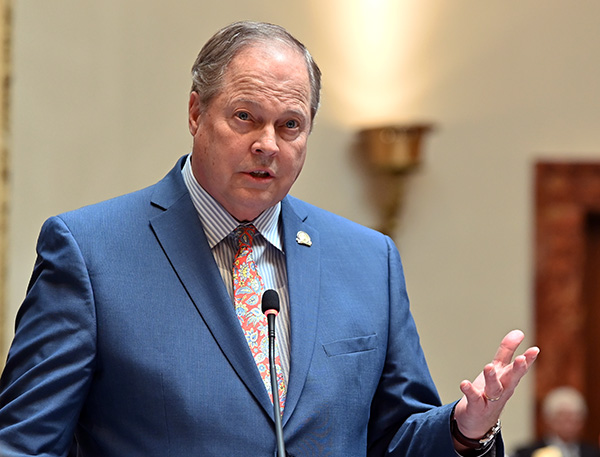
Senate Majority Whip Mike Wilson, R-Bowling Green, testifies Tuesday on House Bill 594, which would ban gray machines, or skill games, in Kentucky. A high-res version of the photo can be found here.
FRANKFORT — Legislation to ban certain gambling machines, often called gray machines or skill games, in Kentucky is headed to the governor's desk after advancing off the Senate floor on Tuesday.
Senate Majority Whip Mike Wilson, R-Bowling Green, presented the measure, House Bill 594, in the chamber, noting that it reflects input from multiple stakeholder groups such as retail and entertainment companies, the charitable gaming industry and racetracks.
"Kentucky has always done an excellent job at regulating gaming, and we want to continue that effort now by outlawing illegal gaming machines and explicitly saying what is gambling and what is not," he said.
Sponsored by Rep. Killian Timoney, R-Nicholasville, the bill was approved with a 29-6 vote. The governor will have the option to sign the bill, veto it or allow the legislation to become law without his signature.
Wilson said the bill explicitly states that machines that operate the way gray machines operate are illegal. It also seeks to separate gambling machines from esport video games and coin-operated redemption games — like those at fairs or arcades — that might provide players with tokens or prizes.
Violators who manage or operate the gambling machines could face a $25,000 fine payable to the local county government.
The original bill included an emergency clause, which would have made the legislation take effect as soon as it became law. However, HB 594 was amended to remove the clause and allow ample time for all to comply, Wilson said.
He added that while the "skill games" moniker is only a red herring in the debate over gambling machines, the bill will nevertheless eliminate any confusion over games of skill and games of chance.
Sen. Whitney Westerfield, R-Fruit Hill, voted for the bill with "great reluctance." He said he didn't agree with gaming but has concerns over a lack of consistency in the legislature on the issue of gambling machines.
Senate Minority Whip David Yates, D-Louisville, also voted for the bill but said he's been torn about the machines for quite some time. He cited concerns about gambling revenue going to neighboring states or to areas oversees, and said he would prefer regulation over an outright ban.
"If we could make sure they were put in the proper places, there was proper oversight and there was that same taxation that we see in other forms — a level playing field. That's not before us," he said. "So now I have the choice of having unregulated gambling machines out there without any kind of regulation, similar to the online bets that you see on your phone and other things that are going to other places. Or, to ban today and come back and work next year or next session on regulation. Therefore, I'm a yes vote."
Senate committee passes medicinal cannabis bill

Sen. Stephen West, R-Paris, center, testifies on Senate Bill 47 during Tuesday's Senate Licensing and Occupations Committee meeting. SB 47 would spell out qualifying conditions for medicinal cannabis use in Kentucky. A high-res version of the photo can be found here.
FRANKFORT — The Senate Licensing and Occupations Committee advanced a bill Tuesday that would allow people with serious medical conditions to use medicinal cannabis in Kentucky.
The bill's primary sponsor, Sen. Stephen West, R-Paris, described the measure and the work surrounding it as "a long road." He said he didn't intend to enter the fray on medical marijuana until some of his constituents filed a resolution on the issue in Mason County.
"Once I got into it, started reviewing it, the more I researched it, the more I was on board with the issue, and it's been back and forth ever since," he testified.
Senate Bill 47 calls on the state Cabinet for Health and Family Services to implement, oversee and regulate the medicinal cannabis program, which would be clear to launch in January 2025.
West said SB 47 gives officials at the health cabinet great latitude to develop regulations and implement the legislation.
Several medical conditions could qualify someone to use the product, including cancer, chronic and other types of pain, epilepsy, multiple sclerosis, muscle spasms, chronic nausea and post-traumatic stress disorder.
Before accessing cannabis, patients would have to register and receive approval for a special identification card. Patients under 18 years old would not be allowed to possess, purchase or acquire medicinal cannabis without the assistance of a designated caregiver.
The bill would also create separate licenses for cultivators, dispensers and producers.
West testified that stakeholders worked extensively with the Fraternal Order of Police to make sure police officers can distinguish between medicinal cannabis and illegal varieties. Use of the product will be tracked through Kentucky's controlled substance monitoring system, which is known as KASPER.
"Persons shall not operate cars, vessels or aircraft under the influence. Smoking is not allowed in this bill," West said.
Proponents testified in committee that cannabis is crucial to help them cope with pain and other serious medical conditions.
Eric Crawford, who suffers from quadriplegia and has advocated for similar legislation for years, said cannabis relaxes his violent muscle spasms, relives his constant pain and helps him leave a higher quality of life.
"I've been crippled for almost 30 years," he said. "I know what is best for me. I don't want to be high, I just want to feel better."
But critics of the legislation questioned the medical efficacy of the product.
Michael Johnson, senior policy advisor for The Family Foundation, said he is compassionate toward those who suffer with pain, but more research is needed.
"I shared in the heartache of sitting with a close family member as they received treatment for cancer and watching them endure that incredibly difficult battle for survival," he testified. "But the reality is that there is insufficient scientific evidence that marijuana is an effective pain-relieving agent or that it is safe and effective as medication."
One lawmaker who is a physician, Sen. Donald Douglas, R-Nicholasville, said he could not support the bill at this time.
"Marijuana and its derivatives are not approved by the FDA for any medical use," he said. "There really have been no long-term, double blind studies to support any of the anecdotal evidence that's been presented today."
But Senate Majority Floor Leader Damon Thayer, R-Georgetown, said West has done a fantastic job of limiting the number of afflictions for which medicinal cannabis may be used, and that the narrow focus of the bill earned his vote of support — "for the sake of those who suffer."
Thayer also had some words of caution on marijuana.
"I have been a longtime opponent of legislation related to marijuana," he said. "I came into this body 20 years ago with a strong set of core beliefs. I grew up in the 1980s during a very strong anti-drug culture. If you're a pot smoker and you're looking for me to help get the camel's nose under the tent so you can smoke your pot legally in Kentucky, I'm not your guy."
Senate Minority Caucus Chair Reginald Thomas, D-Lexington, also voted for the measure. He has been a longtime supporter of medicinal cannabis.
"Today is just satisfying and gratifying that I kept my word to those people, to my constituents, and have seen this get past the committee. In some ways, this is personal for me because I had a wife who I lost to cancer and I saw her in pain constantly," he said. "I understand the pain that cancer patients feel, and this will help alleviate that pain."
House approves bipartisan bill to legalize sports betting
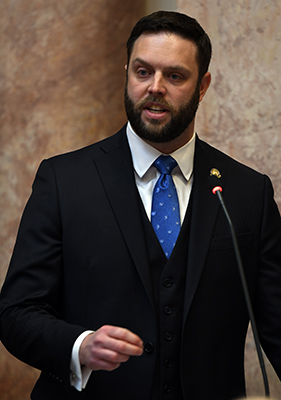
Rep. Michael Meredith, R-Oakland, presents House Bill 551, a bill to legalize sports wagering, on the House floor. A high-res version of the photo can be found here.
FRANKFORT —Kentucky is one step closer to legalizing sports wagering.
The Kentucky House of Representatives approved House Bill 551 on Monday. The bill's primary co-sponsor, Rep. Michael Meredith, R-Oakland, said the legislation would legalize, regulate and tax sports wagering in the Commonwealth.
"This does create a regulated marketplace for sports wagering — taking sports wagering in Kentucky out of the shadows, out of the darkness, and into the light," Meredith said.
The House also amended the bill to establish a problem gambling assistance fund, which would promote public awareness of gambling addiction and help pay for addiction treatment. The bill's other primary co-sponsor, Rep. Al Gentry, D-Louisville, had filed separate legislation on that issue.
Meredith said Monday's amended version of the bill would dedicate 2.5% of the tax revenue from sports wagering to the fund. Limited to $50,000 per fiscal year, the fund would be administered by the Division of Behavioral Health of the Department for Behavioral Health, Developmental and Intellectual Disabilities.
Additionally, HB 551 would
- direct the Kentucky Horse Racing Commission to oversee and regulate the sports wagering,
- permit only licensed tracks to obtain a sports wagering license through the commission,
- prohibit sports wagering for anyone under the age of 18,
- prohibit a person who is participating in a sporting event either as a player, coach, official or owner of a team from placing a wager on a game or event they're associated with,
- establish criminal penalties for violators,
- and establish a 9.75% tax on revenue at tracks and a 14.25% tax on revenue from online wagers.
In the House Licensing, Occupations and Administrative Regulations Committee last week, Meredith and Gentry said the state would make an estimated $23 million annually off sports wagering. After the problem gaming assistance fund costs and administrative costs have been appropriated, the remaining revenue would be deposited into the permanent pension fund, they said.
Rep. Josh Calloway, R-Irvington, attempted to pass two amendments to prohibit credit cards from being used and raise the legal age from 18 to 21 on the House floor. Both amendments failed.
Calloway said he is against the bill, but if it is going to become legal, he wanted to do what he can to protect children and gambling addicts.
"I will never, ever, ever stop fighting for Kentuckians and fighting things that have the ability to destroy people's lives. I firmly believe that this is one of them," Calloway said.
HB 551 cleared the House floor by a 63-34 vote.
In explaining his "no" vote, Rep. Chris Fugate, R-Chavies, said HB 551 is "not good for Kentucky."
"I really hope and pray we get to see some legislation that will bring jobs into East Kentucky and to the rural parts of the state," he added.
In explaining his "yes" vote, Gentry said this bill would establish the state's first problem gambling assistance fund and give Kentuckians what they want.
HB 551 will now go before the Senate for consideration.
Senate bill setting marijuana impairment limit advances
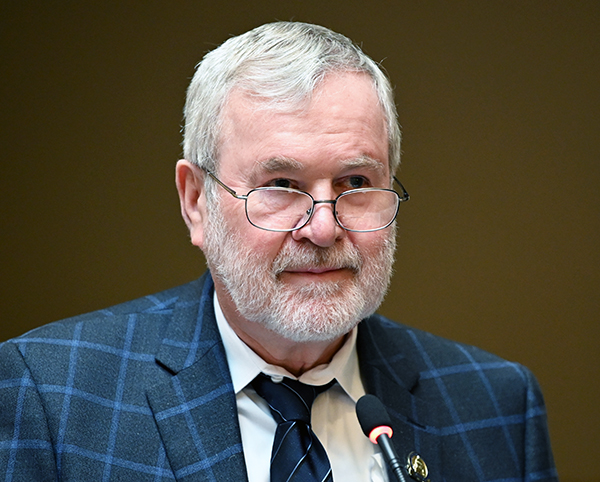
Sen. Johnnie Turner, R-Harlan, speaks on the Senate floor Monday on behalf of Senate Bill 228, which would set an impaired driving limit for marijuana. A high-res version of the photo can be found here.
FRANKFORT —The Senate approved a measure Monday that would set an impaired driving limit for marijuana.
Senate Bill 228 would specify that people are too impaired to drive if they have 5 nanograms or more of THC, also called tetrahydrocannabinol, per millimeter in their blood. A nanogram is one billionth of a gram.
The bill's sponsor, Sen. Johnnie Turner, R-Harlan, explained that the goal of the bill is to save counties thousands of dollars by providing a clear definition of THC impairment to use in court cases.
"I was approached by a county attorney who advised me they were spending about $100,000 to have experts testify about the marijuana in one system," Turner said, adding that the bill's approach is similar to the one used for alcohol.
"It's two hours from the time you are detained, you're taken for a blood test," he said.
Turner said an expert from the University of Kentucky has testified that five nanograms can constitute a presumption of intoxication. There is no presumption at levels between four and five, and at lower levels, there's the presumption of innocence, he said.
Sen. Robin L. Webb, D-Grayson, cast a pass vote, citing concerns that the scientific data is still incomplete and that individuals have different tolerance levels for marijuana.
"I think it is an arbitrary standard even though it may act as a deterrent and other states have done it," she said. "I would hope that we leave the door open to adapt to changing scientific technologies on true levels of impairment, especially if we're moving toward the utilization of marijuana in a medical sense."
The bill passed off the Senate floor with a 33-0 vote and three pass votes. It now heads to the House for consideration.
House committee advances bill to create a process for obscenity complaints in schools
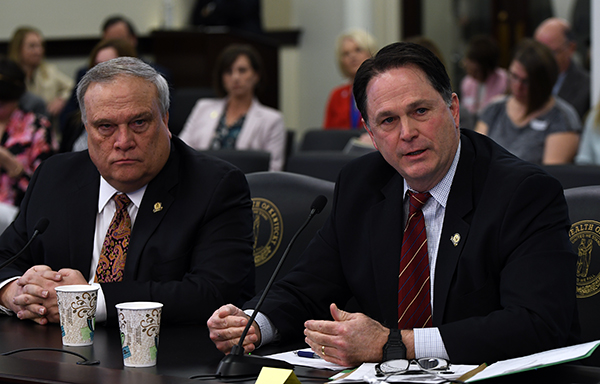
Senate President Robert Stivers, R-Manchester, (left) and Sen. Jason Howell, R-Murray, present Senate Bill 5 before the House Education Committee. A high-res version can be found here.
FRANKFORT —Parents may soon have a new way to challenge obscene materials in public schools under Senate Bill 5.
The House Education Committee approved the bill on Monday. The bill's primary sponsor Sen. Jason Howell, R-Murray, said SB 5 provides a framework for parents to challenge material in public schools that may be obscene and inappropriate for children. Senate President Robert Stivers, R-Manchester, also joined Howell in testifying on the bill.
"The purpose of this bill is to address the issues that parents think may be obscene," Howell said. Under SB 5, some of the material that is defined as "harmful to minors," includes nudity and visual and written depictions of sexual acts.
Stivers is not listed as a co-sponsor of SB 5, but he said this is an important issue to him.
SB 5 would direct local boards of education to establish a complaint resolution policy for local schools to use to address complaints from parents about material, a program or event that is harmful to minors by July 1.
A complaint would have to be submitted to the school's principal where they would have seven business days to investigate the complaint and 10 business days to inform the parent of their decision to keep the materials or remove or restrict them.
If a parent is not happy with the principal's decision, they may appeal to the local board of education. The board then has 30 days to address the appeal.
"At that point, if the parent still isn't pleased with the process and outcome, then they can request that their child be restricted from or that material be restricted from their child," Howell said.
Rep. Tina Bojanowski, D-Louisville, asked Howell if there are any school districts that do not already have a similar process in place to address concerns about material.
Howell said most districts have a process in place, but, "some of them work well and some of them don't."
Rep. Josh Calloway, R-Irvington, spoke in favor of SB 5. He said he has found examples of obscene, sexual materials at Kentucky public schools.
"I think it's vitally important that we be as bold as we possibly can on this issue," Calloway said. He added later that he is concerned about books that depict sexual acts, not materials like books on the Civil War.
Rep. Killian Timoney, R-Nicholasville, also said he's in favor of SB 5, but he has concerns about the 10 day turn around for principals.
"I am supportive of this bill because I do believe that we need to be making sure that the materials in our schools are developmentally appropriate," he said.
Howell said the bill does allow an extension to the deadline if all parties are agreeable.
"I think that the 10 day window is set in there to make sure that the parents understand that their concerns are being taken seriously and properly," he added.
Rep. Josie Raymond, D-Louisville, also shared she has concerns about the impact the legislation might have on the parent-teacher relationship.
Howell said there is nothing in SB 5 that would prevent a parent from talking to the teacher about the material first to see if they can come up with a solution before filing an official complaint.
The House Education Committee approved SB 5 by a 16-4 vote.
In explaining his "no" vote on SB 5, Rep. George Brown Jr., D-Lexington, said the word "censorship" comes to his attention.
In explaining her "yes" vote, Rep. Emily Callaway, R-Louisville, said she hopes it "deters some of this material from ever making it into the school system."
SB 5 will now go before the full House for consideration.
This Week at the State Capitol
Dozens of bills are on the move with only a few days left in the session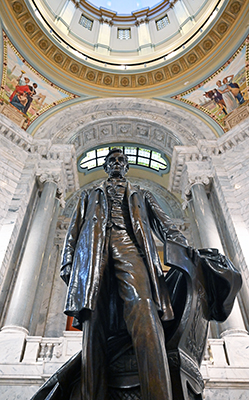
A statue of Abraham Lincoln stands in the rotunda of the Kentucky Capitol rotunda. A high res photo is available here.
Audio: An audio version of this story is available here.
FRANKFORT — The final days of the 2023 legislative session are now visible on the horizon, and lawmakers have spent the past week pushing a raft of bills closer to the finish line, including one measure on gaming machines that appeared to stall in the House last week.
Bills on firearms, juvenile justice, religious freedom, delta-8 THC and driverless vehicles all received action over the packed four days. Most of the major bills this year have now passed out of at least one chamber, and some are even closer to final passage.
Wednesday brought one of the most memorable moments of the session so far. That's when lawmakers in the House mobilized a sizable majority to revive House Bill 594 for a successful vote on the chamber floor.
The legislation would clarify that certain gaming machines, often known as "gray machines" or "skill games," are illegal in Kentucky. The devices are called gray machines because they fall into a gray area in the state's gambling laws, and they have grown more prevalent at gas stations and convenience stores over the past two years.
If HB 594 becomes law, anyone who manages or owns the machines would be subject to a $25,000 fine per device.
The legislation was tabled last week after lawmakers debated where gambling should occur in Kentucky — and who should oversee it. However, the apparent accord on Wednesday resulted in a 64-32 vote in a favor of sending the bill to the Senate.
Gambling has remained a banner issue in the General Assembly for more than a decade, and at least one other measure, a bill on sports wagering, is advancing in the House this year
House Bill 551 would legalize, regulate and tax sports wagering in Kentucky — all under the authority of the Kentucky Horse Racing Commission — and only licensed tracks would be permitted to obtain a sports wagering license. The bill cleared the House Committee on Licensing, Occupations and Administrative Regulations on Wednesday.
In the Senate, lawmakers passed a key education bill on student discipline. Senate Bill 202 would give local school boards more flexibility to place students into alternative learning programs if the student is considered a safety threat or is likely to cause a substantial disruption. The bill advanced off the chamber floor Wednesday.
Another bill grabbing attention this week was House Bill 547. It would codify religious freedoms for public school teachers, faculty and staff, including the right to engage in religious expression and prayer during breaks and to display religious items in personal spaces. The bill passed off the House floor on Thursday.
The Senate wrapped up the week Friday with an hour-long debate on Senate Bill 115, which would prohibit sexually explicit performances on publically owned property or in locations where the performances could be viewed by minors. That would include performances "involving male or female impersonators who provide entertainment that appeals to a prurient interest," according to the bill.
SB 115 passed off the Senate floor and now heads to the House.
Dozens of other bills remained on the move this week, and lawmakers only have four days left on the calendar before the chambers gavel out for a veto recess. Here's a look at some of the key measures under discussion:
Firearms on College Campuses: House Bill 542 would prevent colleges and universities from banning people who are 21 and older from carrying concealed firearms on campus. The House Committee on Veterans, Military Affairs and Public Protection approved the legislation on Tuesday.
Freestanding Birthing Centers: Senate Bill 67 seeks to reduce some of the legal and regulatory hurdles for opening freestanding birthing centers in Kentucky. The Senate Licensing and Occupations Committee passed the bill Tuesday.
Student Vaccines: House Bill 101 would prevent any person, entity, corporation or government agency from requiring or coercing a child to receive a COVID-19 vaccination. The legislation advanced off the House floor on Tuesday.
Animal Abuse: House Bill 103 would increase the penalty for torturing a dog or cat from a class A misdemeanor on the first offense to a class D felony. It would also expand the definition of torture for this statute. The House passed the bill on Tuesday.
Vehicular Homicide: House Bill 262 would add the crime of vehicular homicide to state statutes. A person would be guilty of vehicular homicide, a class B felony, if they cause a death while operating a motor vehicle impaired. The bill passed off the House floor Tuesday.
Juvenile Justice Audit: Senate Bill 158 calls on the state auditor to contract with an independent firm that would conduct a performance review this year of state juvenile detention facilities. The Senate passed the measure Tuesday.
Juvenile Justice Reform: Senate Bill 162 seeks a comprehensive overhaul of Kentucky's troubled juvenile justice system, including a return to a regional model of detention. It would place all eight of Kentucky's juvenile detention centers under one office with a lead supervisor who reports directly the commissioner. Among many other changes, the bill would increase staffing and training, enhance mental health interventions, and provide better segregation of violent offenders. SB 162 passed off the Senate floor Tuesday.
Biomarker Testing: House Bill 180 would require health benefit plans to cover biomarker testing for patients who have been diagnosed with cancer and other diseases. The Senate Committee on Health Services passed the bill Wednesday.
ESG Investing: House Bill 236 would require state public pension funds to base investment decisions on financial risks and returns and not on environmental, social and governance factors, commonly known as ESG. The measure advanced out of the Senate State and Local Government Committee on Wednesday.
Sex Offenders: Senate Bill 80 would prohibit registered sex offenders from loitering or operating a mobile business within 1,000 feet of schools, daycares, and public playgrounds or swimming pools. It cleared the House Judiciary Committee on Wednesday.
Motor Vehicle Racing: Senate Bill 96 would set up a framework for local governments to grant permits for motor vehicle racing events as long as conditions are met on insurance, security and emergency services. It would also allow local governments to temporarily close roadways and waive traffic regulations for the events. The Senate Transportation Committee passed the bill on Wednesday.
Tracking Devices: Senate Bill 199 would outlaw the installation of tracking devices on motor vehicles without the consent of the vehicle owner or lessee. The Senate passed the bill Wednesday.
Postsecondary Education Study: Senate Joint Resolution 98 would direct the state Council on Postsecondary Education to study the placement and services of public colleges and universities in Kentucky. The Senate passed the resolution Wednesday.
Teacher Shortages: House Bill 319 seeks to ease teacher shortages. It would clear the way for Kentucky to participate in the Interstate Teachers Mobility Compact, if it is created. It would also allow someone with at least a bachelor's degree and at least four years of experience in their field to teach that subject under the supervision of a certified teacher. The bill cleared the House floor on Wednesday.
Drug Test Strips: House Bill 353 would remove fentanyl test strips from state prohibitions on drug paraphernalia. The House passed the legislation Wednesday.
Health Care Workers: House Bill 200 aims to address a shortage in health care workers by creating the Kentucky Health Care Workforce Investment Fund. It would use both public and private money to increase scholarship opportunities in the field. The House passed the bill Wednesday.
Postpartum Depression: Senate Bill 135 calls on the state Cabinet for Health and Family Services to create a panel focused on perinatal mental health disorders and provide related information and assessment tools for health care providers. The House Committee on Families and Children advanced the bill Thursday.
Federal Firearm Bans: House Bill 153 would prohibit state and local law enforcement agencies and other public officials from enforcing federal firearm bans or regulations enacted after Jan. 1, 2021. The Senate Committee on Veterans, Military Affairs and Public Protection passed the measure Thursday.
Marijuana Intoxication: Senate Bill 228 would set an impaired driving limit for marijuana. It would specify that people are too impaired to drive if they have 5 nanograms or more of THC per milliliter in their blood. The bill passed out of the Senate Judiciary Committee on Thursday.
School Staffing: House Bill 32 would allow school districts to hire classified personnel, such as cafeteria workers and bus drivers, without a high school diploma or GED. The school system must provide those employees an opportunity obtain their GED or earn relevant licenses or credentials at no cost. The Senate Education Committee passed the measure Thursday.
Teacher Misconduct: House Bill 288 seeks to protect students from teachers accused of misconduct, give due process rights to accused teachers, and lay out a framework for school personnel to conduct misconduct investigations. It also seeks to improve transparency when misconduct occurs. The bill passed out of Senate Education Committee on Thursday.
Physician Wellness: Senate Bill 12 would allow physicians to participate in wellness and career fatigue programs without disclosing their participation to employers. Supporters say it will help physicians deal with job-related burnout without fear of retaliation. The bill advanced out of the House Committee on Health Services on Thursday.
Autonomous Vehicles: House Bill 135 would provide a regulatory framework for the use of fully autonomous vehicles on public highways. The House passed the bill Thursday.
Delta-8 THC: House Bill 544 would direct the state Cabinet for Health and Family Services to establish regulations related to delta-8 THC by Aug. 1. That would include prohibiting the sale of the product to anyone under 21. HB 544 won passage on the House floor Thursday.
Child Murder: House Bill 249 would make the intentional killing of a child under 12 an aggravating circumstance. That would ensure that a person who is guilty of killing a child would either be subject to life in prison without parole or the death penalty. The House passed the legislation Friday.
KEES for Proprietary Schools: Senate Bill 54 would allow students to use a Kentucky Educational Excellence Scholarship to attend a qualified propriety school program that is focused on a high-demand work sector. The measure passed off the House floor Friday.
DUI Restitution: Senate Bill 268 would allow courts to order restitution for children whose parents are killed or permanently disabled by an intoxicated driver. The Senate advanced the measure Friday.
Lawmakers are scheduled to return to Frankfort on Monday for day 25 of the session and then break on March 16 for a 10-day veto recess.
Kentuckians can track the action through the Legislative Record webpage, which allows users to follow a bill's progression through the chambers.
Citizens can also share their views on issues with lawmakers by calling the General Assembly's toll-free message line at 1-800-372-7181.
Kimber's Law advances from House floor
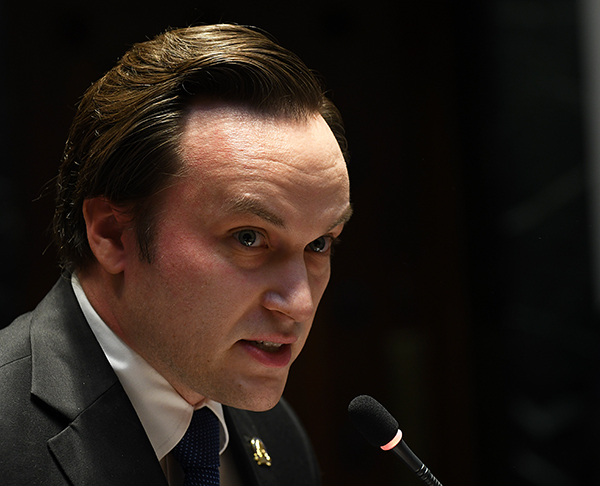
Rep. Nick Wilson, R-Williamsburg, presents House Bill 249, or Kimber's Law, on the House floor. A high-res version can be found here.
FRANKFORT — A bill to strengthen the penalties for individuals who murder children advanced off the House floor on Friday.
House Bill 249, or Kimber's Law, would make the intentional killing of a child under the age of 12 an aggravating circumstance, said the bill's primary sponsor Rep. Nick Wilson, R-Williamsburg. The bill is named after 3-year-old Kentuckian Kimber Collins, who was beaten to death in 2019.
"I wouldn't stand here today presenting this bill if there wasn't a reason to do so, and that reason why is Kimber Collins," Wilson said.
With the way the law is currently written, the man who killed Kimber was not eligible to be sentenced to life without parole in Kentucky, Wilson said. Instead, the man received a 45-year sentence and will be eligible for parole after 20 years.
"I think that's a disservice to the most vulnerable victims in our Commonwealth," Wilson added.
Under Kentucky law, the penalty for a class A felony is 20 to 50 years or life with the possibility of parole after 20 years, unless a person guilty of a class A felony has an aggravating circumstance, Wilson said.
There are currently eight crimes in Kentucky that constitute as an aggravating circumstance, including having a prior murder conviction and committing a murder during a robbery, rape or arson. A person who is convicted of a class A felony with an aggravating circumstance could face life in prison without the possibility of parole or the death penalty.
When it comes to the death penalty, Wilson said he found only three people have been executed in Kentucky since 1960 with the most recent case being in 2008.
"I want everyone to keep in mind that this (bill) is not necessarily a vote of approval or disapproval of the death penalty," Wilson said. "It is more nuanced than that."
Rep. Lindsey Burke, D-Lexington, said a few members of the House Judiciary Committee had an issue with the death penalty being an option in the bill and suggested changes. Wilson said he did not change the language in the bill because other lawmakers said they prefer the original language.
In explaining her "yes" vote, Rep. Stephanie Dietz, R-Edgewood, said she was one of the House Judiciary Committee members who had concerns.
"I would have been in favor of the other language, but today I'm a 'yes' so that we can protect our children," Dietz said, adding she is also against the death penalty.
Rep. Patrick Flannery, R-Olive Hill, spoke on the House floor in favor of HB 249. He said while he struggles with the topic of the death penalty, he believes the bill is not about that.
"I think it's really important to amplify that this bill is really not about the death penalty," Flannery said. "It is a parole issue."
The House approved HB 249 by an 85-6 vote. It will now go before the Senate for consideration.
House approves bill to regulate delta-8 THC products
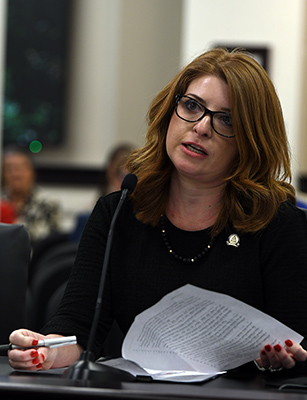
Rep. Rebecca Raymer, R-Morgantown, presents House Bill 544, which would instruct the Cabinet for Health and Family Services to regulate delta-8, a hemp-derived cannabinoid product, before the House Health Services Committee. A high-res photo can be found here.
FRANKFORT —Delta-8 THC products in Kentucky may soon be placed under new regulations.
The Kentucky House of Representatives unanimously approved House Bill 544 on Thursday after the legislation advanced out of the House Health Services Committee earlier in the day.
Rep. Rebecca Raymer, R-Morgantown, who is one of the bill's primary co-sponsors, said the bill would require regulations for delta-8 THC, a hemp-derived cannabinoid product.
"This is going to make it illegal to purchase (delta-8 THC) under the age of 21," Raymer said during the committee meeting. "It's going to have to be a behind the counter product."
Additionally, delta-8 THC products would have new labeling and testing requirements under HB 544. Raymer said the bill would direct the state Cabinet for Health and Family Services to establish these new regulations by Aug. 1.
Katie Moyer, president of the Kentucky Hemp Association, testified alongside Raymer in favor of the bill during the committee meeting. She described the situation in the hemp industry with delta-8 THC products as the "wild west."
"(Delta-8 THC) is coming from who knows where. We're surely not getting it from Kentucky producers who are growing it here and who we can go visit their store, their facility and make sure it's clean and make sure they know who they're getting their materials from," Moyer said.
House Speaker Pro-Tempore David Meade, R-Stanford, is the other primary co-sponsor of HB 544. On the House floor, Meade said the legislation will protect children.
"I've had numerous folks in our school systems and my local sheriff asking for us to do something on this issue," Meade said. "We have this product getting in the hands of children. We have some that have overdosed on this product, and they want the ability to go in and issue penalties for those who are selling delta-8 THC to underage children."
Also on the House floor, Rep. Rachel Roberts, D-Newport, said HB 544 is a "good piece of legislation," that will hopefully be a "great model for full cannabis legalization" in the future.
Rep. David Hale, R-Wellington, also spoke in favor of HB 544. He is another lawmaker who heard from constituents in education and law enforcement on the issue.
"I feel this is an excellent move," Hale said.
The House approved HB 544 by a 97-0 vote. It will now go before the Senate for consideration.
Senate committee advances firearms bill
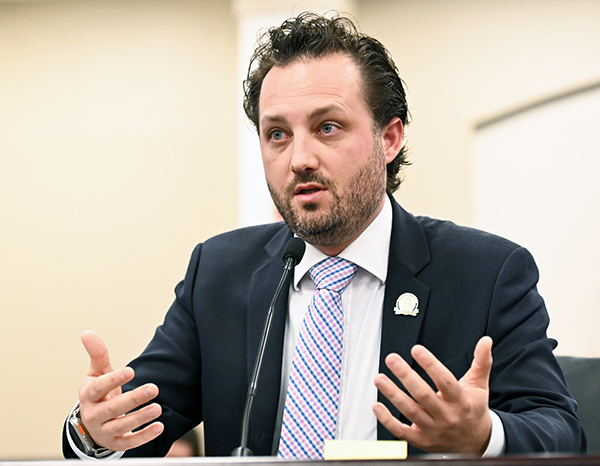
Rep. Josh Bray, R-Mount Vernon, spoke during Thursday's meeting of the Senate Veterans, Military Affairs, and Public Protection Committee. Bray testified on House Bill 153, which would prohibit Kentucky law enforcement personnel from enforcing federal firearms bans. A high-res photo can be found here.
FRANKFORT —The Senate Veterans, Military Affairs, and Public Protection Cabinet on Thursday advanced a bill that would prohibit Kentucky law enforcement personnel from enforcing federal firearms bans.
The bill's primary sponsor, Rep. Josh Bray, R-Mount Vernon, said the House Bill 153 passed out of the House earlier this year.
"The concept behind it's pretty simple," Bray said. "It says going forward no state tax dollars or state manpower will be allocated towards the enforcement of federal firearms ban regulations after Jan. 1, 2021."
The measure passed out of committee on a 7-2 vote, but not before some debate, including two opponents who spoke during a public comment period.
Sen. Karen Berg, D-Louisville, compared gun violence to the opioid crisis and asked why Kentucky wouldn't take a similar approach to mitigating the problem by reducing the prevalence of guns.
"Why, in this case, when we have a tremendous, extraordinarily costly epidemic of gun violence in this state are you advocating for more guns rather than less? That seems antithetical to what we are doing with the opioid crisis," she said.
Bray said he doesn't equate the opioid crisis with gun violence, arguing that the opioid crisis stems from addiction while gun violence results from a lack of respect for human life.
He also pointed to the example of the pistol brace ban to convey his point of view.
"The federal government has …reexamined an existing interpretation to make this firearm accessory illegal," he said. "Without a single legislative vote cast, they've just determined that something that was legal for years is now illegal — just through a (regulation) interpretation."
Bray added that he's concerned about people with disabilities and those who want to use firearms for protection of their families.
The bill now heads to the Senate.
Senate approves measure to bolster student discipline
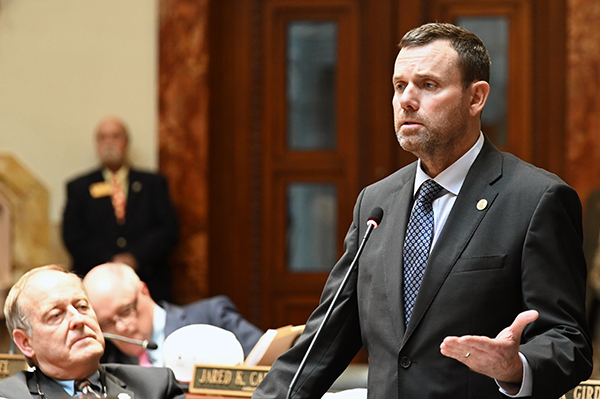
Sen. Stephen West, R-Paris, testifies on Senate Bill 202, which would give local school boards more flexibility to place students into alternative learning programs if the student is considered a safety threat or is likely to cause a substantial disruption. A photo from Wednesday's Senate session can be found here.
FRANKFORT —The Senate unanimously approved a measure Wednesday that takes aim at improving student discipline in Kentucky's public schools.
Senate Bill 202, sponsored by Sen. Stephen West, R-Paris, would give local school boards more flexibility to place students into alternative learning programs if the student is considered a safety threat or is likely to cause a substantial disruption, among other measures.
"This bill is a very simple bill. It allows for the expulsion to be extended. It allows for more alternative options. In a nutshell, it gives more options to superintendents and school districts when it comes to expulsions," West said.
He said the measure will add more discretion for the superintendent to do alternative programming, including virtual learning.
The bill also would require, 30 days before a student's expulsion ends, the local school board to review the circumstances and determine if the expulsion should be extend for a period not to exceed 12 months. The board will consider if ending the expulsion will substantially disrupt the education process or constitute a threat to students or school staff.
West said all grades of students have serious problems with discipline.
"This issue, we always talk about is the urban-rural divide, and this is not an urban-rural divide problem. This is not a JCPS problem. This is a problem in every district in the commonwealth," West said.
During the interim period, West spoke with stakeholders from many groups, and there was the recurring theme of discipline problems, he said.
"This issue is so important that it affects and bleeds over into other areas that we're having problems with. For instance, the teacher shortage issue. You're seeing that older teachers, if they're eligible for retirement, are leaving early because they can't deal with these issues in the classroom," West said.
West told legislators they won't be able to address every issue this session, but the bill will begin to address discipline problems.
Sen. John Schickel, R-Union, said SB 202 and several other bills that deal with discipline are some of the most important ones legislators will work on this session.
"We talked a lot yesterday about our juvenile justice system and the state of disarray that it was in. Even though this is not directly connected, I think it is connected in the fact that our schools are hurting," he said.
Schickel said there's a crisis with recruiting teachers, bus drivers, cafeteria workers, janitors, and every type of position within schools. "If we don't get our hands around this, our children and our families are at risk."
Senate Minority Floor Leader Gerald A. Neal, D-Louisville, cautioned that the bill requires a certain amount of discretion in the classroom, and that's based upon someone's judgment. Neal said he supports multiple tools to deal with certain circumstances.
"It gives an option, that instead of necessarily sending a young person out of the school setting, that there are options that are available to keep them in the learning process," he said.
Senate Minority Caucus Chair Reginald Thomas, D-Lexington, said it's important to be transparent about discipline issues in schools, pointing to schools in Fayette County as an example.
"What we've seen historically is that these kinds of discretions in judgment tend to disproportionally affect Black students more than white students. That when you look at the students that are being removed from the classroom or are being suspended or being expelled, they are disproportionally Black as opposed to white," he said, adding that the situation has improved over the last few years.
"We don't want these decisions again to have a disproportional impact on Black students because they are there to learn too," he said.
Sen. Donald Douglas, R-Nicholasville, said teachers are in the schools to teach, not to parent children. He said he doesn't think teachers necessarily treat Black students unfairly.
"To make an assumption that our teachers are going to discipline someone just because of their race is offensive to me, and it should be offensive to everyone in the Commonwealth of Kentucky," he said.
Sen. Matthew Deneen, R-Elizabethtown, also said serious discipline problems exist with students of all ages.
"After 29 years in education, I've also worked in alternative schools. I've dealt with discipline in the classroom, and I've seen my colleagues deal with discipline in the classroom. What I hear quite often is we focus so much on the disrupter that we lose sight of the rest of the children in that classroom," he said.
The out-of-control behavior and the lack of discipline have a ripple effect, he said, adding he supports the measure.
"It provides our administrators with options. It provides superintendents with options. And more importantly, it provides safety and security for our children. That is the most important thing," he said.
House approves bill to ban gray machines
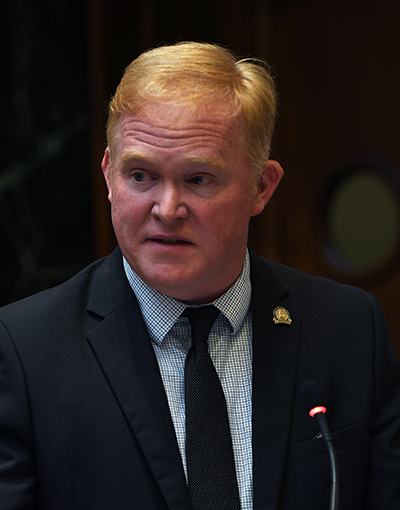
A photo from the March 3 proceedings in the Kentucky House of Representatives shows Rep. Killian Timoney, R-Nicholasville, presenting House Bill 594, a bill to ban gray machines, on the House floor. A high-res version can be found here.
FRANKFORT —— Legislation to ban gray machines, or skill games, in Kentucky is on the move.
The Kentucky House of Representatives approved House Bill 594 on Wednesday by a 64-32 vote. The bill was first brought to the floor for a vote on March 3, but the House voted to table the measure at that time. A motion to bring the legislation back to the House floor for a vote was successful on Wednesday.
Last week, the bill's primary sponsor, Rep. Killian Timoney, R-Nicholasville, said the purpose of the bill is to clarify what types of gaming are legal under Kentucky law.
"Kentucky has always done an excellent job of regulating gaming, and we want to continue that effort now by outlawing illegal gaming machines and explicitly saying what is not gambling and what devices and machines are gambling machines and which ones are not," Timoney said.
HB 594 carves out exceptions for charitable gaming, e-sports competitions and skill-based contests. The bill defines "coin-operated amusement machines" like games played at retail establishments like Chuck-E-Cheese. Those along with carnival games would not be banned under this bill, Timoney said. Pari-mutuel wagering, historical horse racing and e-sports would remain legal as well.
HB 594 would also create a civil penalty for those who violate the statute. Anyone who conducts, finances, manages, supervises, directs or owns a gambling device would be subject to a $25,000 fine per device payable to the local county government.
Timoney said he collaborated with many stakeholders when drafting the bill, including the Kentucky Retail Federation, the State Fair Board and the University of Kentucky.
Rep. Chris Fugate, R-Chavies, has said he has been divided on the bill even though he is against gambling. He voted "yes" on HB 594 on Wednesday "because the gray machines are taking the money of my people back in the 84th District," he said.
HB 594 will now go before the Senate for consideration.
Motor vehicle racing bill gains Senate committee approval
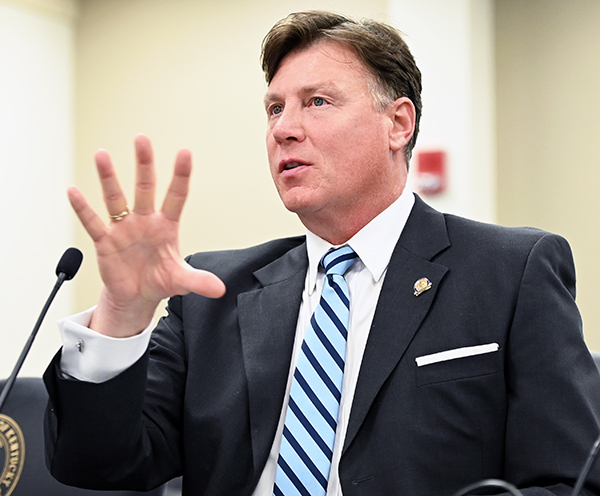
Sen. Brandon Smith, R-Hazard, testifies during Wednesday's Senate Transportation Committee meeting. He presented Senate Bill 96, which would create a framework for motor vehicle racing in Kentucky. A high-res photo can be found here.
FRANKFORT — The Senate Transportation Committee on Wednesday unanimously approved a measure that would help boost motor vehicle racing in Kentucky.
Senate Bill 96 is sponsored by Sen. Brandon Smith, R-Hazard. He said there's tremendous opportunity to allow drivers to race in the commonwealth, and the legislation would establish some protocols on permitting, insurance, safety and other related issues.
He testified alongside Erik Hubbard, director of Backroads of Appalachia, a motor sports organization based in Harlan County.
"Hosting events like this all across Eastern Kentucky as (Hubbard) has done, it's not just as easy as putting it together," Smith said. "You want to make sure you have insurance and all the stuff in place for the local communities and the cities and the counties that participate, and he wants to make sure it's done right."
SB 96 would set up a framework for local governments to grant permits for racing events as long as conditions are met on insurance, security and emergency services. It would also allow local governments to temporarily close roadways, reroute traffic and waive traffic regulations for the events.
Only a nationally or internationally recognized racing organization would qualify to host an event under the bill, and organizers would be required to provide written details to state officials 60 days in advance.
Hubbard said he is from Eastern Kentucky and loves the area. He wants to use racing to bring tourism dollars to the area and all of Kentucky in a safe and fun way.
"Last year, we had an economic impact (study) done from the University of Pikeville that we brought in over $11.9 million," he testified.
Another key reason for the legislation is staying competitive with West Virginia, Hubbard said. His group uses professional organizers to host events across the United States. These groups can offer multi-million dollar insurance policies for drivers, he said.
Sen. Karen Berg, D-Louisville, who is a physician, expressed concern about drivers who might not have insurance to pay for injury treatments.
"I worked in a small, rural hospital in Southern Indiana for many, many years, and we had something going on up the street where people would get hurt, and they would show up and they had no health insurance, nothing to cover the costs of these injuries. Is that a requirement?" she said.
Hubbard explained how drivers can obtain a $5 million insurance policy that is secondary to medical insurance.
He added that his organization partnered with those in addiction recovery to host a rally car race, giving 63 people an opportunity to "be exposed to a different culture and get them high on cars instead of drugs."
Sen. Jimmy Higdon, R-Lebanon, who is chairman of the committee, asked about the length of the races.
Hubbard said they focus on 3-4 miles total, and they do time trials instead of traditional races. He added that the United States has a problem with illegal races taking over interstates
"We do not endorse that, we do not approve of that," he said. "That's why we take the initiative now to even have car groups out of Lexington and Louisville come to Clay City. Let's do a car show, and if you want to call a buddy out, you pay $35 and you can do it here legally and safely and not endanger families on the roads."
The bill now heads to the Senate for consideration.
Bipartisan sports wagering bill advances from House committee
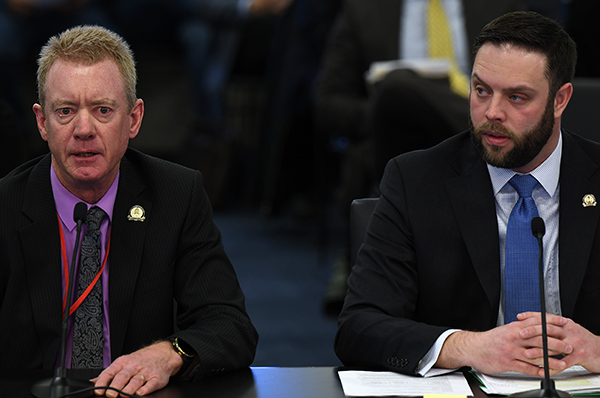
Rep. Michael Meredith, R-Oakland, (right) and Rep. Al Gentry, D-Louisville, testify together on House Bill 551, a bill to legalize sports betting in Kentucky, before the Wednesday's House Licensing, Occupations and Administrative Regulations Committee. A high-res version can be found here.
FRANKFORT — This could be the year the Kentucky General Assembly legalizes sports betting in the Commonwealth.
The House Licensing, Occupations and Administrative Regulations Committee unanimously approved House Bill 551 on Wednesday. Rep. Michael Meredith, R-Oakland, and Rep. Al Gentry, D-Louisville, are primary co-sponsors of the bill, which would legalize, regulate and tax sports wagering in Kentucky.
Meredith said even though sports wagering is illegal in the state, Kentuckians are placing about $1 billion in illegal sports wagers annually through online sources. Many Kentuckians are also crossing the state line to participate in sports betting in states where it is legal.
"I'm here to tell you about taking an industry that exists in darkness and in the shadows and legitimizing it, legalizing it and regulating it to protect the consumers of Kentucky," Meredith said.
Meredith said the Kentucky Horse Racing Commission would oversee and regulate the sports betting industry under HB 551. Only licensed tracks would be permitted to obtain a sports wagering license through the commission.
In addition, HB 551 prohibits several types of people from participating in sports wagering, such as anyone under the age of 18. A person who is participating in a sporting event either as a player, coach, official or owner of a team would also be prohibited from placing a wager on a game or event they're associated with. Violators would be guilty of a class A misdemeanor. A person who tampers with an outcome of a sporting event would be guilty of a class C felony.
The state would make an estimated $23 million annually off sports wagering, according to Meredith and Gentry, through a 9.75% tax on revenue at tracks and a 14.25% tax on revenue from online wagers.
"(HB 551) will tax, regulate and make (sports wagering) legal and significantly reduce illegal participation in this type of activity," Gentry said. "And it will also help us pay down our pension liabilities because that's where the funds will be going to."
Meredith followed up Gentry's comments by confirming the funds will first cover the administration costs. The leftover funds will be deposited into the permanent pension fund, he said.
Committee Vice-chair Rep. Tom Smith, R-Corbin, asked Meredith and Gentry about the licensing fees outlined in the bill.
Meredith said a licensed track would pay an upfront $500,000 sports wagering licensing fee and an annual $50,000 renewal fee.
During discussion of the bill, two people signed up to speak against HB 551. David Walls, executive director for The Family Foundation, said the foundation is against the expansion of predatory gambling in Kentucky.
"This type of predatory gambling is designed to prey on human weakness with the government colluding with gambling interests to exploit our fellow Kentuckians," Walls said, adding the industry is also harmful to children and those with a gambling addiction.
While voting, Rep. Emily Callaway, R-Louisville, said she was voting "yes" on HB 551 because her constituents support sports wagering.
HB 551 will now go before the full House for consideration.
Senate bills on juvenile justice reform move to the House
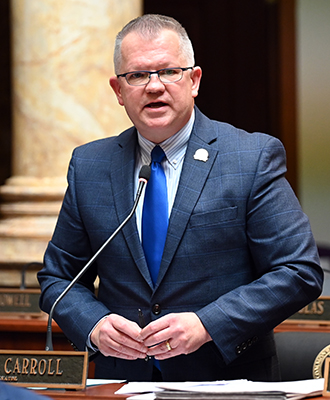
Sen. Danny Carroll, R-Benton, testifies Tuesday on Senate Bill 162 during the Senate session. The measure would be the catalyst for the comprehensive overhaul of Kentucky's troubled juvenile justice system. A high-res version of the photo can found here.
Audio: An audio clip of Carroll is available here.
FRANKFORT — Two criminal justice measures — Senate Bill 162 and Senate Bill 158 — advanced off the Senate floor Tuesday, and supporters say both bills would be catalysts for a comprehensive overhaul of Kentucky's troubled juvenile justice system.
Senate Bill 162 is based on the efforts of a legislative work group that began meeting in January to review ongoing issues in the state Department of Juvenile Justice (DJJ). The group has toured facilities throughout the state and met with numerous officials from all levels of the government, including former employees.
The bill's primary sponsor, Sen. Danny Carroll, R-Benton, said the review revealed a myriad of problems within the department — severe understaffing, a culture of self-preservation in management, fear of retaliation on the frontlines, a lack of faith in leadership, a breakdown in communication, and a lack of services for youth with severe mental illness.
"Senate Bill 162 will not solve all these issues within DJJ," Carroll said. "But it will address the most pressing issues, and it will lay a foundation for additional changes to occur in the near future."
DJJ has faced greater scrutiny in response to rioting, fires and the rape of a juvenile in custody, and SB 162, which passed the Senate with unanimous support, is seeking a battery of reforms.
The legislation calls on the department to return to a regional model of detention that keeps youths closer to home and better segregates males from females and violent offenders from the non-violent population.
It would also create a compliance division within the department and place all eight of Kentucky's juvenile detention centers under one office with a lead supervisor who reports directly the commissioner.
Other provisions would improve data tracking, increase training and require DJJ to maintain treatment options for children with severe emotional disturbances or mental illness. The bill would also allocate millions of dollars to enhance salaries and improve staffing ratios inside facilities.
Elsewhere in the bill, lawmakers are seeking to strengthen oversight of the state's Juvenile Justice Advisory Council.
"DJJ has become what they were created to stop, no questions about that," Carroll said. "All of the things that have been occurring are without a question, a recipe for disaster. And that disaster has manifested itself repeatedly over the past couple of years."
Senate Minority Floor Leader Gerald A. Neal, D-Louisville, said a lack of staffing has been one of the biggest reasons for problems at the juvenile detention centers, but added that there's no magic bullet.
"There is a degree of crisis associated with this," he said. "And I think that this bill offers what I would consider to be a prime opportunity. And what do I mean by that? Not just so that we can address this here, but it also shines a beacon on what's happening nationally as well."
Sen. Robin L. Webb, D-Grayson, encouraged lawmakers to find a tailor-made approach that best suits the needs of both urban and rural children, helping them get back on track and avoid adult corrections.
"I just hope as we move forward with what we are creating that we look at data-driven policies in juvenile justice," Webb said.
Tuesday's second juvenile justice measure — Senate Bill 158 — also won broad, bipartisan support on the floor.
Senate Pro Tem David P. Givens, R-Greensburg, who is the primary sponsor of the bill, said it calls for an independent performance review of DJJ detention facilities to be completed by mid-October.
Having access to employees is vital to getting a realistic idea of how things are going within the facilities, he said.
"There's a lot of concern that fact-finding can't happen in an atmosphere of oppression. And sadly enough, the culture and atmosphere in these facilities has been, 'Don't tell. Don't talk.' That's creating part of the culture problem in these facilities," he said.
Both bills now head to the House for consideration.
Birthing center bill receives Licensing and Occupations Committee approval
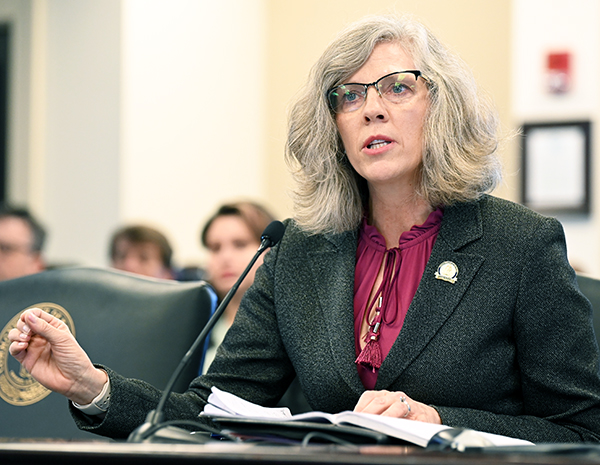
Sen. Shelley Funke Frommeyer testifies Tuesday on Senate Bill 67 during the Senate Licensing and Occupations Committee meeting. A high res version of the photo can be found here.
Audio: Two audio clips of Sen. Funke Frommeyer testifying on SB 67 are available here and here. An audio clip of Senate Minority Caucus Chair Reginald Thomas, D-Lexington, commenting on the bill is available here.
FRANKFORT —The Senate Licensing and Occupations Committee advanced a bill Tuesday that seeks to reduce some of the legal and regulatory hurdles for opening freestanding birthing centers in Kentucky.
Sen. Shelley Funke Frommeyer, R-Alexandria, is Senate Bill 67's primary sponsor. She said that while freestanding birthing centers are already allowed in Kentucky, the measure seeks to modernize state statutes. It would also waive a requirement for centers to obtain a certificate of need when the center has four or fewer beds.
The legislation moved out of committee on a 7-3 vote with 1 pass. It now heads to the full Senate for consideration.
During testimony, Funke Frommeyer cited a 2017 example of a midwife who went through multiple appeals and exhausted her financial resources trying to open a center in Kentucky without success.
"Our point is reducing government intervention," she said. "We are pushing toward more free enterprise, reducing the cost to families, the cost to insurance companies and the cost to the state of Kentucky. We want to increase safety."
SB 67 defines freestanding birthing centers as any health facility or institution that is not part of a hospital but provides care during labor, delivery and the immediate postpartum period. The centers could also provide education.
"Freestanding birthing centers will give women and families a place for prenatal and perinatal mental health and anxiety attention. It will be much like an outpatient birthing experience," Funke Frommeyer said.
Other provisions in the bill clarify that center staff must complete records for vital statistics — such as birth certificates and paternity documents — and perform newborn screenings for heritable and congenital disorders.
Nancy Galvagni, president of the Kentucky Hospital Association, testified that the birthing centers must have proper oversight from an obstetrician, and she expressed concerns about safety at the centers. She said since 1983, six applications for a certificate of need for birthing centers were filed with the state. Three of them were granted and three of those were denied.
"If a complication during birth arises, a quick transfer from the birthing center to the hospital is going to be critical for the health and life of the mother and child, and without those written transfer agreements in place, a complicated birth could easily lead to the death of the mother, the baby, or both," she said.
Galvagni mentioned birthing centers in Tennessee and West Virginia that are owned by hospitals.
One at Vanderbilt University is operated under the direction of an obstetrician. It employs advanced practice nurse midwives, all of whom are credentialed by the Vanderbilt hospital, and it has the ability to quickly move a problematic birth to the university's hospital. It's not operated by non-nurse midwives as has been proposed here in Kentucky, she said.
Funke Frommeyer testified that those who have worked on the legislation tried to include some of the concerns hospital officials have expressed about the birthing centers.
Sen. John Schickel, R-Union, chairs the Senate Licensing and Occupations Committee. He said SB 67 was discussed during the legislature's interim period and that committee members should have heard sooner from those who oppose the legislation.
Sen. Donald Douglas, R-Nicholasville, who is a practicing physician, said he sees the bill in two different parts — one about the freestanding birthing centers and one about the certificates of need. He said safety is extremely important.
"I love to cut costs. Anyone who knows me here in the Senate knows I want to cut costs because I want our taxpayers in the Commonwealth of Kentucky to stop carrying all that burden — that is those who are producing income. But not at the cost of lives," he said.
Douglas said the bill is a very good one, but more work needs to be done with it.
Senate Majority Floor Leader Damon, R-Georgetown, said he said he didn't know if the bill would advance off the Senate floor. However, he described the legislation as going in the right direction.
"It's very likely that we're going to have a task force or a working group or one or two committee meetings dedicated to the certificate of need issue this summer," he said.
Senate Minority Caucus Chair Reginald Thomas, D-Lexington, voted for the bill, noting that most of the births around the world occur outside a hospital setting.
"What makes me want to say 'yes' is that 42 states already do this, and not one of them has said this was a bad idea and reversed course," Thomas said. "So we know it works here in the country. I just hate it when Kentucky is always bringing up the rear instead of leading."
Religious freedom bill clears House Education Committee
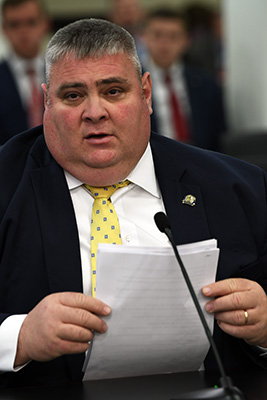
Rep. Chris Fugate, R-Chavies, testifies on House Bill 547, a religious freedom bill for public school faculty and staff, before the House Education Committee. A high-res version can be found here.
Audio: An audio version of the story is available here.
FRANKFORT —A bill to protect the religious freedom of public school teachers, faculty and staff is on the move in the Kentucky House of Representatives.
The House Education Committee approved House Bill 547 on Tuesday. The bill's primary sponsor, Rep. Chris Fugate, R-Chavies, said the bill was inspired by a Supreme Court case that involved a high school football coach in Washington state who was fired for leading a group in prayer after a game.
"House Bill 547 is a bill that protects the faculty and staff's religious freedom in public schools," Fugate said. "It ensures the faculty that they have a right to express their faith. They may sponsor religious activities, student activities. They are protected from coercion and threats by government officials."
Under HB 547, a public school district employee would be permitted to engage in religious expression and discussion and share religious materials with other employees. The bill would also permit prayer or participation in religious study during breaks, during lunch or before or after school.
Public school employees would also be allowed to sponsor student religious clubs or organizations, plan religious events, wear religious clothing, symbols or jewelry. They would also be permitted to decorate their desks or other personal spaces with personal items that reflect their religious beliefs under HB 547.
A specific provision of the bill clarifies that no one should be required to participate in any prayer or other religious activity.
Rep. Tina Bojanowski, D-Louisville, asked Fugate to clarify why this legislation is needed in Kentucky.
"I know I've had conversations about religion with colleagues in my school building. We have a Fellowship of Christian Athletes group. Why do we need this legislation and why isn't it already covered with the First Amendment and our Constitution?" Bojanowski asked.
Fugate said HB 547 is needed due to out-of-state groups protesting prayer before football games.
"I hope that this bill shows that the teachers in Kentucky are supported by not only the Kentucky General Assembly but by the Supreme Court of the United States," Fugate said.
A couple of people expressed concerns about the bill, like Kate Miller, the advocacy director for the American Civil Liberties Union of Kentucky. She said the bill creates a "gray area" that could cause increased litigation for school districts.
"We hope that the Kentucky General Assembly would consider amending the legislation to be more specifically in line with the Supreme Court decision," Miller said.
Rep. Kevin Jackson, R-Bowling Green, said he would vote "yes" on HB 547 in committee, but said he is afraid the bill might create a "slippery slope."
"I just worry sometimes if we're going to give our teachers and our schools and our educators so many different things that they have to keep up with that we're going to continue to have a shortage of educators in the state of Kentucky," Jackson said. "So, again, I want us to be careful."
Rep. Josie Raymond, D-Louisville, also voted "yes" on HB 547 because she believes "all people should be able to bring their whole selves to work."
HB 547 will now go before the full House for consideration.
This Week at the State Capitol
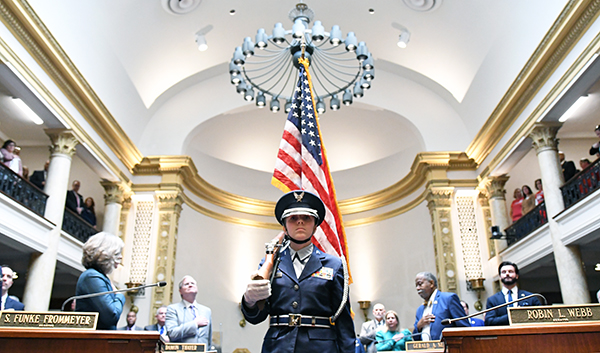
The American flag is presented on the Senate floor. A high-res version of this photo is available here.
Audio: An audio version of the story is available here.
FRANKFORT —State lawmakers spent the fifth week of the 2023 legislative session welcoming a new member to the ranks and debating a wave of high-profile bills on juvenile justice, gray machines, gender services and adult performances.
The Kentucky General Assembly only has 10 days left in the session, and virtually all of the most prominent bills are hanging in the balance. That means lawmakers face a busy schedule ahead before they break for potential vetoes on March 16, and the pace was already accelerating this week.
The House passed legislation on Kentucky's troubled juvenile justice system out of committee and off the chamber floor on Tuesday.
House Bill 3 seeks to reopen the Jefferson County Youth Detention Center and expand options for mental health care and restorative justice. It would also require that children taken into custody for a violent felony offense be detained a maximum of 48 hours before receiving a detention hearing and an evaluation on mental health and substance use disorders.
In addition, HB 3 would make violent youth offenses subject to open records for three years.
The Senate advanced a broader reform package out of committee Wednesday that seeks a comprehensive overhaul of juvenile justice — one that returns to a regional model of detention.
Senate Bill 162 would place all eight of Kentucky's juvenile detention centers under one office with a lead supervisor who reports directly the commissioner. Among many other changes, the bill would increase staffing and training, enhance mental health interventions, and provide better segregation of violent offenders.
On Thursday, the focus turned toward adult performances when the Senate passed Senate Bill 115 out of committee following some charged debate.
The bill would prohibit sexually-explicit performances on publically-owned property or in locations where the performances could be viewed by minors. That would include performances "involving male or female impersonators who provide entertainment that appeals to a prurient interest," according to the bill.
Later in the day, the House advanced legislation on gender-related services out of committee and off the House floor, generating similar contention among legislators.
House Bill 470 would create broad prohibitions against what it describes as "gender transition services" for anyone under age 18, including the use of puberty blockers, hormones and surgery. It would also block any public funding for those services and establish legal liability for claims against health care providers.
During an emotional debate, lawmakers sparred over medical evidence related to the issue. Supporters said the bill is needed to protect children from life-altering drugs and procedures, but critics said it will harm the mental health of transgender youths and interfere with parental rights.
The measure now heads to the Senate.
Lawmakers also worked into the evening on Thursday to pass a much-watched bill on gray machines, also called skill games, out of committee. House Bill 594 would clarify that gray machines are illegal in Kentucky; however, the measure was tabled on the House floor on Friday.
In the meantime, one new lawmaker has joined the action. Sen. Cassie Chambers Armstrong, D- Louisville, was sworn into the Senate on Thursday, filling the vacant seat of former state senator and now U.S. Rep. Morgan McGarvey.
Here's a look at some of the other legislation moving through the process this week:
Autonomous Vehicles: House Bill 135 would provide a regulatory framework for the use of fully autonomous vehicles on public highways. The House Transportation Committee passed the bill Tuesday.
Animal Abuse: House Bill 103 would increase the penalty for torturing a dog or cat from a class A misdemeanor on the first offense to a class D felony. It would also expand the definition of torture for this statute. The bill won approval in the House Judiciary Committee on Wednesday.
Drug Test Strips: House Bill 353 would remove fentanyl test strips from state prohibitions on drug paraphernalia. It passed out of the House Judiciary Committee on Wednesday.
Personal Identification: House Bill 21 would help individuals who lack permanent housing obtain a driver's license or personal identification card. It cleared the House floor on Wednesday.
Kentucky Bar Association: House Bill 225 would lift requirements for licensed attorneys to join or pay membership dues to the Kentucky Bar Association. The measure received approval in the House Wednesday.
Safe at Home Act: Senate Bill 79 would expand the Address Confidentiality Program in the Secretary of State's Office, allowing victims of domestic violence, stalking and human trafficking to participate without a judicial protective order. It would also mask the addresses of those victims on more public records. The bill cleared the Senate floor on Wednesday.
Tracking Devices: Senate Bill 199 would outlaw the installation of tracking devices on motor vehicles without the consent of the vehicle owner or lessee. It passed out of the Senate Judiciary Committee on Thursday.
DUI Restitution: The Senate Judiciary Committee also passed Senate Bill 268 on Thursday. The legislation would allow courts to order restitution for children whose parents are killed or permanently disabled by an intoxicated driver.
Student Discipline: Senate Bill 202 would give local school boards more flexibility to place students into alternative learning programs if the student considered a safety threat or is likely to cause a substantial disruption. The Senate Education Committee advanced the bill on Thursday. A separate measure related to student expulsions, House Bill 538, cleared the House floor on Friday.
Unemployment Insurance: House Bill 146 cleared the Senate Committee on Economic Development, Tourism and Labor on Thursday. It would set the minimum duration of unemployment benefits to 16 weeks — instead of 12 — and call on state unemployment officials to advise claimants on scholarship opportunities.
Student Vaccines: House Bill 101 would prevent the Kentucky Board of Education from requiring students to have a COVID-19 vaccine to attend school. The bill advanced Thursday out of the House Health Services Committee.
Teacher Misconduct: House Bill 288 seeks stronger requirements for disclosing teacher misconduct. It also sets forth a process to vet candidates more thoroughly and act decisively when allegations have been investigated and confirmed. The measure cleared the House floor on Thursday.
License Plate Readers: Under Senate Bill 129, entities that use automated license plate readers would be prohibited from selling that data or retaining it for more than 90 days, with some exceptions. SB 129 passed off the Senate floor Friday.
Child Abuse: Senate Bill 229 seeks to ensure that law enforcement, social services and other authorities are properly notified and communicating in cases of child abuse. The full Senate advanced the bill on Friday.
Lawmakers are scheduled to return to Frankfort on Tuesday for day 21 of the session.
Kentuckians can track the action through the Legislative Record webpage, which allows users to follow a bill's progression through the chambers.
Citizens can also share their views on issues with lawmakers by calling the General Assembly's toll-free message line at 1-800-372-7181.
Bill to ban gray machines advances from House committee
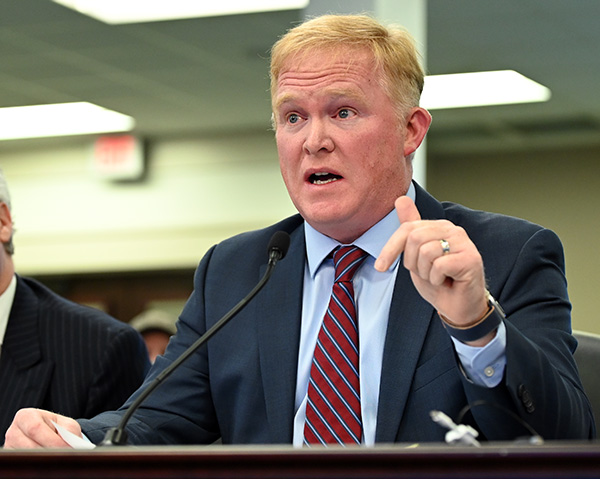
Rep. Killian Timoney, R-Nicholasville, presents House Bill 594, a bill to regulate gaming machines, before the House Licensing, Occupations and Administrative Regulations Committee. A high-res version can be found here.
FRANKFORT —The issue of gray machines, or skill games, in Kentucky is back at the forefront for the Kentucky House of Representatives this legislative session.
The House Licensing, Occupations and Administrative Regulations Committee approved House Bill 594 on Thursday. The bill's primary sponsor, Rep. Killian Timoney, R-Nicholasville, said the purpose of the bill is to clarify what types of gaming are legal under Kentucky law.
"This bill explicitly states that the machines that operate the way gray machines operate are illegal," Timoney said.
HB 594 carves out exceptions for charitable gaming, e-sports competitions and skill-based contests. The bill defines "coin-operated amusement machines" like games played at retail establishments like Chuck-E-Cheese. Those along with carnival games would not be banned under this bill, Timoney said. Pari-mutuel wagering and historical horse racing would remain legal as well.
"(This bill) defines the things that are gambling and gambling devices and exempts those that are not," Timoney said.
HB 594 would also create a civil penalty for those who violate the statute. Anyone who conducts, finances, manages, supervises, directs or owns a gambling device would be subject to a $25,000 fine per device payable to the local county government.
Mike Barley, chief public affairs officer for Pace-O-Matic, a gray machines company, said HB 594 would hurt Kentucky small business owners who bring home thousands of dollars a year from these machines.
"Our legal skill games serve as an important lifeline to small businesses with fraternal clubs," Barley said. "They provide consistent, reliable and supplemental revenue for these establishments at a time they need it most."
Rep. Kim Banta, R-Fort Mitchell, said she would like to see gray machines become regulated instead of banned in Kentucky.
"I would like to see it regulated, passed and done," she said before voting "no" on HB 594.
Rep. Emily Callaway, R-Louisville, also voted "no" because her constituents would like to see gray machines remain in operation and she supports regulation.
Rep. Al Gentry, D-Louisville, was one of the lawmakers to vote "yes" on HB 594. He believes legalizing and regulating casino gaming is the better route when it comes to gaming in Kentucky.
"It's in my opinion the proper way to do this," Gentry said. "The real focus is tourism. The real focus is generating non-resident tax revenues."
HB 594 is now before the full House for consideration after a 13-7 vote in committee.
Senate bill seeks restitution when children lose parents in DUI crashes
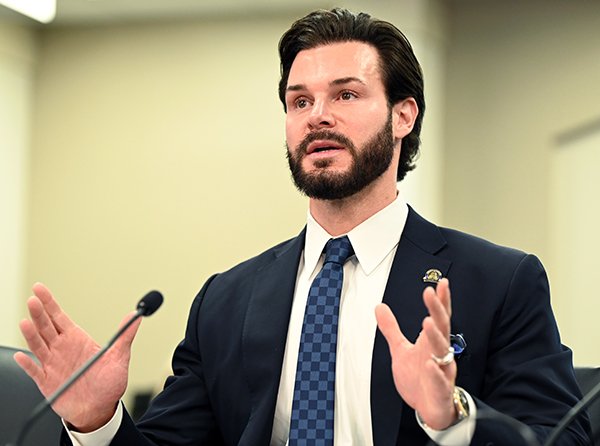
Sen. David Yates, D-Louisville, testifies Thursday during the Senate Judiciary Committee meeting. He spoke on Senate Bill 268, which would allow courts to order restitution for children whose parents are killed or disabled by impaired drivers. A high-res photo can be found here.
Audio: An audio version of the story is available here.
FRANKFORT —The Senate Judiciary Committee voted unanimously Thursday to advance a bill that would allow courts to order restitution for children whose parents are killed or permanently disabled by an intoxicated driver.
The legislation — Senate Bill 268 — is named Melanie's Law after the cousin of the bill's sponsor, Sen. David Yates, D-Louisville. Melanie was left seriously injured following a crash involving an impaired driver.
Yates said his cousin is two weeks younger than he is, and she remains "hooked up on machines," fighting for her life after the vehicular crash last summer. Melanie's son, Nolan, was also in her vehicle during the crash, Yates said.
"We pray for a miracle every day for Melanie, but we know there's no way that she will ever be able to provide for this child," he said.
Yates said he learned as an attorney that it's not uncommon for similar situations to occur. He said many of those who are incarcerated for DUI-related charges spend "a little time in prison and come out" and go on with their lives.
"But for Nolan, he's going to struggle. And so what I believe is this is about fairness for the child. This is about accountability for the offender. It's the deterrent effect, because it's something that people will talk about," he said.
According to the bill, the convicted driver shall pay restitution to each child or dependent of the victim until the child or dependent reaches 18 years of age — or possibly longer if the child is still in high school.
The court shall determine an amount of restitution that is reasonable and necessary after considering all relevant factors. That includes the financial needs and resources of the child and the standard of living to which the child is accustomed, the bill states.
If a defendant who is ordered to pay child support is incarcerated and unable to pay restitution, they will have up to one year after release to begin making payments.
Yates said the measure will encourage justice for the victims.
Sen. Danny Carroll, R-Benton, said the bill seeks accountability.
"Fairness, accountability and justice — those are words that I love," he said. "We spend so much time these days trying to make offenders whole that we forget about the victims."
Senate Appropriations and Revenue Committee passes juvenile justice bill
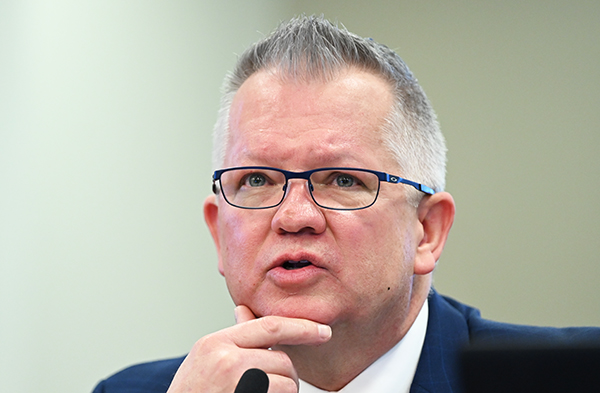
A photo from today's Senate Appropriations and Revenue Committee meeting can be found here. It shows Sen. Danny Carroll, R-Benton, testifying on a legislative overhaul of juvenile justice.
Audio: An audio version of the story is available here.
FRANKFORT — The Senate Appropriations and Revenue Committee voted unanimously Wednesday to advance a comprehensive overhaul of Kentucky's troubled juvenile justice system that would increase staffing, improve mental health interventions, and keep youths closer to home.
The legislation — Senate Bill 162 — is based on the efforts of a legislative work group that began meeting in January to review ongoing issues in the state Department of Juvenile Justice (DJJ). The group met with numerous state officials from all levels of the department, including former employees, and toured facilities throughout the state during the review.
While SB 162 would not solve all the problems the group identified, it would address most of pressing issues and provide a foundation for future reforms, according to the lead sponsor, Sen. Danny Carroll, R-Benton.
"You all are aware of all the issues faced by DJJ, not just over recent months, but over recent years," Carroll told lawmakers Wednesday. "Rioting, fires, the violent rape of a young woman; another young, severely mentally ill woman confined to a cell, often naked, refusing to eat or bathe and receiving no physical or mental health care."
He said the review found understaffing within DJJ, a culture of self-preservation at the management level, fear of retaliation on the frontlines, a lack of faith in some management personnel, sparse or no communications, and a lack of services for youth with severe mental illness.
Among many provisions in the bill, it would create a compliance division within the department and place all eight of Kentucky's juvenile detention centers under one office with a lead supervisor who reports directly the commissioner.
The legislation also calls on the department to return to a regional model of detention that keeps youths closer to home and better segregates males from females and violent offenders from the non-violent population.
On mental health, SB 162 requires DJJ to maintain treatment options for children with severe emotional disturbances or mental illness. Other portions of the bill call for better data tracking, additional training — including for leadership — and a policy for youth workers to wear uniforms.
It also would channel millions of dollars into the system to improve salaries, expand the ranks of youth workers, upgrade security, develop an offender management system and improve diversion for youths with severe mental illness.
Committee members said changes in the DJJ population have made operations more complicated in recent years, and Carroll added that all of the issues combined with a more violent population were a "recipe for disaster."
"That disaster has occurred repeatedly over the past couple of years. And today, even though temporary safety measures are in place, DJJ remains in a state of crisis in many areas," he said.
Sen. Shelley Funke Frommeyer, R-Alexandria, asked about housing males and females in the regional centers.
Carroll said one goal is to establish a safe environment that houses females in different areas with controlled access. If a riot breaks out in the male section of the facility, "they would be unable to gain access to the control room that would give them access to the female area."
Senate President Pro Tem David P. Givens, R-Greensburg, sponsored the resolution earlier this year to create the DJJ working group. He called the unstructured culture at DJJ a major issue.
"It's embarrassing that we have to write into legislation that professionals in this space should be required to wear a uniform," he said. "That's embarrassing."
Sen. Robin L. Webb, D-Grayson, said there are many cultural changes affecting justice issues, including changes to family life and gang membership.
"We've had a change of people that we're serving as juveniles and the societal issues that they face and all of those things," she said. "We're usually slow to adapt and other states are going through the same thing."
Webb said staffing is very important, and she also stands behind the regional model for facilities.
"Everybody in the system has got to work together to improve the system. Everybody that touches that juvenile has got to work together. And that's why I think staffing is important," she said.
Carroll told committee members that the Legislative Oversight and Investigations Committee continues to investigate the how and why DJJ ended up in crisis. The state's Juvenile Justice Oversight Council will also continue to review DJJ over the legislative interim and make recommendations for further action next session.
In addition to Wednesday's reform bill, the committee also advanced legislation — Senate Bill 158 — that calls for independent auditors to conduct a full performance review of DJJ's detention facilities.
Givens, who is sponsoring SB 158, said it will help get to the core of the culture question.
House takes step to impose harsher penalties for torture of a dog, cat
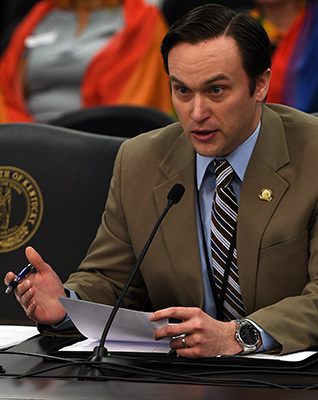
Rep. Nick Wilson, R-Williamsburg, presents House Bill 103, which aims to impose harsher penalties for torture of a dog or cat, before the House Judiciary Committee. A high-res version of the photo can be found here.
FRANKFORT — Changes to Kentucky's animal cruelty laws could be on the way under a new House bill.
House Bill 103 would redefine what torture, physical injury and serious physical injury or infirmity of a dog or cat means in state statute and make the first offense a class D felony, according to bill co-sponsor Rep. Nick Wilson, R-Williamsburg. The bipartisan bill's primary sponsor is Rep. Ryan Dotson, R-Winchester.
"This bill is badly needed," Wilson said. "There is a blind spot that I have experienced when it comes to the laws on animal abuse. During my experience as a prosecutor, we rarely had good options on combating animal abuse behavior."
Wilson shared an example of a case where a person shot a dog more than 30 times, but under current state law, the person could only be charged with a class A misdemeanor on the first offense. HB 103 would change that to a class D felony.
Under HB 103, torture would be defined as the intentional infliction or subjection to extreme physical pain or serious injury or death to a dog or cat. That would include injuries that occur because a dog or cat is restrained, such as being in dumped in a dumpster, sealed in a plastic bag or box, abandoned, or manually restrained, chained or tied down.
Some examples of torture of a dog or cat defined in the bill include, intentionally causing fractures, cuts, burns, bruises, punctures, hanging, impaling, skinning alive, physical disfigurement, dehydration, starvation, hyperthermia, hypothermia or death.
The bill would also allow a tortured dog or cat to be humanely euthanized at the recommendation of a veterinarian if the animal is seized but still alive and suffering.
Wilson said Dotson worked with many groups, including sportsmen and hunters, to craft this bill.
"(HB 103) has common sense exceptions for hunting, fishing, trapping, humane purposes, veterinary purposes, cosmetics, spay and neutering, sporting activities like dog shows, bonafide animal research, self-defense or defense of another person or pet," Wilson said.
Rep. Derek Lewis, R-London, asked Wilson if any sporting groups had any issues with the bill. Wilson said he was not aware of any.
Rep. Kim Banta, R-Fort Mitchell, spoke in favor of HB 103, but wants the Kentucky General Assembly to continue to strengthen animal cruelty laws.
"I think this is a good bill," she said. "I am going to be a 'yes.' It doesn't go far enough. I literally cannot stand this or any kind of abuse ... I say let's keep going."
HB 103 cleared the House Judiciary Committee by a 15-0 vote with two pass votes. It will now go before the full House for consideration.
Bill addressing juvenile justice reform clears House floor
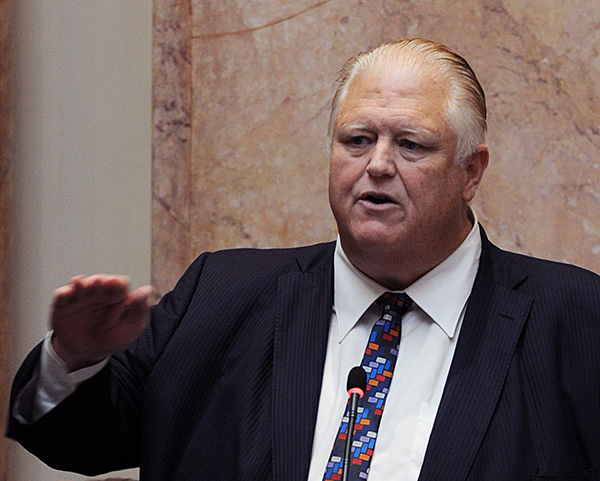
Rep. Kevin D. Bratcher, R-Louisville, presents juvenile justice legislation, House Bill 3, on the House floor. A high-res version of the photo can be found here.
FRANKFORT — A bill to reopen the Jefferson County Youth Detention center and expand mental health and restorative justice options for juveniles in the justice system advanced off the House floor Tuesday.
Bill sponsor Rep. Kevin D. Bratcher, R-Louisville, said House Bill 3 has been in the works for years and addresses many aspects of the juvenile justice system.
One major provision of HB 3 would require children taken into custody for a violent felony offense be detained a maximum of 48 hours before receiving a detention hearing and an evaluation on mental health and substance use disorders.
Bratcher said HB 3 will not "lock (children) up and throw away the key."
Rep. Kimberly Poore Moser, R-Taylor Mill, has worked with Bratcher on the bill to add restorative justice services and expand mental health treatment access.
On the House floor, Moser said the amended version of HB 3 would allow the state Justice and Public Safety Cabinet to enter into a contract with a behavior health service organization that is qualified to provide restorative practices, which are designed to hold the juvenile accountable to the victim.
"I just really appreciate the work that's been done to not only keep our streets safer, but to provide the kids who are in the justice system with the care that they need," Moser said.
Additionally, HB 3 seeks to hold uncooperative parents accountable when it comes to their child's school attendance or participation in a diversion program and keep records open for three years for children convicted of a violent felony offense. An earlier version of the bill kept records for violent juvenile felony offenders open for five years.
Since HB 3 had its first committee hearing on Feb. 15, more funds have been appropriated in the bill toward the Jefferson County Youth Detention Center and the Department of Juvenile Justice (DJJ) as a whole.
HB 3 would now appropriate $19.1 million toward the renovation and operation of the Jefferson County Youth Detention Center, $5.8 million toward transportation costs at the DJJ, $9.6 million toward staffing needs at the DJJ and $4.5 million toward the renovation of the Jefferson Regional Juvenile Detention Facility at Lyndon.
Rep. Al Gentry, D-Louisville, attempted to amend HB 3 on the floor to remove the open records provision from the bill, but the motion failed.
"These are our kids, and I think it is extremely important that we do everything that we can possibly do to give these kids a chance at a good life, to rehabilitate from the mistakes they may have made," Gentry said.
In response, Bratcher said the purpose of opening records for juvenile violent felony offenders comes at the request of business owners who would like to know if a teenager they're hiring has a violent criminal record. Rep. Jason Nemes, R-Louisville, also said keeping records open for three years would prevent juveniles from being able to purchase a firearm.
Rep. Matt Lockett, R-Nicholasville, urged his colleagues to remember the victims of crime when considering HB 3.
"What about the victims? Where is their justice? Why are we not standing up for them? And I believe that this bill does that," Lockett said.
Several representatives from Louisville said their constituents are happy the Jefferson County Youth Detention Center would be reopened under HB 3. Rep. Keturah Herron, D-Louisville, is one of those lawmakers, but she believes the bill could do more.
"We cannot spend $39 million on incarcerating kids and not spend a penny on reentry, on intervention, on prevention and on alternatives to detention," Herron said.
In his final remarks, Bratcher said he hoped everyone would vote "yes" on the bill and "get the healing started in this state."
House Bill 3 was approved by a 79-18 vote. It will now go to the Senate for consideration.
Senate Families and Children Committee advances child abuse bill

Senate Majority Caucus Chair Julie Raque Adams, R-Louisville, testifies on Senate Bill 229, which would ensure that child abuse is properly reported to multiple agencies. A high-res version of the photo can be found here.
FRANKFORT —The Senate Families and Children Committee advanced a bill on Tuesday to ensure law enforcement, social services and other authorities are properly notified and communicating in cases of child abuse.
Senate Majority Caucus Chair Julie Raque Adams, R-Louisville, is sponsoring the bill. She said the legislation has been in discussions for several years following reports of child abuse in the Louisville Metro Police's Explorer Scout program.
"Part of the reason it was so frustrating is because they used kind of these loopholes in our current statute to avoid notifying the appropriate agencies," she said.
SB 229 calls for people reporting child abuse to immediately notify the proper authorities along with the leaders of institutions, schools and other agencies where the allegations occurred, regardless of the internal chain of command.
Authorities include the Kentucky State Police, the Cabinet for Health and Family Services, a Commonwealth's attorney or a county attorney, according to the bill.
Leaders of the agency under investigation would be required to facilitate cooperation with those authorities, and any person who uses intimidation, retaliation, or obstruction to stifle the case would be guilty of a Class A misdemeanor.
The bill would also allow the Department for Community Based Services to initiate an assessment or an investigation when child abuse or neglect is suspected.
Supporters said one goal of the bill is to ensure that multiple agencies are involved and cooperating in the investigation.
Caroline Ruschell, chief executive officer of the Children's Advocacy Centers of Kentucky, testified Tuesday that multiple agencies are critical when dealing with often horrific and heart-wrenching cases of abuse.
"These cases are complex. Children are complex. They have medical needs. They have mental health needs," Ruschell said. "There are prosecution needs if the case is going to move forward to prosecution."
Without cooperation between agencies, children and families won't get the help they need, she said.
"Here's the problem: None of those agencies can respond properly," Ruschell said. "We can't do what we need to do if the information isn't shared. And that's what this does. It ensures the right agencies get the information so that the kids and families get what they need."
Sen. Danny Carroll, R-Benton, said he was concerned about school systems conducting investigations and how cases could be destroyed.
"I know we had a bill a couple of years ago dealing with the school system," he said. "There are concerns about school systems doing their own investigations when these allegations come up and concerns about tainting investigations."
The bill was approved with a 7-0 vote and now heads to the full House for consideration.
The next committee meeting is Tuesday, March 7 at 9 a.m.
Bill addressing student discipline advances from House Education Committee
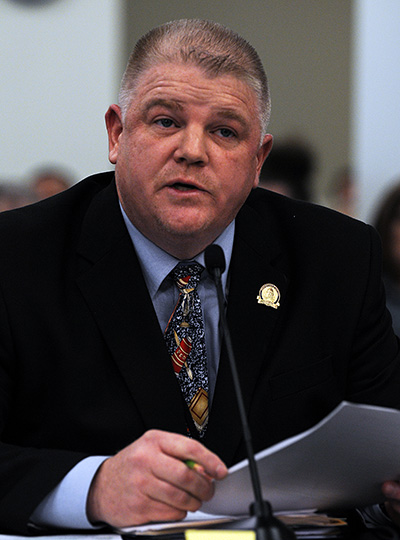
House Education Committee Vice-chair Rep. Timmy Truett, R-McKee, testifies on House Bill 538, which aims to address student discipline issues at public schools. A high-res version of the photo can be found here.
FRANKFORT — Lawmakers began to take the next step in addressing Kentucky's teacher shortage during Tuesday's House Education Committee meeting.
House Bill 538 would make changes to the student discipline process. Committee Vice-chair Rep. Timmy Truett, R-McKee, who is also an elementary school principal, said the bill is important when it comes to addressing Kentucky's education problems.
"This bill offers guidelines, procedures for how to handle disciplinary actions inside the school setting," Truett said. "Also the goal of this is to empower teachers to control what happens inside their classrooms. And by doing both of these things, I believe we can help with recruitment, and we can help with retention."
Under HB 538, school boards would be required to adopt policy that would require schools to expel students for at least 12 months when they pose a threat to the safety and wellbeing of students and school personnel. School boards would also be required to adopt policy that would require disciplinary action for a student who has physically assaulted, battered or abused personnel or other students off school property if the incident is likely to disrupt the educational process.
The bill would also permit a superintendent to place a student in an alternative program, including a virtual alternative program, if it is deemed appropriate for the student.
For teachers, the bill would prohibit a disruptive student who was removed from a classroom from returning for the remainder of the school day unless the teacher allows it. The bill also would deem a student who is removed from a classroom three times within a 30-day period as chronically disruptive and allow that student to be suspended.
Rockcastle County Schools Superintendent Carrie Ballinger joined Truett in testifying in favor of HB 538.
"This gives our administrators ability to make decisions on a case-by-case basis," Ballinger said.
During discussion, Rep. Felicia Rabourn, R-Pendleton, said she has concerns about the provision that handles disciplining students for incidents that happen outside of school.
"I would argue that section of the bill is completely unconstitutional," Rabourn said. "I don't believe it's the proper role of the school to interfere with what happens after school hours."
Eric Kennedy, director of advocacy for the Kentucky School Boards Association, said the language in the bill is narrowly written and in alignment with current law.
Rep. Lisa Willner, D-Louisville, said she has concerns about what she believes will be unintended consequences of HB 538.
"We know that we have disproportionate outcomes in discipline by race, by poverty, by disability, by these other concerns," she said, asking if there are any guardrails in place in the bill to address those issues.
Truett said the classroom removal portion of the bill gives principals the ability to review why a student is having an issue with a particular teacher and determine if a situation warrants disciplinary action on a case-by-case basis.
"My goal is not to have more kids expelled," Truett said. "My goal is to have safety in the classroom and provide instruction to those students as opposed to expelling students and kicking them outside the school setting."
Rep. Steve Riley, R-Glasgow, spoke in favor of HB 538. He said the "status-quo cannot continue in schools."
"It is not fair to the 95% of our students who go to school to learn to not be able to learn in the classroom because of the constant disruptions," Riley added.
The House Education Committee approved HB 538 by a 17-4 vote. It will now go before the full House for consideration.
This Week at the State Capitol
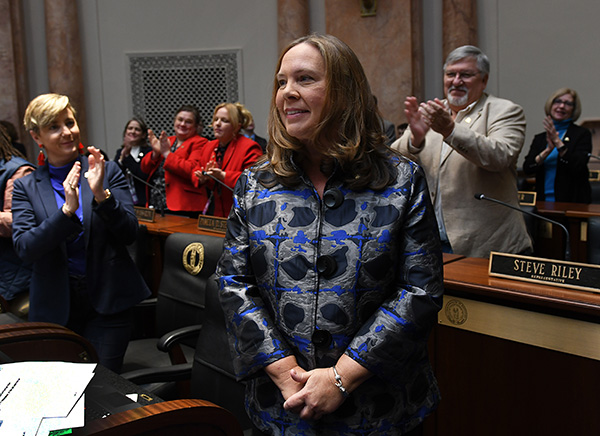
Majority Caucus Chair Suzanne Miles receives accolades on the House floor as the first woman who has served as both an acting floor leader and an acting speaker in the chamber. A high-res version of the photo can be found here.
FRANKFORT — The Kentucky General Assembly has passed the halfway mark in the 2023 legislative session, and education is quickly becoming the headline issue as lawmakers continue to debate content in public schools and seek to address gaps in the teacher workforce.
The fourth week of the session brought a more complete view of the issues that lawmakers plan to tackle in 2023. That's because Tuesday was the last day for new bills in the Senate and Wednesday was the last day in the House.
As of Thursday morning, more than 870 bills had been filed in the two chambers combined.
Among them, measures on postpartum depression, unemployment insurance, firearms, hazing and data privacy were all on the move this week. But few issues garnered as much attention as Senate Bill 5, which sparked lengthy debates in committee and on the Senate floor Thursday.
SB 5 calls on local school boards to create a new, multi-pronged process for resolving objections over explicit materials in public schools. Supporters say it would help parents protect their children from harmful content and challenge materials that don't align with their values. Critics say it amounts to censorship that will hinder lessons on important topics.
The bill is one of several this year related to sensitive subjects and policies in public schools. It now heads to the House along with another education measure, Senate Bill 107, which likewise won approval in the Senate on Thursday.
SB 107 would establish a new seven-member committee — appointed by the governor and confirmed by the Senate — to nominate appointments to the state Board of Education. It would also require Senate confirmation for appointments to the position of state education commissioner.
Meanwhile in the House, legislation that seeks to ease teacher shortages, House Bill 319, was also advancing this week. The measure would clear the way for Kentucky to participate in the Interstate Teachers Mobility Compact. That would help streamline the process for military spouses who are certified to teach in other states to become certified here.
HB 319 would also allow someone with a bachelor's degree to teach classes in their field on a temporary basis and under the supervision of a certified teacher. The House Education Committee passed the bill on Tuesday
Here's a look at some of the other measures moving forward throughout the last four days:
Personal Identification: House Bill 21 would help individuals who lack permanent housing obtain a driver's license or personal identification card. The House Transportation Committee advanced the bill on Tuesday.
Unemployment Insurance: House Bill 146 would make technical updates to an overhaul of unemployment insurance that lawmakers passed last year. Among the changes, the measure sets the minimum duration of benefits to 16 weeks, instead of 12, and calls on state unemployment officials to advise claimants on scholarship opportunities. HB 146 cleared the House floor on Tuesday.
Physician Wellness: Senate Bill 12 would allow physicians to participate in wellness and career fatigue programs without disclosing their participation to employers. Supporters say it will help physicians deal with job-related burnout without fear of retaliation. The legislation moved off the Senate floor on Tuesday.
License Plate Readers: Under Senate Bill 129, law enforcement agencies, local governments or homeowner associations that use automated license plate readers would be prohibited from selling that data — or retaining it for more than 90 days — with some exceptions. The Senate Transportation Committee advanced the measure on Wednesday.
Firearms: House Bill 153 would prohibit state and local law enforcement agencies and other public officials from enforcing federal firearm bans or regulations enacted after Jan. 1, 2021. The bill cleared the House floor on Wednesday.
Biomarker Testing: House Bill 180 would require health benefit plans to cover biomarker testing for patients who have been diagnosed with cancer and other diseases. The House passed the legislation on Wednesday.
Relief Funds: Senate Bill 99 seeks to enhance oversight and transparency of two Team Kentucky relief funds that the state executive branch established in the aftermath of recent floods and tornados. It passed out of the Senate on Wednesday.
Consumer Data Privacy: Senate Bill 15 passed out of the Senate Economic Development, Tourism and Labor Cabinet on Thursday. It would create new consumer protections related to the collection and processing of personal data online. That includes the right of consumers to delete personal data and opt out of targeted advertising, online tracking and the sale or sharing of personal data.
Health Care Workers: House Bill 200 aims to address a shortage in health care workers by creating the Kentucky Health Care Workforce Investment Fund. It would use both public and private money to increase scholarship opportunities in the field. HB 200 cleared a vote in the House Committee on Health Services on Thursday.
Hazing: Senate Bill 9, known as "Lofton's Law," elevates the act of hazing to a crime. First-degree hazing would qualify as a Class D felony, while second-degree hazing would be a Class A misdemeanor. The Senate passed the measure on Thursday.
Sex Offenders: Senate Bill 80 also passed off the Senate floor on Thursday. It would prohibit those on the sex offender registry from loitering or operating a mobile business within 1,000 feet of schools, daycares, and public playgrounds or swimming pools.
KEES for Proprietary Schools: Senate Bill 54 would allow students to use a Kentucky Educational Excellence Scholarship to attend a qualified propriety school program that is focused on a high-demand work sector. The measure advanced off the Senate floor on Friday. A similar measure — House Bill 85 — moved out of the House Education Committee on Tuesday.
Postpartum Depression: Senate Bill 135 calls on the state Cabinet for Health and Family Services to create a panel focused on perinatal mental health disorders and provide related information and assessment tools for health care providers. The bill cleared the Senate floor on Friday.
The House and Senate are scheduled to gavel back in on Tuesday for day 17 of the session, and lawmakers have three more weeks before they break for a 10-day recess.
That schedule sets aside time for the governor to consider vetoes and leaves two legislative days on the calendar for lawmakers to override any vetoes before adjourning for the year on March 30.
Kentuckians can track the action through the Legislative Record webpage, which allows users to follow a bill's progression through the chambers.
Citizens can also share their views on issues with lawmakers by calling the General Assembly's toll-free message line at 1-800-372-7181.
Senate bill would create a process for obscenity complaints in schools
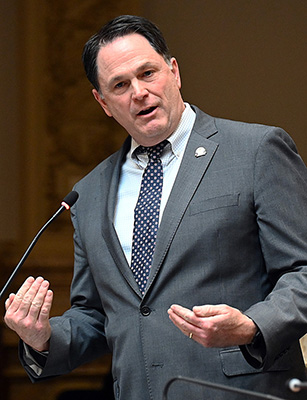
Sen. Jason Howell, R-Murray, speaks on the Senate floor about Senate Bill 5. A high-res version can be found here.
FRANKFORT — The Kentucky Senate approved a bill Thursday that calls on local school boards to create a new, multi-pronged process for resolving objections over explicit materials in public schools.
The measure — Senate Bill 5 — advanced off the Senate floor with a 29-4 vote after nearly an hour of ardent debate and now heads to the House for consideration. The bill moved out of committee following similar deliberations earlier in the day.
Sen. Jason Howell, R-Murray, is sponsoring the bill. He told lawmakers on the Senate floor that it would help ensure parental involvement in materials, events and programs that affect their child's education.
"They need to be able to have a voice when those items are in conflict with their family's values and beliefs," Howell said. "This bill defines a process for a parent to lodge a complaint, to challenge material that they believe is harmful to minors or otherwise inappropriate to be in school."
The legislation would require local school boards to adopt a complaint resolution policy by July 1. It spells out a school principal's responsibilities to investigate the allegations, determine if the material is harmful to minors, and decide if it should remain available. The principal must reply to parents within 10 business days in most cases.
Parents would have the right to appeal a principal's decision directly to the school board. The board must then perform an administrative review, and address the issue in an open meeting that allows public comment. If parents disagree with the school board's decision, they may opt their children out of accessing the material or the event.
SB 5 also directs the Kentucky Department of Education to adopt a model policy for school boards by May 1. Another section seeks to define content that could be deemed harmful to minors.
"This bill brings clarity, consistency and accountability to the process," Howell said. "The goal of this bill is to allow the greatest flexibility possible in evaluating material under local values and norms all across the many diverse communities in our commonwealth."
Opponents of the bill raised concerns on both the floor and in committee, including Kate Miller, advocacy director of the ACLU of Kentucky. She called it state-sponsored censorship, and said limiting access to books inhibits the training of young people to think for themselves.
Senate Minority Caucus Chair Reginald Thomas, D-Lexington, called the measure a book-banning bill. He questioned how schools would teach about important topics — like lynching that involved the castration of Black males — or show historical photos from the Holocaust that might include nudity.
"That's what education is — allowing individual people to read, and be exposed to, and see and learn all different subject matter so that individual can have an understanding ...and critically think and analyze about those different subjects," he said.
Another critic, Sen. David Yates, D-Louisville, agreed that some subjects are too heavy for young ages, but raised concerns that the bill would apply to all grade levels. He said his constituents don't want big government telling them what they can and can't read.
"Education is the way," he said. "It removes the racism, the homophobia, the sexism. Education is the great denominator that moves us forward, and we have to be really, really careful as we limit that."
Supporters of SB 5 challenged many of the comments.
"This is not book banning," said Sen. Lindsey Tichenor, R-Smithfield. "This is putting in precautions to protect children from desensitizing them to sexual content."
Tichenor said some of the books in question include pedophilia, and she asked her colleagues where society should draw the line on materials for children.
A few supporters said some of the disputed content is too obscene to be read aloud in the chamber or in school board meetings.
Sen. Stephen Meredith, R-Leitchfield, said Howell was just trying to create due process for parents to raise objections.
"All he has done has put a mechanism in place to ensure that parents can have a voice in the education of their children," Meredith said. "To suggest otherwise is totally irresponsible and uncalled for. When are we going to let children be children?"
Health care scholarship bill clears House Health Services committee
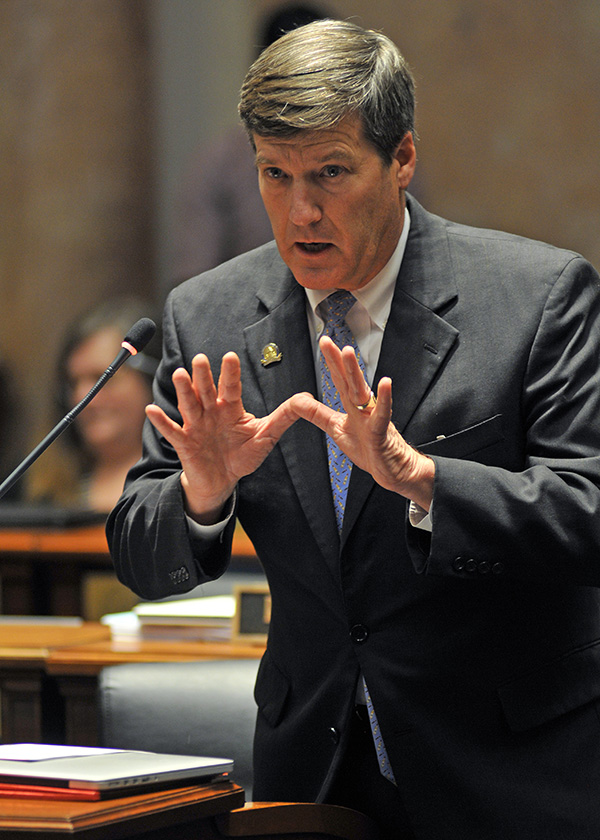
This file photo shows Rep. Ken Fleming, R-Louisville, presenting a bill on the House floor. A high-res version can be found here.
FRANKFORT —A new bill aimed to address Kentucky's health care worker shortage is on the move. The House Health Services Committee approved House Bill 200 on Thursday.
The bill's primary sponsor, Rep. Ken Fleming, R-Louisville, said the bill would enable the Council on Postsecondary Education (CPE), health care programs and health care providers and facilities to match public and private dollars to award scholarships to eligible students. The fund would be called the Kentucky Health Care Workforce Investment Fund.
"We've worked very diligently in terms of trying to get something really innovative to address what I think the two main challenges we have in this Commonwealth: education workforce and health care workforce," Fleming said.
Nursing, nursing aide, mental health, social work and emergency medical services students would be eligible, with 65% of the fund being dedicated to scholarships.
"There is a significant need and deficiency in the eastern part of this state when it comes to EMS workers and so forth," Fleming said.
Fleming said HB 200 will "kick start career paths for all Kentuckians interested in a health care career."
CPE President Aaron Thompson testified alongside Fleming. He agreed there is a dire need in the Commonwealth for health care workers.
"We looked at predictive analytics and see that (the shortage) is going to grow, and if you look at prescriptive ways of handling this, I cannot think of a better legislative process than (HB 200)," Thompson said.
Betsy Johnson, president of the Kentucky Association of Health Care Facilities and the Kentucky Center for Assisted Living, said there are more than 700 open state registered nursing aide positions within the association's member facilities. "Nurse aides are the backbone of long term care, so we appreciate Representative Fleming for including nurse aides in House Bill 200," Johnson said.
Committee Chair Rep. Kimberly Poore Moser, R-Taylor Mill, said she believes HB 200 is a "smart way" to address the health care worker shortage issue.
"I agree that this increases the pipeline, the potential pipeline, for those health care workers," she said.
HB 200 will now go before the full House after receiving approval from the House Health Services Committee by an 18-0 vote with one pass vote.
House approves bill to exempt Kentucky law enforcement from federal firearms bans
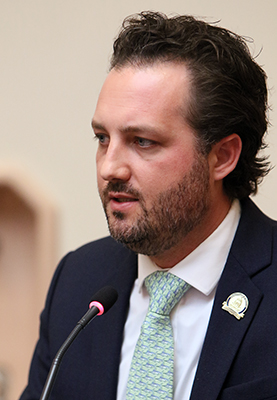
Rep. Josh Bray, R-Mount Vernon, presents House Bill 153 on the House floor. A high-res version of the photo can be found here.
FRANKFORT —Kentucky law enforcement would not be allowed to enforce federal firearms bans under House Bill 153.
Bill sponsor Rep. Josh Bray, R-Mount Vernon, said the law is supported by the U.S. Constitution and would also prohibit enforcement of a firearm accessory or ammunition ban.
"(HB 153) says that the state of Kentucky will not use our tax dollars, our manpower, our resources, to enforce a federal firearms ban on ammunition, magazines, accessories or firearm types," Bray said. "The 10th Amendment to the U.S. Constitution provides that the state cannot be commandeered to enforce federal law."
This is not the first time the Kentucky General Assembly has considered this type of legislation, Bray said, adding that other states already have similar laws in place.
"Why this is so important? It ensures our fellow Kentuckians that the city police, the sheriffs or the state police aren't going to roll up and enforce this unconstitutional (firearm) ban," Bray said.
While debating the bill, House Minority Floor Leader Derrick Graham, D-Frankfort, said he believes HB 153 is unconstitutional.
"I'm coming on the (House) floor to say that we are not following the federal system of government if we tell people, and we let them think that, Kentucky law is supreme over federal law. That's not true," Graham said before citing Article 6, paragraph two of the U.S. Constitution.
Bray disagreed with Graham's interpretation of the bill. He said the bill is supported by the U.S. Constitution and a U.S. Supreme Court ruling from 1997.
"Kentuckians should decide firearm policy through their elected representatives, not through some bureaucrat in Washington D.C. who is changing the interpretation of an existing federal guideline," Bray said.
Rep. Lisa Willner, D-Louisville, also spoke against HB 153. She said her constituents worry about gun violence.
"The people in District 35 worry every day about too little law enforcement of already existing laws," she said. "This law that would increase access to guns would reduce enforcement. It moves us exactly in the wrong direction on both counts."
Rep. Bill Wesley, R-Ravenna, however, said his constituents support HB 153, and people hurt people, not guns.
"I speak on behalf of Eastern Kentucky. We're not giving up any of our weapons," Wesley said.
On the House floor, House Majority Whip Jason Nemes, R-Louisville, also spoke in favor of HB 153. He agrees with Bray that the legislation does not violate the U.S. Constitution.
"The United States Supreme Court said the federal government can have all the laws they want, but they have to enforce them," Nemes said. "We can agree to help them enforce federal law, but we're not required to."
The House approved HB 153 with a 78-19 vote. It will now go before the Senate for consideration.
Senate committee approves measure to prohibit the selling of data from license plate readers
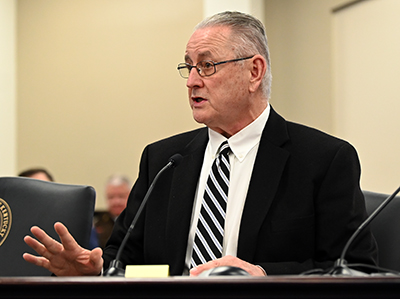
Sen. Jimmy Higdon, R-Lebanon, testifies on Senate Bill 129 during Wednesday's Senate Transportation Committee meeting. A high-res version of the photo can be found here.
FRANKFORT — The Senate Transportation Committee on Wednesday approved a bill to prohibit the selling of data obtained by automated license plate readers systems, among other measures.
Senate Bill 129, sponsored by Sen. Jimmy Higdon, R-Lebanon, was approved with a 7-0 vote. Higdon is also chair of the Transportation Committee.
"My bill today is about ALPR cameras, better known by the brand name Flock cameras, which are quite popular these days. So we wanted to put some regulation on what could be done or how the data could be used," he said.
The automated license plate reader is a system of one or more mobile or fixed high-speed cameras combined with computer algorithms to convert images of license plates into data that is readable by a computer system, Higdon said.
The measure would affect any law enforcement agency, unit of local government or homeowner's association that deploys and maintains ALPRs.
Under the bill, any data captured on the cameras could not be retained for more than 90 days unless it is subject to a subpoena, part of a felony prosecution or is being used to collect tolls. SB 129 would also prevent entities from selling recorded images or data captured by the cameras.
Higdon said the cameras are very popular, and many other states use them.
Sen. Robby Mills, R-Henderson, asked if other states have similar data protection legislation, and Higdon said they do.
"Almost 20 states have passed legislation to regulate the data that these cameras have. We're not trying to stop the cameras, we're just regulating the data that they generate," he said.
House committee approves bill geared toward easing teacher shortage
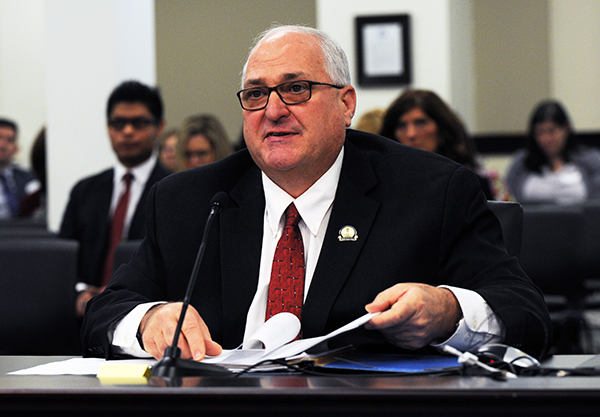
Rep. James Tipton, R-Taylorsville, presents House Bill 319 before the House Education Committee on Tuesday, which aims to address the teacher shortage issue in the Commonwealth. A high-res version of the photo can be found here.
FRANKFORT —A bill aimed to tackle one of the biggest issues facing the Commonwealth this legislative session advanced out of the House Education Committee on Tuesday. education and public safety.
Rep. James Tipton, R-Taylorsville, said he hopes House Bill 319 provides some relief to public schools that are facing a teacher shortage.
"As you know, we've heard testimony that there are between 1,500 and 2,000 current teacher certified job openings at any one time," Tipton said. "We've also been told that many school districts have had job openings that have been posted for the entire year that have not been filled. This would simply be another tool that principals and superintendents could utilize on a short-term basis."
One major provision of HB 319 would cement Kentucky's place in the Interstate Teacher Mobility Compact, if it is created. The compact would support military spouses who are certified to teach in other states by streamlining the pathway to become certified here and vice versa.
HB 319 would also allow someone with at least a bachelor's degree and at least four years of experience in their field to teach that subject under the supervision of a certified teacher. This section of the bill would expire in 2026, Tipton said. The bill would also allow classified personnel such as a teacher's aide to cover a class in a certified teacher's absence.
Additionally, HB 319 would create an online statewide job posting system for school job openings if funds are available, revise requirements for the state's teacher scholarship program, expand the GoTeachKY ambassador program if funds are available, and require exit surveys for school personnel leaving employment.
Tipton said he does not think HB 319 is going to completely solve Kentucky's teacher shortage problem.
"I do believe that House Bill 319 is a good first step to take some positive actions that will remove some of the burden, remove some of the regulation, remove some of the red tape, and make it easier and more conducive for individuals considering going into the teaching profession and to keep them in the teaching profession," he added.
Rep. Josie Raymond, D-Louisville, asked Tipton about the timeline for the Interstate Teacher Mobility Compact. He said the program is being initiated by the Department of Defense, and Kentucky is the 11th state to propose legislation this year to join the compact. The program needs at least 10 states for it to be functional, he added.
Rep. Killian Timoney, R-Nicholasville, said HB 319 addresses a lot of needs, but he does have concerns about pay for a non-certified person in a certified teaching role.
"One of the concerns I have is when we have classified staff covering classes for people who are paid at a certified rate," he said. "... There are going to be some questions that we're going to need to talk budgetary (wise) next year."
Rep. Kevin Jackson, R-Bowling Green, also said he supports HB 319 and hinted there is more legislation to address the teacher shortage on the way.
"We need to do everything we can to get new teachers into the system, but we also need to take care of the ones that we already have and deal with the discipline situations that are occurring in our schools today," Jackson said.
The House Education Committee approved HB 319 by an 18-0 vote with two passes. It will now go before the full House for consideration.
This Week at the State Capitol

Two-year-old Tripp Esterle reacts to a photo of his dad, Master Sgt. Robert Esterle, who is stationed in Guam with the 123rd Contingency Response Group of the Kentucky Air National Guard. Tripp was visiting the Capitol as part of Military Kids Day. A high-res version of the photo can be found here.
FRANKFORT — The Kentucky General Assembly hit a new rhythm this week as lawmakers welcomed military kids to the Capitol and passed more than 50 bills out of committee with a heavy emphasis on both education and public safety.
The fast-paced week drew large crowds to the Capitol campus nearly every day, and when lawmakers gaveled out on Friday morning, more than a third of this year’s 30-day session was in the books.
Wednesday and Thursday marked some of the busiest days of the session so far.
On Wednesday, the House Judiciary Committee advanced House Bill 3, which aims to revamp the state’s troubled juvenile justice system. It would ensure that any juveniles charged with a violent offense receive an evaluation and detention hearing within 48 hours of being taken into custody.
The measure also seeks to reopen a detention center in Louisville, improve accountability among uncooperative parents, and open up records on children convicted of a violent felony for five years. HB 3 now heads to the full House.
The following day brought heated debate when a key education bill – Senate Bill 150 – returned to committee for changes before advancing off the Senate floor that afternoon.
Proponents say SB 150 would provide more parental engagement on school policies or curriculum related to sensitive topics like sexuality, pronouns and student health services. Critics, however, say it could harm student safety and mental health, particularly among transgender students.
The measure now moves to the House for consideration.
Education remained a major theme throughout the week as bills on scholarships, dual credit, staffing and the state education board all cleared important hurdles. Lawmakers also aimed their sights on hazing, sex offenders and hair discrimination over the four days of legislative work.
Here’s a look at some of the issues getting attention:
Dual Credit: The House Education Committee advanced House Bill 18 on Tuesday. It would expand the dual credit options for Kentucky high schoolers by giving freshmen and sophomores the opportunity to take dual credit courses.
KEES for Workforce Training: House Bill 133 would allow students to use the Kentucky Educational Excellence Scholarship to pay for workforce training programs in areas such as computer coding, pharmacy tech or commercial driver’s licensing. The bill also cleared the House Education Committee on Tuesday.
Firearms: House Bill 153 would prohibit local governments and law enforcement agencies from enforcing federal firearm bans. The House Veterans, Military Affairs and Public Protection Committee advanced the measure on Tuesday.
Relief Funds: On Wednesday, the Senate Appropriations and Revenue Committee passed Senate Bill 99. It seeks to enhance oversight of two Team Kentucky emergency relief funds that the state executive branch established in the aftermath of recent floods and tornados.
Physician Wellness: Senate Bill 12 would allow physicians to participate in wellness and career fatigue programs without disclosing their participation to employers. Supporters say it will help physicians deal with job-related burnout without fear of retaliation. The Senate Committee on Health Services advanced the measure on Wednesday.
Hazing: Senate Bill 9, known as “Lofton’s Law,” cleared the Senate Judiciary Committee on Thursday. It spells out criminal penalties for hazing, including first-degree hazing, which would be a Class D felony.
Sex Offenders: Senate Bill 80 also passed out of the Senate Judiciary Committee on Thursday. It would prohibit those on the sex offender registry from loitering within 1,000 feet of schools, daycares, and public playgrounds or swimming pools.
The CROWN Act: Senate Bill 63 prevents discrimination on the basis of hairstyles and hair textures that are historically associated with race. It also cleared the Senate Judiciary Committee on Thursday.
State Education Board: Senate Bill 107 would establish a new seven-member committee – appointed by the governor and confirmed by the Senate – to vet nominations to the state Board of Education. It would also require Senate confirmation for appointments to the position of state education commissioner. The Senate Education Committee advanced the measure on Thursday.
School Staffing: House Bill 32 would allow school districts to hire classified personnel, such as cafeteria workers and bus drivers, without a high school diploma or GED – if the school system provides those employees an opportunity obtain their GED at no cost. The bill cleared the House floor on Friday.
In addition to voting on bills, the Kentucky Black Legislative Caucus launched its inaugural Black History Speaker Series this week with a guest speaker and musical performances in the rotunda.
Another event attracting visitors was Military Kids Day, an annual effort to give military children a sampling of the legislative process. Dozens of children and their family members attended the event on Thursday. Lawmakers are scheduled to gavel back in on Tuesday for day 13 of the session, and the window to file new bills is closing. Many lawmakers will spend the next few days engaging with stakeholders and fine-tuning legislation before deadlines expire next week.
Kentuckians can track the action through the Legislative Record webpage, which allows users to follow a bill’s progression through the chambers.
Citizens can also share their views on issues with lawmakers by calling the General Assembly’s toll-free message line at 1-800-372-7181.
Senate Bill would spell out criminal consequences for hazing
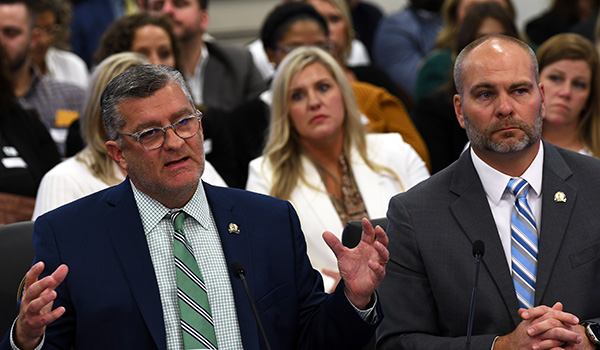
Sen. Robby Mills, R-Henderson, (left) testifies on anti-hazing legislation known as Lofton’s Law. With him is Rep. Jonathan Dixon, R-Corydon. A high-res version of the photo can be found here.
FRANKFORT – The Senate Judiciary Committee on Thursday approved a measure – known as Lofton’s Law – that would spell out criminal consequences for hazing.
Supporters of the bill say the current wanton endangerment charge in Kentucky doesn’t adequately cover all acts of hazing, and it merits separate criminal status.
Under Senate Bill 9, a person’s guilty of hazing in the first degree when he or she intentionally or wantonly engages in the act of hazing that results in the serious physical injury or death of a student,” the bill’s primary sponsor, Sen. Robby Mills, R-Henderson, said.
Under the proposed legislation, first-degree hazing will be a Class D felony. Second-degree – when people recklessly engage in the act of hazing – will be a Class A misdemeanor, Mills said.
Family members of Lofton Hazelwood attended the meeting in the Capitol Annex. Lofton passed away in 2021 after consuming alcohol at a University of Kentucky fraternity house, his mother, Tracey Hazelwood testified.
Hazelwood said her son was initially excited about joining the fraternity, but everything changed as pledges were asked to participate in questionable activities.
On the night Lofton died, the fraternity brothers were supposed to go serenading, a common Greek activity. However, his mother said pledges were told it was a tradition to drink strong alcohol.
“My son’s blood alcohol was 0.354. He drank so much that he couldn’t walk, and they took him up to a bedroom upstairs and left him by himself. And they all left to go serenading,” she said.
Hazelwood said it was nearly an hour later when a young man came into the house and found her son had passed away.
“Senate Bill 9 will send a message that Kentucky values students’ safety. And Senate Bill 9 will hold people accountable, especially those responsible for serious bodily harm or death, as in Lofton’s case,” she said.
Mills said current Kentucky law leaves enforcement to universities and colleges with the maximum penalty of expulsion. SB 9 seeks to add Kentucky to a list of 13 other states that boost hazing to criminal status.
“We believe that the elevation of hazing to a crime addresses head-on the seriousness of these actions,” he said. “It lets students know that Kentucky values students’ safety. And any violations of their safety will be addressed.”
Sen. Johnnie Turner, R-Harlan, said the legislation will spell out consequences for hazing.
“So it’s very clear here the prosecutor will have no choice. If somebody’s injured, they’re going to get charged with that offense,” he said.
Sen. Matthew Deneen, R-Elizabethtown, said that as a former educator, he believes the legislation is extremely important.
“We’re entrusted with the most valuable assets that we have in Kentucky,” he said. “As educators, parents give us their children for most of the day, and as they go to university for a period of four years and sometimes longer. It is our responsibility to do what we can to instill that trust and awareness, the value that they are putting in our hands as educators, he said.
Sen. Karen Berg, D-Louisville, said she supports the legislation and the courage of Lofton’s parents.
“Hazing is a problem. It is a big problem,” she said. “My child, in his fraternity, actually accepted the job of being the one to go and learn from national (headquarters) exactly what the rules were and to make sure that they were applied to the best of his ability at his fraternity.”
House Committee revisits last year's unemployment system overhaul
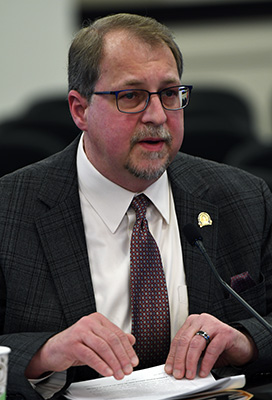
Rep. Russell Webber, R-Shepherdsville, presents House Bill 146, which makes updates to last year’s unemployment system overhaul bill. A high-res version of the photo can be found here
FRANKFORT — The House Economic Development and Workforce Investment Committee advanced legislation Thursday morning to make some updates to the state’s unemployment system.
In 2022, the Kentucky General Assembly approved House Bill 4, which changed the length of unemployment insurance benefits and the job search requirements for recipients. The length of benefits is now based on the state’s average unemployment rate, and recipients are required to engage in at least five verifiable work search activities a week.
House Bill 146 makes some technical updates to last year’s HB 4, according to the bill’s sponsor Rep. Russell Webber, R-Shepherdsville. The most notable change is claimants would receive 16 weeks of benefits instead of 12 weeks when the unemployment rate is at 4.5%, beginning July 1.
“(HB 146) really does not change the overall intent of House Bill 4, which was to promote rapid reemployment and maintain or build the trust fund sustainability that we’ve had an issue with over the last number years,” Webber said.
Webber said the updates proposed in HB 146 come at the request of the U.S. Department of Labor. It is common practice for the state to communicate with the federal government on this type of legislation to ensure it aligns with federal law, he said.
HB 4 originally gave an additional four weeks of benefits to individuals with a specified return to work date. Webber said the U.S. Department of Labor told the state it cannot do that based on a court decision from 1964.
In 2022, several lawmakers criticized HB 4 for the work search requirements and how Eastern Kentucky residents may be disproportionally impacted by that provision of the bill.
On Thursday, Rep. Al Gentry, D-Louisville, and Rep. Ashley Tackett Laferty, D-Martin, asked Webber if there had been any issues with the work search requirement since HB 4 went into effect on Jan. 1.
Webber said while it is mostly too early to tell the exact impact, there had been some applicants who were struggling to meet that requirement.
Another provision in HB 146 would require the Office of Unemployment Insurance to educate claimants on resources to further their education. That includes participation in an approved job training and certification program that would make them eligible for five extra weeks of benefits, Webber said.
Additionally, Webber said he hopes the changes encourage Kentuckians seeking work to explore new employment opportunities they may not have originally considered in a field they have never worked in before.
Tackett Laferty still expressed concerns for Eastern Kentucky residents who may not have as many jobs available to apply for and may face a lack of internet access.
“I just worry when those opportunities are not there through no fault of their own,” she said.
Webber said he has asked for the Office of Unemployment Insurance to keep track of issues applicants are having and that he has met with other lawmakers about the job situation in Eastern Kentucky.
“I’m interested in making everyone, every region in the Commonwealth of Kentucky successful,” Webber said.
The House Economic Development and Workforce Investment Committee approved HB 146 unanimously. It will now go before the full House for consideration.
Lawmakers seek oversight of relief funds
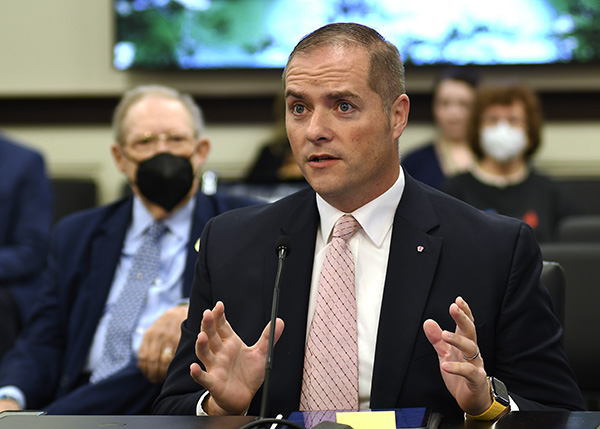
Sen. Whitney Westerfield, R-Fruit Hill, is pictured in a file photo. On Wednesday, he spoke on behalf of Senate Bill 99, which supporters say would increase accountability of two Team Kentucky relief funds. A high-res version of the photo can be found here.
FRANKFORT — The Senate Appropriations and Revenue Committee approved a measure Wednesday that supporters say would shore up oversight of two Team Kentucky relief funds for victims of flooding and tornadoes.
Committee members advanced Senate Bill 99 with an 8-0 vote, and it now heads to the full Senate for consideration.
The bill’s primary sponsor, Sen. Whitney Westerfield, R-Fruit Hill, cited news reports that some people have received checks from the funds erroneously, including one individual in his district.
“He had never sustained or applied for any damage, and didn’t get a very helpful response from the Public Protection Cabinet,” Westerfield said. “But regardless of that, I think it’s fair for us to just ask questions about where the money has gone, how they made decisions about how to distribute money.”
The state executive branch established both Team Kentucky relief funds under the Public Protection Cabinet. One was in response to the 2021 tornados in Western Kentucky. The other followed the flooding in Eastern Kentucky in 2022.
Those funds are different from two other relief funds that the General Assembly created after each disaster.
Westerfield said the Team Kentucky funds operate outside provisions in the state Constitution, which he said gives lawmakers authority to appropriate money in state hands.
SB 99 calls on the Public Protection Cabinet to provide an analysis of the relief funds to lawmakers by June 30. The report must include a list of expenditures and recipients along with the purpose of the assistance. It must also provide information on any guidelines used to allocate the assistance.
Sen. Donald Douglas, R-Nicholasville, asked when the legislation would become effective.
Westerfield said an emergency clause would allow the bill to take effect immediately if it becomes law.
Sen. Christian McDaniel, R-Ryland Heights, who is chair of the committee, said the executive branch’s intention with the fund is clear, but there needs to be more accountability.
“They don’t really know where the money is right now, and they don’t know how it’s been disbursed,” he said. “I think this is the General Assembly extending a little bit of grace to them to try to clean up their accounting.”
Senate President Pro Tempore David P. Givens, R-Greensburg, said legislators agree on helping others after disasters. However, he raised concerns the Team Kentucky funds could create a precedent for other, more controversial funds in the future.
“I like what you are doing by probing this question, and I think that’s why appropriation actions belong in the hands of the General Assembly,” he told Westerfield.
No one spoke in opposition to the bill.
First House bill related to juvenile justice reform advances from committee
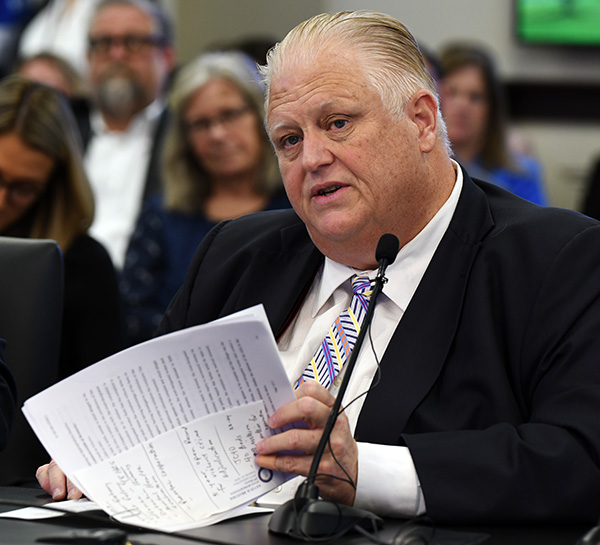
Rep. Kevin Bratcher, R-Louisville, presents House Bill 3, a bill geared toward juvenile justice reform. A high-res version of the photo can be found here.
FRANKFORT— Kentucky’s juvenile justice system is likely to undergo some major changes before the end of the 2023 legislative session.
House Bill 3 is one of several juvenile justice reform-related bills that will be considered this year, according to the bill’s sponsor Rep. Kevin D. Bratcher, R-Louisville.
Under HB 3, children taken into custody for a violent felony offense will be detained a maximum of 48 hours before receiving a detention hearing and an evaluation on mental health and substance use disorders, Bratcher said.
“I believe those two things are very important for our most troubled children to try to get their lives turned around,” Bratcher added.
Additionally, HB 3 seeks to:
-- hold uncooperative parents accountable when it comes to their child’s school attendance or participation in a diversion program;
-- open records for five years for children convicted of a violent felony offense; and
-- allocate $9 million to the state Department of Juvenile justice for reopening the Jefferson County Youth Detention Center with 40 beds.
Rep. Keturah Herron, D-Louisville, shared several concerns she has with the bill, including a section addressing juvenile record confidentiality.
Josh Crawford, a Louisville resident and director of criminal justice initiatives for the Georgia Center for Opportunity, said that portion of the bill only applies to children convicted of serious felony offenses and the information would be relevant when it comes to employment opportunities and firearm purchases.
Bratcher said he would be willing to work with lawmakers who have concerns about that section of the bill to narrow the scope of what would be made public record.
Herron, who has worked in the juvenile justice system, said the legislature should be cautious.
“We are doing a lot on the adult (justice) side as it relates to reentry and second chances, and so we need to make sure we’re doing the same thing for juveniles,” Herron added.
Rep. Kimberly Poore Moser, R-Taylor Mill, said she is also in favor of a restorative justice approach for children in the juvenile justice system. She said she plans to file a floor amendment to HB 3 to allow children to receive treatment while incarcerated.
Following testimony from concerned community members, Rep. Jason Nemes, R-Louisville, said he agrees with a lot of what was said, but he believes HB 3 will protect children and Kentucky’s communities, especially in Louisville.
“We want them to be safe, successful, good citizens, good mothers and fathers and brothers and sisters for the rest of their life,” Nemes said. “That’s what we’re trying to do.”
The House Judiciary Committee approved HB 3 by a 15-1 vote with two pass votes. It will now go before the full House for consideration.
House Education Committee advances bill to expand uses for KEES money
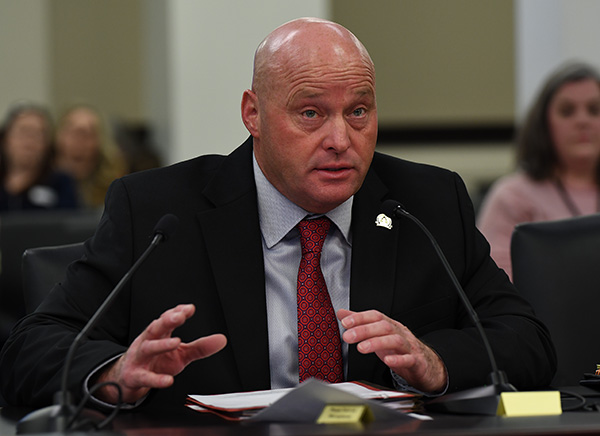
Rep. Steve Bratcher, R-Elizabethtown, presents House Bill 133, which would allow students to use KEES money for workforce solutions training programs. A high-res version of the photo can be found here.
FRANKFORT — Students seeking to use the Kentucky Educational Excellence Scholarship (KEES) for workforce training programs may get to under House Bill 133.
The House Education Committee unanimously approved the legislation Tuesday morning.
According to bill sponsor Rep. Steve Bratcher, R-Elizabethtown, the legislation would allow students to seek education opportunities outside of the typical college route that KEES money currently funds.
“It’d be for things like (commercial driver’s) licensing, computer coding, Kentucky medication aide, pharmacy tech, phlebotomy nursing aid, things like that,” Bratcher said. “Items and careers we need in the Commonwealth.”
HB 133 defines an approved workforce solutions training program as a local, high-demand work sector training program offered by the Kentucky Community and Technical College System (KCTCS).
Jessie Schook, associate vice president of workforce and economic development for the KCTCS, testified alongside Bratcher. She said the workforce solutions training programs are there to address immediate labor market needs in Kentucky.
“In some instances, the programs are offered for credit and do translate directly into a further education pathway such as an associate degree in science or art,” Schook said.
Committee Chair Rep. James Tipton, R-Taylorsville, asked Bratcher if the bill would have a negative impact on the Kentucky Lottery funds from which KEES money is derived.
Erin Klarer, vice president for government
relations and communications for the Kentucky
Higher Education Assistance Authority (KHEAA),
said the utilization of the KEES dollars will be
done through a reimbursement process.
“A student will submit receipts to use, and we
will reimburse up to the earned KEES amount,”
Klarer said.
Right now, KHEAA estimates that the maximum utilization in one year will increase KEES expenditures by $100,000, Klarer added.
Overall, the answer to Tipton’s question was no, HB 133 will not have a negative impact.
If the bill becomes law, it would take effect for the academic year beginning July 1, 2023.
HB 133 will now go before the full House for consideration.
This Week at the State Capitol

Bills are filed in the House for 2023 Regular Session. A high-res version of the photo can be found here.
FRANKFORT — The second part of the 2023 Regular Session was well underway this week as lawmakers moved bills to reduce income taxes, address sensitive topics in public schools and ban TikTok on state government devices.
In a rare move, the House also voted Thursday to impeach Commonwealth's Attorney Ronnie Goldy Jr., who serves the 21st Judicial District in Eastern Kentucky. It marked only the fifth time in state history that lawmakers have adopted articles of impeachment against a public official.
The General Assembly is meeting in a short, 30-day session this year as opposed to the longer, 60-day sessions that occur in even-numbered years. Short sessions are divided into two parts, and the second part commenced Tuesday on a bipartisan note.
That’s when state leaders from all three branches of government – and both political parties – gathered in the Capitol Rotunda for the annual Black History Celebration, hosted by the Kentucky Black Legislative Caucus.
However, as the week continued, lawmakers remained divided on two of the biggest bills moving through the General Assembly this year.
House Bill 1 drove heated debate on the Senate floor Wednesday. The legislation would reduce state income taxes from 4.5% to 4% at the start of 2024. It would also codify a reduction from 5% to 4.5% that took effect earlier this year.
The bill is part of a broad, multi-year effort to gradually reduce and eliminate income taxes while also expanding the overall tax base. Supporters say it will provide Kentuckians with needed financial relief and create a stronger environment for economic growth. But critics say the changes will harm state coffers and shift the state’s tax needs to people in lower income brackets.
HB 1 cleared the Senate floor on a 30-5 vote and is now awaiting a decision from the governor.
The second measure galvanizing debate this week was Senate Bill 150, which advanced out of the Senate Education Committee on Thursday.
Supporters say the bill seeks to ensure parental communication and input on school policies and curriculum related to sensitive topics, including human sexuality, health services and the use of pronouns. Opponents have raised concerns, however, that the measure could harm student safety and mental health, especially when parents or teachers don’t affirm a student’s identity.
The legislation passed out of committee with an 11-1 vote and now heads to the full Senate for consideration.
Lawmakers moved a few additional bills during the four-day week, including measures on state scholarships and TikTok.
Senate Bill 24 would offer homeschooled students more access to the Kentucky Educational Excellence Scholarship (KEES) based on test scores that correlate to grade point averages. It cleared the Senate Education Committee on Thursday and now moves to the full Senate.
Senate Bill 20 would ban use of the social media app TikTok on state government networks and devices. The measure moved off the Senate floor on Friday after lawmakers said the app – owned by the Chinese company ByteDance – is a threat to the state’s data security. It now heads to the House.
The General Assembly is scheduled to gavel in on
Tuesday for the ninth day of the session.
Lawmakers have until Feb. 21 to introduce new
bills in the Senate and until Feb. 22 to
introduce new bills in the House. More than 300
bill have been filed in the session so far.
Kentuckians can track the action through the Legislative Recordwebpage, which allows users to follow a bill’s progression through the chambers.
Citizens can also share their views on issues with lawmakers by calling the General Assembly’s toll-free message line at 1-800-372-7181.
Article headline
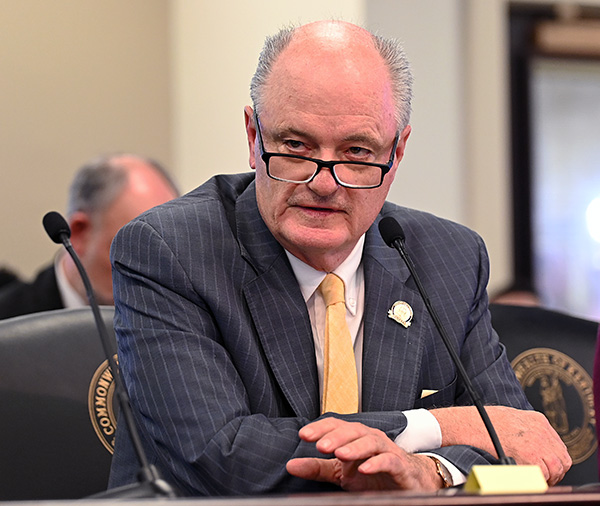
Sen. John Schickel, R-Union, speaks on Senate Bill 24, which would expand access to Kentucky Educational Excellence Scholarship money for homeschooled students. A high-res version of the photo can be found here.
FRANKFORT — Members of the Senate Education Committee on Thursday advanced a bill that would offer parents of homeschooled students more access to Kentucky Educational Excellence Scholarship money if the student scores high enough on a test.
The KEES program provides scholarships to students who earn at least a 2.5 GPA each year of attendance at a certified Kentucky high school. However, the bill’s sponsor, Sen. John Schickel, R-Union, said Senate Bill 24 would allow families with homeschools to access more scholarship money.
“We’re talking about parents who have taken it upon themselves the responsibility to educate their own children,” he said. “As testified during the interim (period) by university administration officers from Thomas More University, as a group, these are some of the most prepared students for college that we have in the commonwealth.”
Schickel said there are some exceptions, and not all of the students will qualify for KEES money. But many will, and the parents have given the state a break because they have taken the costs to educate their children on themselves, he said.
“So what this bill attempts to do is to give those parents some access to KEES money in the manner that traditional students have. Specifically, the transcript part of the KEES money, and it provides a testing mechanism,” he said.
Schickel said there was previously a dual credit proposal before the committee that would be based on dual credit scores from the university, but it changed to the current legislation.
“After some discussion with you on the committee, we decided it was better to go to a testing model,” he said. “So we have created a conversion chart where these students can test, and based on the score of that test, receive the transcript portion of the money, which a traditional student would receive.”
Schickel said it’s interesting to point out that in an age when people are asking to avoid being tested, the homeschooled students are volunteering to be tested.
Senate Minority Caucus Chair Reginald Thomas, D-Lexington, asked Schickel if the students are already receiving some KEES money.
“There are two pots,” Schickel said. “One pot is for the testing. They can currently get that money, but they cannot get the transcript part for the grade point average because they don’t have a traditional grade point.”
The bill received its first reading on the Senate floor Thursday afternoon.
Income tax legislation gains Senate approval
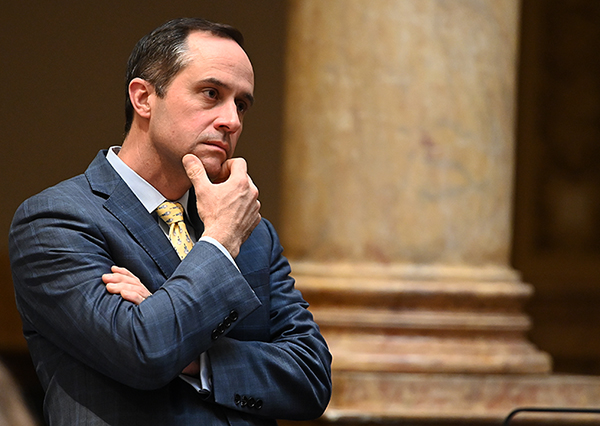
Sen. Christian McDaniel, R-Ryland Heights, speaks on behalf of House Bill 1, which would reduce income taxes from 4.5% to 4% beginning next year. A high-res version of the photo can be found here.
FRANKFORT — The Senate on Wednesday approved legislation to reduce the state’s income tax rate after supporters and opponents shared impassioned speeches on the chamber floor.
House Bill 1 calls for income taxes to be reduced from 4.5% to 4 % at the start of 2024. It’s part of a broader, ongoing effort to gradually eliminate income taxes while also expanding the overall tax base.
The bill’s primary sponsor, Rep. Brandon Reed, R-Hodgenville, was present in the chamber after the legislation passed with a 30-5 vote. But Sen. Christian McDaniel, R-Ryland Heights, presented the bill on the floor.
“When we did this, we really wanted to make certain that the approach we took was thoughtful and logical, provided opportunities for checks on the actions that would occur, and then also that we would be very realistic about the financial demands of the commonwealth as well as the importance of letting people keep more of their hard-earned money,” he said.
Last year, the General Assembly passed legislation that set the stage for a revamp of state taxes over several years.
That measure established “triggers” that will lower the state income tax rate by either a half or full percentage point once state revenues reach certain levels. Revenues met the first trigger in 2022, which reduced the state income tax from 5% to 4.5% on Jan. 1.
McDaniel said there are checks in place to ensure the tax reduction does not negatively impact the state financially.
One requirement is that the budget reserve trust fund must total more than 10% of the receipts for the following year. Another is the amount of the income tax reduction can’t be more than half of the amount of the state’s anticipated budgetary surplus.
During debate on the Senate floor, supporters argued that the changes will allow Kentuckians to keep more of their income and create a stronger environment for attracting jobs and growing the economy.
“I never thought I would be here listening to people argue about lowering taxes,” said one supporter, Sen. Michael J. Nemes, R-Shepherdsville. “Maybe I just hang around working people, but for all of my life, they’ve argued, ‘stop taking my money, stop raising my taxes, stop wasting my money.’”
Opponents, however, said the overhaul will harm state coffers and transfer more of the state’s tax liability to people in lower income brackets.
Senate Minority Caucus Chair Reginald Thomas, D-Lexington, said Kentucky’s citizens have many needs that are going to be unmet, including childhood poverty.
“Why we want to engage in this reverse Robin Hood mentality confounds me,” he said. “We want to take from the poor and give to the rich. It makes no sense at all.”
Senate Minority Whip David Yates, D-Louisville, said the tax cut is actually just a restructuring and that many Kentuckians will pay more money out of pocket at the end of the year.
“I keep hearing tax cuts, tax cuts. When I first came into the session we talked about the tax cuts,” he said. “I think since then my constituents, the working families, have realized that it hasn’t been a tax cut. It’s a tax restructuring.”
Sen. Robin L. Webb, D-Grayson, said tax policy is a serious matter, and she voted against the measure, arguing that it will benefit people with higher incomes.
“As we’ve shifted in the past to more consumables taxes, that hurts low-income people,” she said.
But Senate Majority Floor Leader Damon Thayer, R-Georgetown, disagreed, saying that the bill’s detractors were relying on old, worn out arguments.
“With this tax cut, another $650 million a year will stay in the checkbooks and the savings accounts of the people of the Commonwealth of Kentucky,” he said.
The bill now heads to the governor.
Senate committee advances measure to shore up TikTok ban on state devices
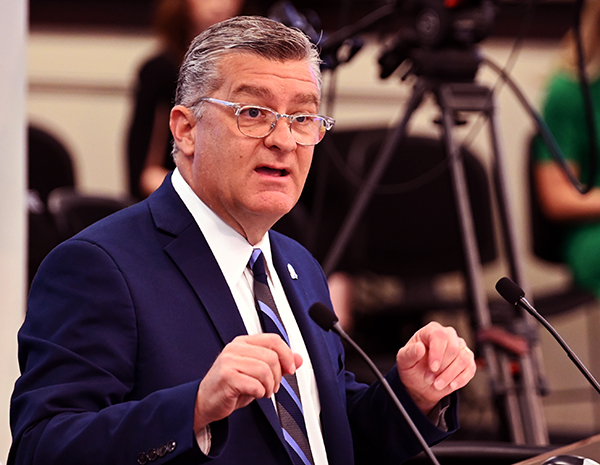
Sen. Robby Mills, R-Henderson, speaks about legislation that would prohibit the use of TikTok on state government devices. A high-res version of the photo can be found here.
FRANKFORT — Members of the Senate State and Local Government Committee on Wednesday approved legislation calling for the prohibition of the social media app TikTok on state government networks and devices.
TikTok is a social media network service owned by a Chinese company named ByteDance. Most Chinese companies are connected directly or are partially owned by the Chinese government, said the bill’s primary sponsor, Sen. Robby Mills, R-Henderson.
“Recently, the FBI has been quoted as saying the video sharing app poses a national security concern,” he said. “TikTok is part of a larger Chinese government effort to expand extraterritorial control over digital platforms worldwide.”
Mills told committee members the legislation, Senate Bill 20, is needed to protect data on state devices. He described TikTok as a “known data mining app,” and said the measure will ensure that existing bans – accomplished through policy – will not time out.
“This has been obviously in the news a lot, and I think there’s quite a bit of data that shows that it’s not safe to have this… on computers, laptops and things of that nature,” he said.
Mills said Apple Inc. and Google have been asked by the Federal Communications Commission to remove the TikTok app from their app stores because of its pattern of data harvesting.
“Nearly half of all the states in the United States have banned TikTok from government devices. Additionally, Congress has recently acted and banned the app as well from their devices,” Mills said.
The committee unanimously approved by the measure with a 9-0 vote. It now heads to the full Senate for consideration.
This Week at the State Capitol
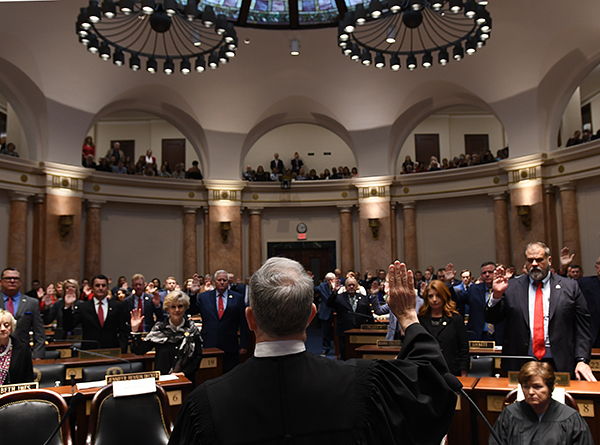
Lawmakers receive the oath of office on the House floor during the first day of the 2023 Regular Session. A high-res version of the photo can be found here.
FRANKFORT — The Kentucky General Assembly kicked off the 2023 Regular Session this week by welcoming dozens of new lawmakers into the ranks and moderating the tempo somewhat in a nod to the traditional “short” sessions of the past.
But even with the new members and measured pace, legislation on two key issues cleared important hurdles over the first four days.
On Thursday, the House advanced House Bill 1, which builds on a major overhaul to Kentucky’s tax structure that began last year. The bill would codify a drop in the state income tax rate from 5% to 4.5% for 2023 and further reduce the rate to 4% beginning next year.
Supporters say the overhaul will provide financial relief to Kentuckians by gradually eliminating state taxes on personal income while simultaneously expanding the state’s overall tax base. Critics, however, say it will undermine state revenues without offering much benefit to middle- and low-income families.
HB 1 now heads to the Senate for consideration.
On Friday, the Senate passed Senate Concurrent Resolution 31 to create an emergency work group that will examine the state’s troubled juvenile justice system.
The panel will review safety, staffing and management of the system to determine if reforms are needed and report their findings back the General Assembly.
Friday’s proceedings concluded Part I of the 2023 session, one in which new members make up nearly a quarter of the legislature. When the chambers gaveled in on Tuesday, a total of 31 new lawmakers received the oath of office – 25 in the House and six in the Senate.
Along with the fresh faces came changes to committees and even some to leadership, including the minority floor leaders in both chambers. Both chambers also decided to divide up their respective committees on health, welfare and family services into separate committees this year that could better focus on key issues.
The Senate also took time on Friday to say goodbye to Sen. Ralph Alvarado, R-Winchester, who has accepted an appointment as commissioner for the Tennessee Department of Health.
Amid all the changes, one of the most noticeable differences this week was an effort to return to the original intent of the short, 30-day legislative sessions.
Ever since an amendment to the state constitution in 2000, the General Assembly has met in short sessions during odd-numbered years. The proceedings were intended to bridge the gap between longer, 60-day sessions in even-numbered years.
Early on, lawmakers tended to avoid major legislation during short sessions, opting instead to focus on smaller issues and procedural matters. But short sessions have grown more complex over time.
House Speaker David W. Osborne, R-Prospect, told reporters on Tuesday that, after several years of aggressive agendas, he expects lawmakers will pump the breaks some this year.
“I think this is going to be a much more traditional short session,” he said.
Part II of the session is set to convene on Feb. 7. Lawmakers have until Feb. 21 to introduce new bills in the Senate and until Feb. 22 to introduce new bills in the House. The chambers are scheduled to adjourn sine die on March 30.
Kentuckians can track the action through the Legislative Record webpage, which allows users to follow a bill’s progression through the chambers.
Citizens can also share their views on issues with lawmakers by calling the General Assembly’s toll-free message line at 1-800-372-7181.
House takes step to lower state income tax rate
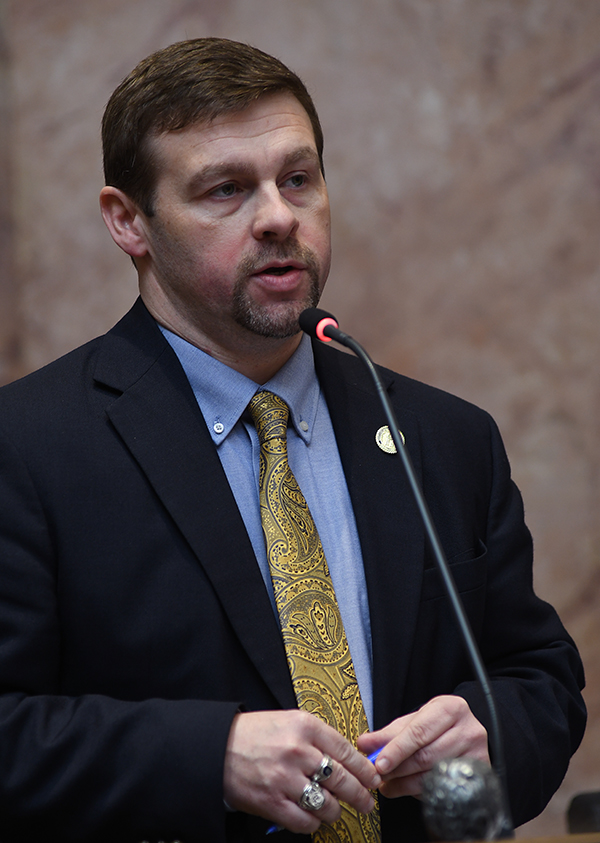
Rep. Brandon Reed, R-Hodgenvlle, speaks on the House floor on Thursday on House Bill 1. A high-res version of the photo can be found here.
FRANKFORT— The Kentucky House of Representatives made another step toward eventually eliminating the state income tax rate with the passage of House Bill 1 on Thursday.
The bill’s primary sponsor, Rep. Brandon Reed, R-Hodgenville, said HB 1 is essentially a continuation of House Bill 8 from the 2022 legislative session, which set that stage for a major overhaul of Kentucky’s tax structure.
Reed said HB 1 will codify the state income tax rate reduction to 4.5% from 5% for 2023 and further reduce the state income tax rate to 4% beginning Jan. 1, 2024.
Last year’s HB 8 established “triggers” that will lower the state income tax rate by either a half or full percentage point once state revenues reach certain levels. Revenues met the first trigger in 2022, which automatically reduced the state income tax from 5% to 4.5% on Jan. 1. Further income tax rate reductions require legislative approval.
Reed said HB 1 puts the General Assembly, “another step closer to putting more money back into the pockets of hard working Kentuckians.”
“With HB 1, we are sending a statement to the hardworking Kentuckians that Frankfort has budgeted to our needs, not our wants; made investments, paid down debt, and we have saved,” Reed said. “We are reducing their tax burden, so they can further invest, pay down debt and save for their families.”
The House debated HB 1 for nearly an hour and a half Thursday with Minority Floor Leader Derrick Graham, D-Frankfort, being one of the members to speak against the bill. Graham said the state’s current surplus is the result of one-time federal COVID-19 relief funds. He expressed concerns that the state and its budget will struggle in the future under the new tax plan.
“What we’re seeing is that we’re thinking about now and not about tomorrow,” Graham said. “And if we continue down this path, when all of the federal dollars are gone, the Commonwealth of Kentucky is going to have a difficult time trying to fund pre-K and higher education, our state government, our state employees (and) our retirees.”
Rep. Josie Raymond, D-Louisville, agreed and stated that the tax cut benefits the wealthy the most and hardly makes an impact on middle- and low- income Kentuckians, especially after HB 8 in 2022 raised taxes on certain services.
“Middle-income families like mine will get an income tax reduction of about 300 bucks,” she said. “Three hundred bucks is a wash for the bank accounts of middle income and working class families who are now paying more for Christmas photos and little league than they’re getting back under this bill.”
Majority Whip Jason Nemes, R-Louisville, was among the House members to vote “yes” on HB 1. He said with passage of the measure, it was “a great day” and a “banner” day for Kentucky.
“This bill is about tomorrow because it will hopefully provide the jolt to our state that we need,” Nemes said. “States with a 0% income tax have grown 56% faster since 2000.”
Speaker Pro Tempore David Meade, R-Stanford, agreed that HB 1 is the right move for Kentucky. He said since the first reduction bill in 2018, which lowered the state income tax rate from 6% to 5%, Kentucky has seen “significant revenue gains.”
“Now it’s time for taxpayers to reap the benefits,” Meade added.
The House approved HB 1 by a 79-19 vote. It will now go before the Senate for consideration.
Article headline
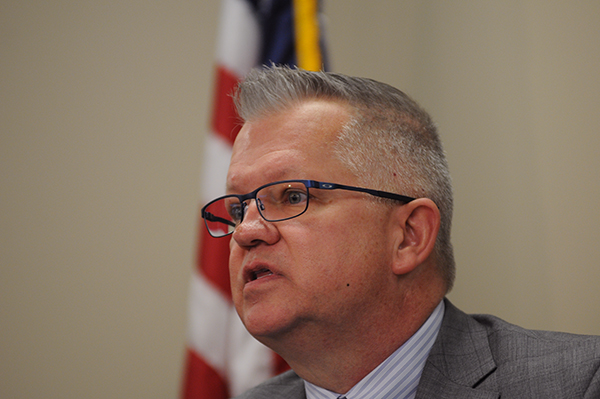
Sen. Danny Carroll, R-Benton, speaks duringthe first meeting of the Senate Committee on Families and Children. A high-res version of the photo can be found here.
FRANKFORT — The new Senate Standing Committee on Families and Children held its first meeting Wednesday, discussing plans to take aim at important and complicated issues in Kentucky.
Sen. Danny Carroll, R-Benton, chairs the committee. He said its jurisdiction includes family and children’s issues, child welfare, adoptions, protective services, caregiver support, family preservation programs, senior citizen programs, sexual assault programs and much more.
Carroll said he looks forward to pinpointing important issues. One of the biggest priorities will be child abuse and neglect, he said, noting that Kentucky ranks among some of the worst states in the nation in those areas.
“That’s completely unacceptable, and I’m hopeful that within this committee we can focus on specific issues and really make an impact,” Carroll said.
Lawmakers established the new group on Tuesday – the first day of the 2023 legislative session. In previous years, the issues of health, welfare and family services all fell under the jurisdiction of one committee. However, the Senate decided to divide the issues up between two committees this year, and the House has taken a similar approach.
On Wednesday, the Senate committee heard testimony from Eric Friedlander, secretary of the Kentucky Cabinet for Health and Family Services. Friedlander praised the General Assembly for the change and said some issues were often overshadowed under the old structure such as the mission of the state Department for Community Based Services (DCBS).
“Medicaid hospital providers, nursing facilities – that’s where a lot of the attention goes and not enough attention then goes to the DCBS side, the child protective service side, the adult protective service side, which hardly anybody ever talks about and is critically important,” he said.
Sen. Robin L. Webb, D-Grayson, said she looks forward to collaboration with Friedlander and others.
“As a practitioner, I’m glad to see this change, and I have had a lot of thoughts over the years of the way things could be done better,” she said. “And I am on the ground in the trenches working with your field people and the challenges that they face too.”
Carroll said he supports working with CHFS officials as well.
“I think we’re on the same page in a lot of areas,” he said. “What we deal with are not political issues. These are dealing with our families and with our kids, and I think it’s crucial that the legislative and the executive branch work together.”
Other committee members include Senate Majority Caucus Chair Julie Raque Adams, R-Louisville, vice chair; and members, Sen. Rick Girdler, R-Somerset; Sen. Ralph Alvarado, R-Winchester; Sen. Stephen Meredith, R-Leichfield; Sen. Denise Harper Angel, D-Louisville; Sen. Amanda Mays Bledsoe, R-Lexington; Sen. Lindsey Tichenor, R-Smithfield; Sen. Whitney Westerfield, R-Crofton; and Sen. Max Wise, R-Campbellsville.
Stay connected to the General Assembly during the 2023 legislative session
FRANKFORT — The Kentucky General Assembly will kick off the 2023 legislative session on Jan. 3, and Kentuckians have many ways to follow along with the action.
-- Kentuckians can use online resources to:
-- See the General Assembly’s daily schedule
-- Tune in to live coverage of legislative
meetings
-- Find information on their legislators
-- Contact lawmakers and offer feedback
-- Read bills and resolutions
-- Receive a notice when a bill advances
-- See how lawmakers voted on bills and
resolutions
-- View materials on committee topics and
testimony
-- Learn about the legislative process
All that and much more is available on the General Assembly Home Page: https://legislature.ky.gov/pages/index.aspx.
Following the General Assembly’s work often begins with a daily look at the Legislative Calendar: https://apps.legislature.ky.gov/LegislativeCalendar. The calendar shows which committees are meeting and when the Senate and House will convene.
Livestreams of legislative action can be viewed through feeds provided by Kentucky Educational Television (KET) and the Legislative Research Commission (LRC).
KET livestreams all chamber proceedings, while committee meeting coverage is provided by both KET and LRC. For links to the livestreams, go to https://legislature.ky.gov/Public%20Services/PIO/Pages/Live-Streams.aspx.
You can find each lawmakers’ contact info, biographical info, committee assignments and sponsored legislation by clicking on the “Legislators” tab near the top of the General Assembly Home Page: https://legislature.ky.gov/Pages/index.aspx. You can also look up who represents your district.
The online Legislative Record ( https://legislature.ky.gov/Legislation/Pages/default.aspx) has information on every piece of legislation introduced in the Senate and House. You can read summaries, the full text of bills, resolutions, amendments and see exactly how far each piece of legislation has advanced in the process. Bills can be looked up according to bill number, sponsor or topic. If a bill has been voted on in a chamber, you can see how each lawmaker voted by clicking “Vote History” on a bill’s summary page.
Bill Watch, a bill tracking service provided through a partnership of Kentucky.gov and LRC, sends users email notifications each time the bills they are interested in take a step forward. To sign up for Bill Watch, go to https://kentucky.gov/services/pages/billwatch.aspx.
Information about legislative committees is available at https://legislature.ky.gov/Committees/Pages/default.aspx. To view materials such as info sheets, handouts and PowerPoint presentations that are compiled for lawmakers to review at committee meetings, click on the “Meeting Materials” tab on the left side of each committee’s page.
To share feedback on an issue with lawmakers, call the General Assembly’s Message Line at 1-800-372-7181. Kentuckians with hearing loss can use Kentucky Relay by dialing 7-1-1.
A Spanish language line for legislative information will be available throughout the General Assembly’s 2023 session by calling 1-866-840-6574.
To directly reach a lawmaker’s office, call 502-564-8100. An operator will transfer the call to the office of the lawmaker you want to reach.
If you have a question about the lawmaking process or legislative resources, the LRC Public Information can be reached by calling 502-564-8100 ext. 59105.